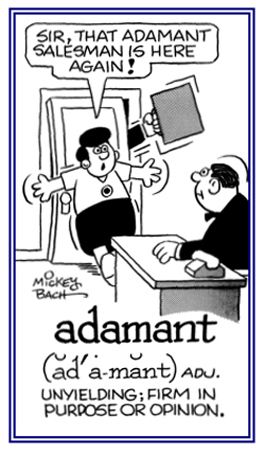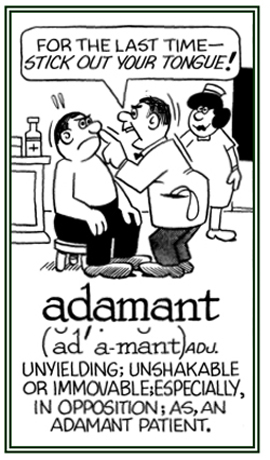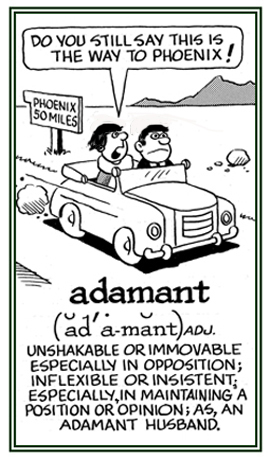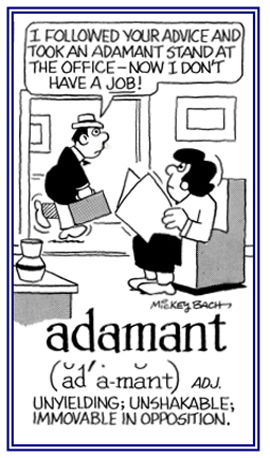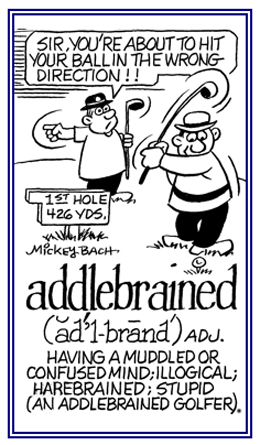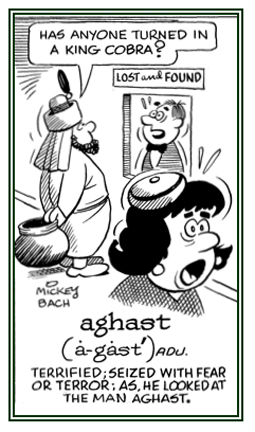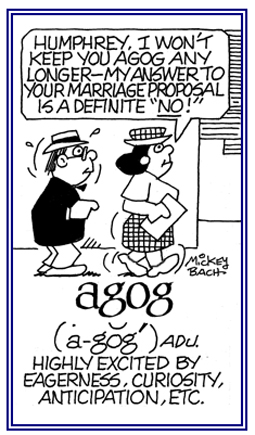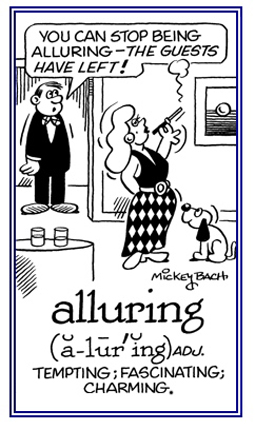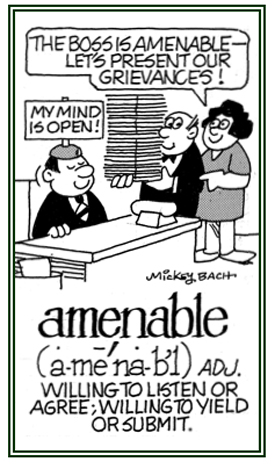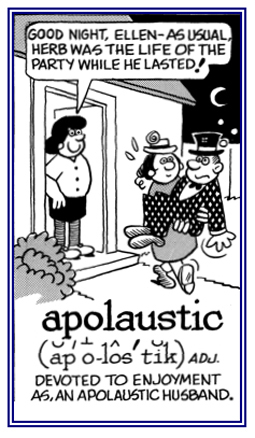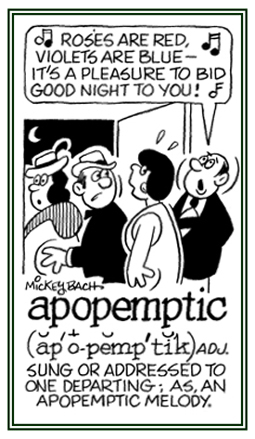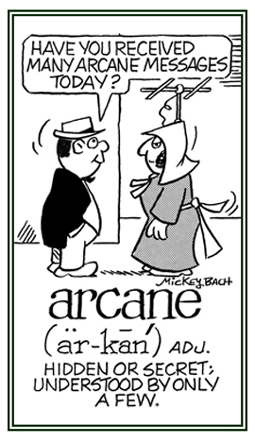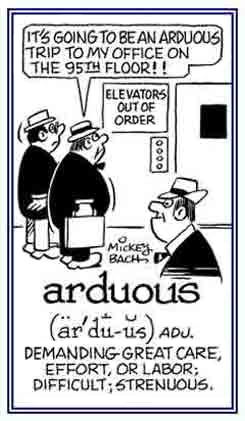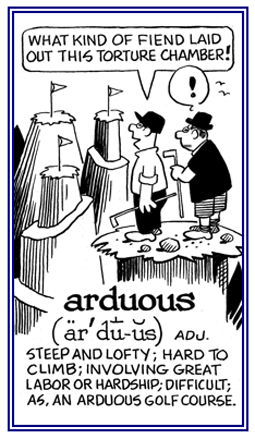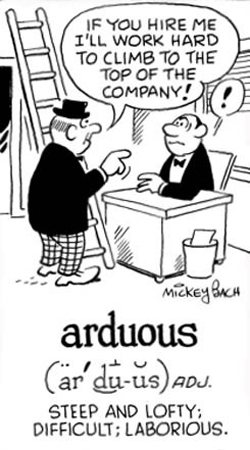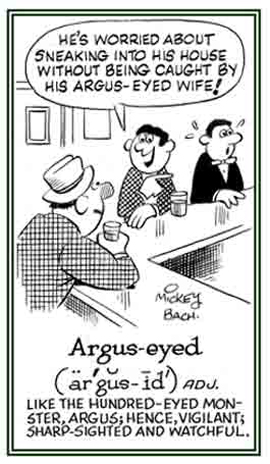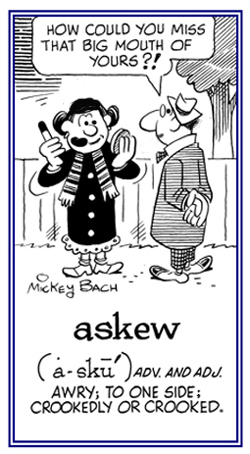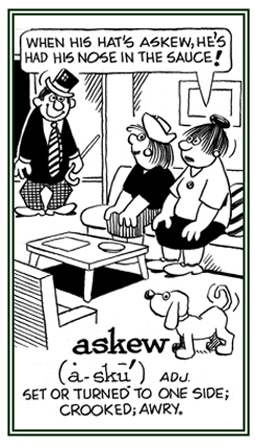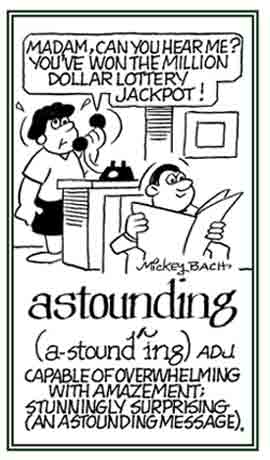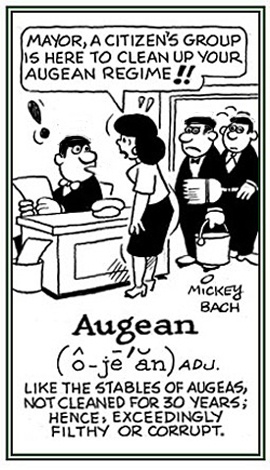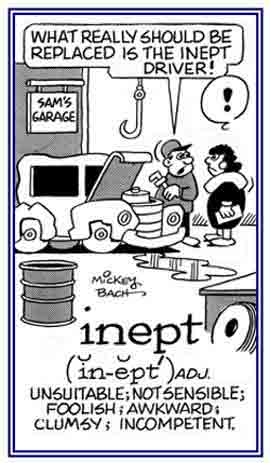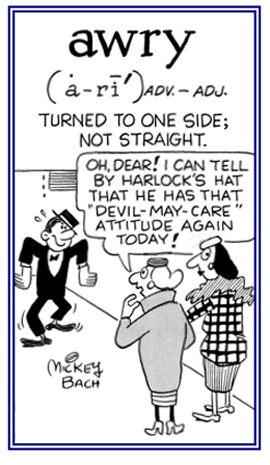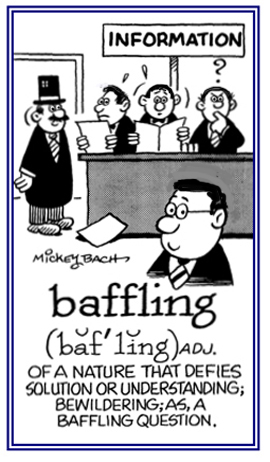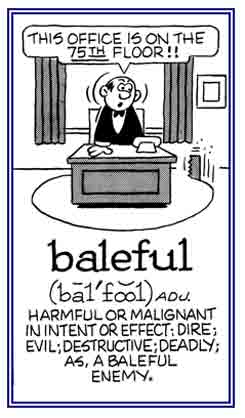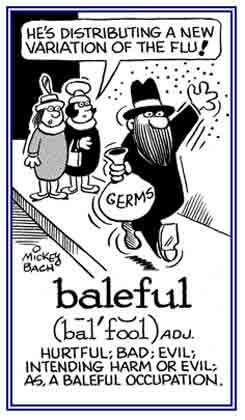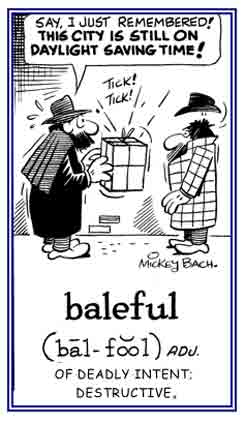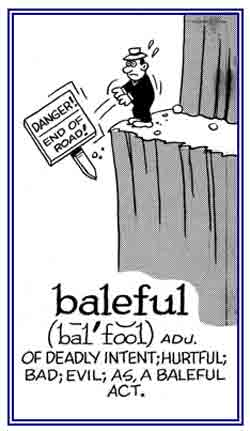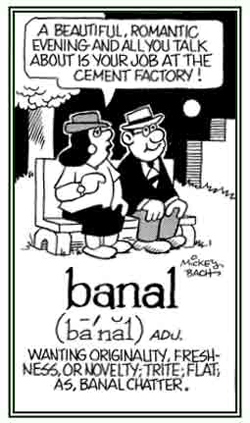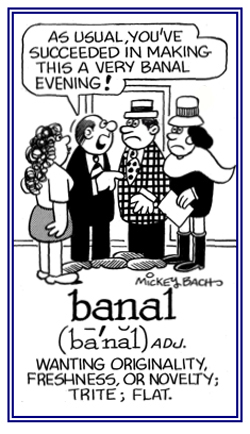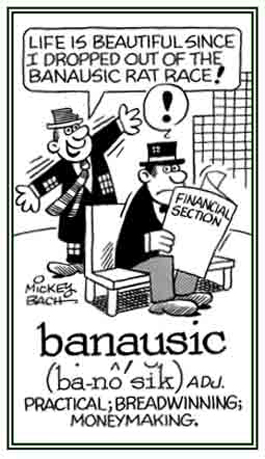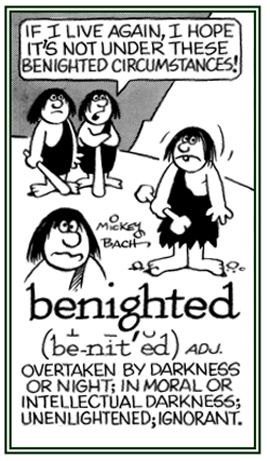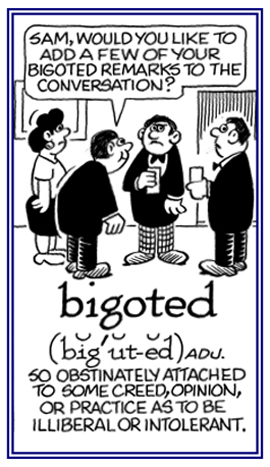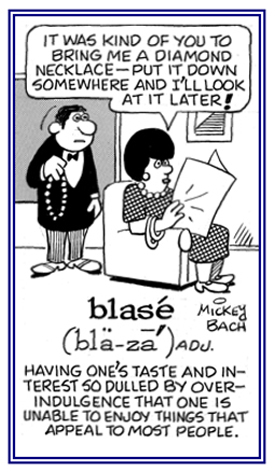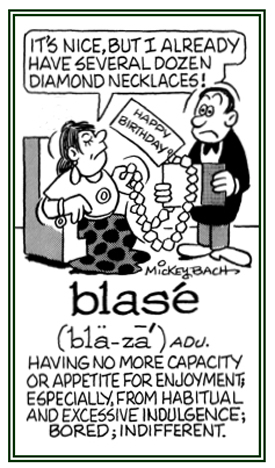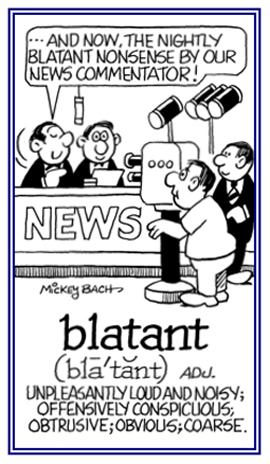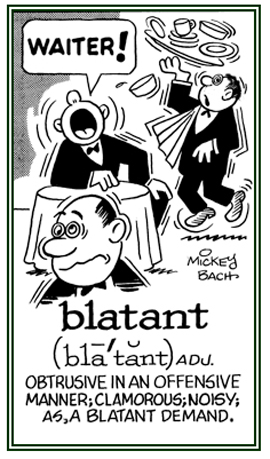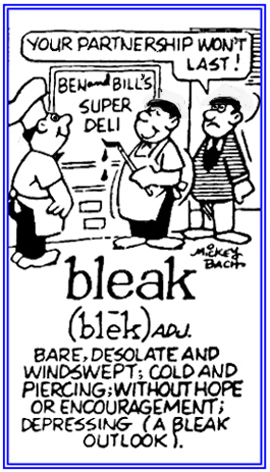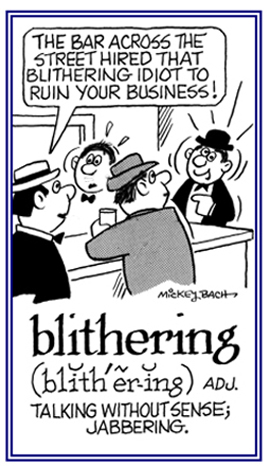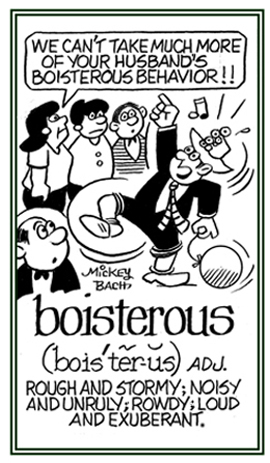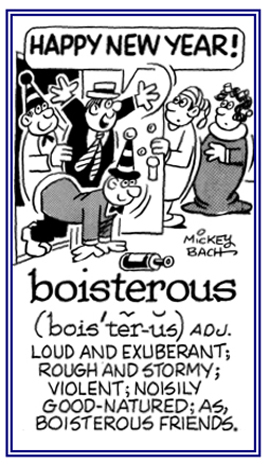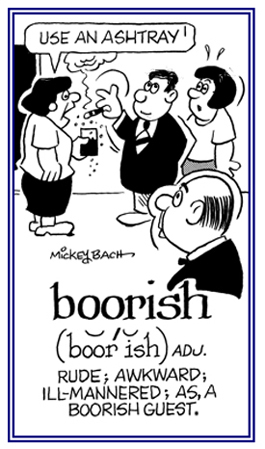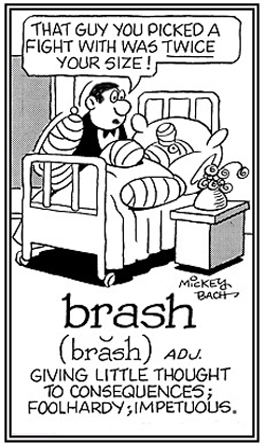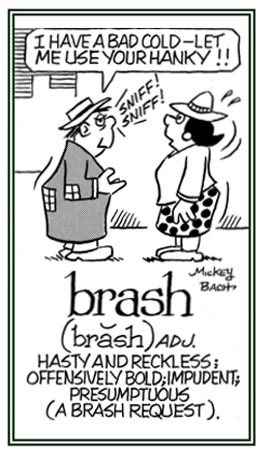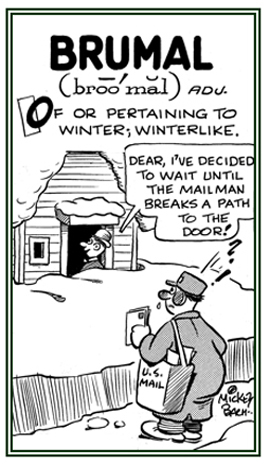brazen
(BRAY zuhn) (adjective), more brazen, most brazen
1. Referring to an action which has been performed in a very open and shocking way without shame or embarrassment: A lawyer was shot and killed Monday in a
brazen daylight assassination in central Moscow, according to officials.
2. Relating to harsh sounding; such as, if someone were hitting something made of brass: A person who is
brazen is described as being overly loud, harsh, and offensive.
3. Descriptive of something made of brass, or resembling it; especially, in color or hardness: A
brazen statue of a soldier was seen in the city square.
Lenora was considered a brazen hussy because she had a brazen voice and hung around with a tough gang who all wore wide belts with brazen buckles.
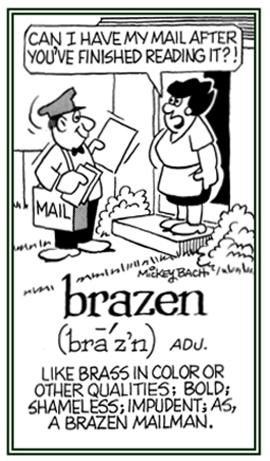 © ALL rights are reserved.
© ALL rights are reserved.
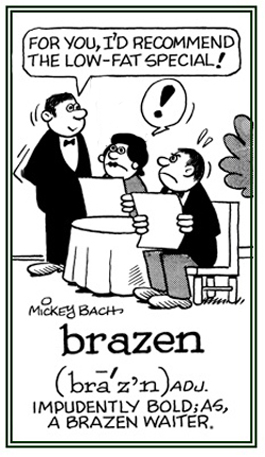 © ALL rights are reserved.
© ALL rights are reserved.
Go to this Word A Day Revisited Index
so you can see more of Mickey Bach's cartoons.
bristly
(BRIS lee) (adjective), more bristly, most bristly
1. Covered with stiff hair or hairlike structures: Although pigs look as if they are hairless, they are actually bristly animals.
2. Thick with prickly or thorny leaves; such as, hairy-like leaves: Some bristly plants can cause irritation to the skins of people who have direct contact with them.
3. Showing or tending to show agitation, indignation, or anger: During the court trial, there was a bristly exchange of words between the lawyers.
brusque
(adjective), more brusque, most brusque
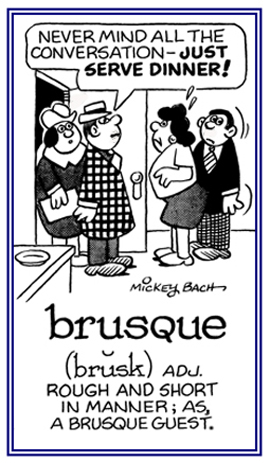 © ALL rights are reserved.
© ALL rights are reserved.
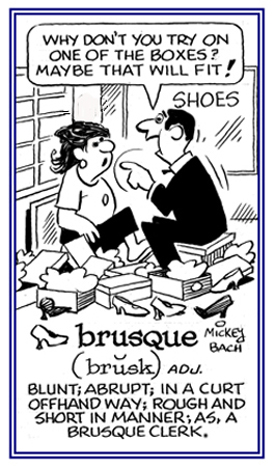 © ALL rights are reserved.
© ALL rights are reserved.
Go to this Word A Day Revisited Index
so you can see more of Mickey Bach's cartoons.
budgeted
(adjective), more budgeted, most budgeted
A reference to that which has been determined for an income and amount of spending: The financial department of the company suggested a budgeted amount that can be spent for next year's expenses.
bumptious
(adjective), more bumptious, most bumptious
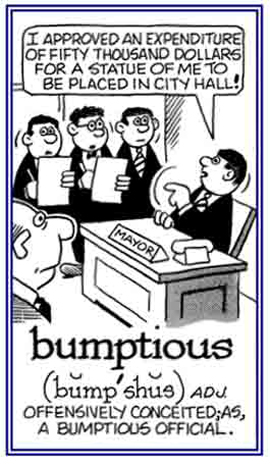 © ALL rights are reserved.
© ALL rights are reserved.
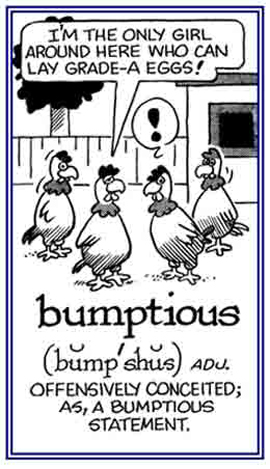 © ALL rights are reserved.
© ALL rights are reserved.
Go to this Word A Day Revisited Index
so you can see more of Mickey Bach's cartoons.
buoyant
(BOI uhnt, BOO yuhnt) (adjective), more buoyant, most buoyant
1. A reference to being able to float: Cork is a very
buoyant material, which cannot sink to the bottom of a container of water.
2. Pertaining to something that can cause things to drift in the air: Warm air is more a
buoyant factor than cool or cold air.
3. Descriptive of being happy and confident: The two basketball teams were in a
buoyant mood as they were about to play their game.
4. Relating to remaining at a regular or high level: The investors are convinced that there will be a
buoyant economy in the near future.
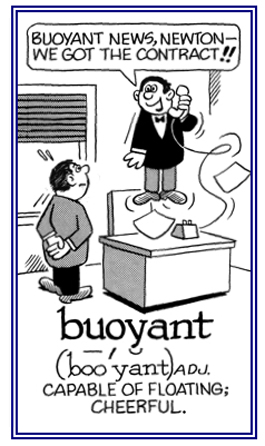 © ALL rights are reserved.
© ALL rights are reserved.
Go to this Word A Day Revisited Index
so you can see more of Mickey Bach's cartoons.
Pertaining to being happy, cheerful, and confident; as if, floating in the air. (1)
burgeoning
(adjective), more burgeoning, most burgeoning
A description of something that is developing, growing, and flourishing quickly: With all of the rain that has been falling and the heat, the weeds and grass have become a
burgeoning problem in yards and along the sides of roads.
The nation's burgeoning number of people without jobs has been increasing and causing serious financial problems.
A reference to harsh, loud, and unpleasant sounds. (1)
cadaverous
(kuh DAV uhr uhs) (adjective), more cadaverous, mostcadaverous
Descriptive of something or someone who is pale, emaciated, gaunt, or looking deathlike: Erwin's long illness gave him a cadaverous appearance; however, he is beginning to recover and getting his normal skin color again.
Relating to someone who is pale like a corpse, or a dead body, and very thin and ghastly. (1)
Related to distress and misery; that which is deplorable or very miserable. (1)
calculating
(adjective), more calculating, most calculating
Characteristic of someone who carefully thinks about and plans actions for selfish or improper reasons: Mark is a
calculating businessman who will do anything to get to the top of his profession.
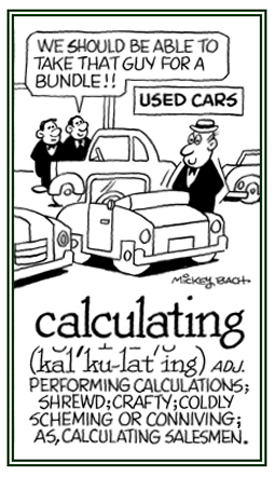 © ALL rights are reserved.
© ALL rights are reserved.
Go to this Word A Day Revisited Index
so you can see more of Mickey Bach's cartoons.
cannibalistic
(adjective), more cannibalistic, most cannibalistic
A characteristic of people or animals that eat other members of their own kind: "It is said that cannibalistic activities were widespread over the past among humans in many parts around the world, including some isolated South Pacific cultures, even now in some parts of tropical Africa."
cantankerous
(adjective), more cantankerous, most cantankerous
1. Relating to a difficulty of getting along with others because of a personality that is ready to make trouble or to oppose anything suggested by anyone else: Sometimes Nancy's
cantankerous boss is easily annoyed and becomes angry when the members of his staff don't do their assignments as quickly as he wants them to.
2. Etymology: the origin is not unanimously agreed to by all sources; possibly it is from Middle English
contekour, "brawler" from
contek, "strife" or perhaps from Irish
cannran, "strife, grumbling".
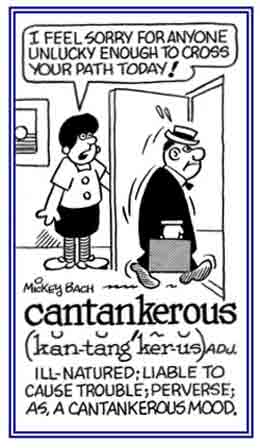 © ALL rights are reserved.
© ALL rights are reserved.
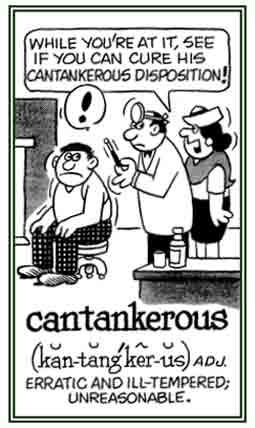 © ALL rights are reserved.
© ALL rights are reserved.
Go to this Word A Day Revisited Index
so you can see more of Mickey Bach's cartoons.
Pertaining to something that is commodious and exceeding what is normal. (2)
Characteristic of someone who is indecisive, inconsistent, or wavering from one idea to another one. (1)
Descriptive of issues that are of primary importance and essential for success. (1)
carinate
(adjective), more carinate, most carinate
Referring to a shape like a keen or carina, especially in parallel rows: A bird can have a carinate breastbone providing for the attachment of flight muscles.
Feeding by preying on animals and eating the flesh of their bodies. (2)
Referring to being spoken positively, explicitly, clearly, and in a definite way. (2)
An impolite, insolent, or arrogant attitude and disregard for something or someone; not caring about the feelings of others. (1)
charlatanic
(char luh tuh NIK) (adjective), more charlatanic, most charlatanic
Characteristic of a person who tries to twist people around to serve his own advantage: The charlatanic salesman is always trying to convince people that what he is selling is worth much more than what he is charging.
charlatanical
(shar luh TUH ni kuhl) (adjective), more charlatanical, most charlatanical
Descriptive of anyone who pretends to have skills or knowledge of something which he or she does not really have or a reference to something that is not what it is claimed to be: The pharmaceutical company was accused of selling charlatanical medicines despite the fact that there was no evidence that such medical drugs actually cured anyone.
charlatanically
(shar luh TUH ni kuh lee) (adverb), more charlatanically, most charlatanically
A reference to the way a person or people deceive others with declarations that everyone will be better off if he or she follows certain beliefs or practices: The religious leader charlatanically preached that the more people donated financially to his organization, the greater chance they would have of being protected by angelic beings now and into the future.
charlatanish
(shar luh TUH nish) (adjective), more charlatanish, most charlatanish
Conveying fraudulent or false promises or information: Although the politician had a good reputation for many years, he was finally exposed to be a charlatanish liar about an immoral incident that took place with a hotel maid when he was traveling in another country.
charlatanistic
(shar luh tuh NISH tik) (adjective), more charlatanistic, most charlatanistic
Resembling knowledge which is actually not true; conveying false claims: There are some
charlatanistic aspects of a few physicians which are considered unscientific and leave nature to cure their patients; however, such doctors take the credit for such results as well as fat fees.
A popular news anchorman has been suspended, or temporarily inactivated from his position, for making charlatanistic claims about the dangers he supposedly experienced while he was going to obtain the news and other possible charlatanistic statements that he might have made over the previous years.
chiffon
(adjective), more chiffon, most chiffon
Descriptive of something that is light, fluffy, or of a transparent nature: Mrs. Anderson commented that the orange cake was the most
chiffon she had ever tasted and gave the baker first prize in the baking contest.
The chiffon scarf which Sally tied around her summer hat matched the pink pattern in her skirt.
A description of an imaginary, fanciful, or unrealistic idea or concept which is impossible to acieve. (2)
1. An unfounded, unrealizable dream.
2. Imaginary concepts or unrealistic ideas and proposals. (4)
Careful when considering what might happen if the wrong choice is made. (2)
Conveying the ability to see or to perceive something beyond normal conceptions. (1)
Pertaining to being noisy and loudly complaining or demanding attention. (1)
Characteristic of keeping or doing something in secret, often in order to conceal an illicit or improper objective; marked by hidden aims or methods. (1)
clavate
(adjective), more clavate, most clavate
Referring to something club-shaped; claviform: Some organisms have such clavate antennae, with the thicker end towards the tip.
clip-on
(adjective), more clip-on, most clip-on
That which is attached to something and holds it in place: Boris wore a
clip-on necktie and Mildred wore
clip-on earrings to the party.
Sam had more clip-on ties than any of his friends.
clipped
(adjective), more clipped, most clipped
A reference to speech which is fast and that uses short sounds and very few words; additionally the words are often expressed in an unfriendly or rude way: The mother answered the unruly boy's question in a clipped voice and tone.
A reference to a convincing, appealing, or a compelling force which is not easy to resist. (4)
Enormous in size, degree, or extent; gigantic or tremendous; astonishing or incredible. (2)
columnar
(kuh LUM nuhr) (adjective), more columnar, most columnar
1. Designed to include a vertical architectural support: The architect included a columnar design in her drawings for the new city hall.
2. Presented with long vertical listings of information or data: The budgetary data from city hall was presented in a columnar format.
columned
(KAHL uhmd) (adjective), more columned, most columned
1. Having posts or standards that are slender and upright: The columned facade was attractive and pleasing for the public to see in the new courthouse.
2. Formed into a vertical display or presentation of information: She quickly added the columned numbers on the finance sheet that was on the desk.
columniferous
(adjective), more columniferous, most columniferous
A reference to that which is formed into pillars, or tall cylindrical and vertical upright structures: The columniferous coniferous forest was awesome with the tall trees reaching towards the sky.
Relating to combined parts which are composed of different elements. (1)
Descriptive of having large contents or perceiving and easily understanding a great number of things. (1)
A reference to having too much belief in one's personal ability, skill, or importance. (2)
Relating to something that is accomplished or done together. (3)
Behaving with an attitude of superiority or of being better than others. (1)
Descriptive of anything that makes it easy, possible, favorable, or likely for something to happen. (1)
A reference to being puzzling, confusing, or perplexing. (2)
Descriptive of a marriage or the relationship between a wife and her husband. (1)
A reference to being in complete or total agreement about some action or proposal. (1)
A reference to attracting attention because something is easily seen or it is obvious to anyone who is looking at it. (2)
A reference to being perfect in every way, faultless; or utterly bad. (2)
A reference to showing or feeling great regret for doing something terrible or behaving badly. (2)
Provoking strong disagreement or disapproval; engaging in controversy or arguments. (1)
Pertaining to being stubbornly disobedient or rebellous. (4)
Relating to someone who knows about something or who has had experience with it. (2)
cordate
(adjective), more cordate, most cordate
Regarding something having a heart-shaped outline; cordiform: Some insects have a cordate head, or a leaf can be cordate with a point at the apex and a notch at the base of the leaf.
A reference to someone who is excessively fat. (2)
Characteristic of being ardent and eager to possess or to achieve something. (1)
Being dishonest with someone or with people. (1)
crackpot
(adjective), more crackpot, most crackpot
Characteristic of someone who is very strange or crazy: Some
crackpot guy in a clown suit is out on the street directing traffic.
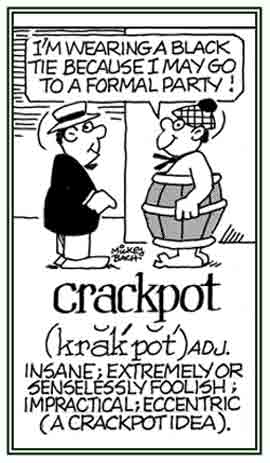 © ALL rights are reserved.
© ALL rights are reserved.
Go to this Word A Day Revisited Index
so you can see more of Mickey Bach's cartoons.
crass
(adjective); crasser, more crass; crassest, most crass
A reference to having or showing no concern about what is proper or acceptable: There were some people who were shocked by Mildred's
crass or offensive comments about the new supervisor at her company.
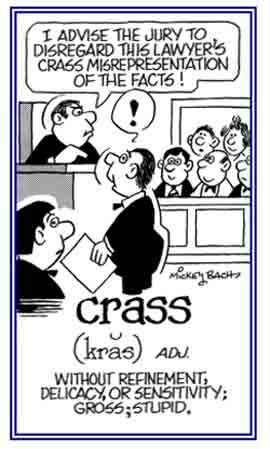 © ALL rights are reserved.
© ALL rights are reserved.
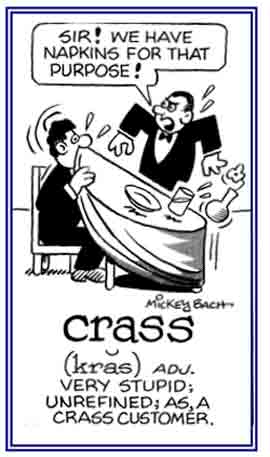 © ALL rights are reserved.
© ALL rights are reserved.
Go to this Word A Day Revisited Index
so you can see more of Mickey Bach's cartoons.
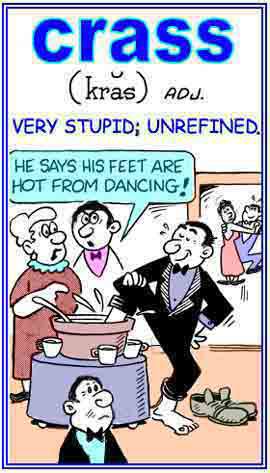 © ALL rights are reserved.
© ALL rights are reserved.
Pertaining to a complete lack of courage; cowardly; fearful; timorous: As boys, even the most
craven among the group, in an attempt to prove that they were as brave as the other guys, jumped off the high diving board into the swimming pool.
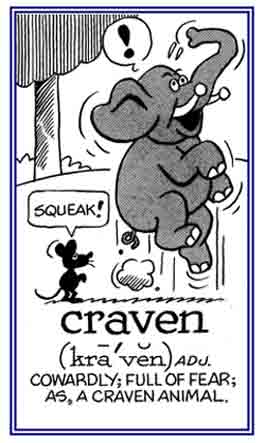 © ALL rights are reserved.
© ALL rights are reserved.
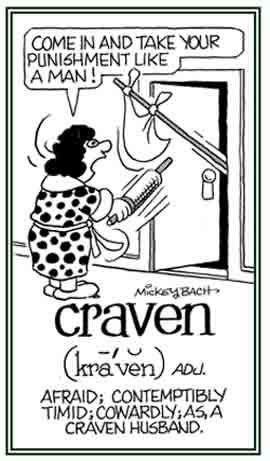 © ALL rights are reserved.
© ALL rights are reserved.
Go to this Word A Day Revisited Index
so you can see more of Mickey Bach's cartoons.
Good enough to be praised and recognized as doing fairly well. (1)
Gullible and easily fooled or cheated because of believing something without questioning or making sufficient investigations. (2)
Making crepitant sounds such as those on a stairway at night when someone doesn't want anyone else to hear him or her. (1)
culinary
(adjective), more culinary, most culinary
A reference to something that is used in the preparation of cooking food: There are
culinary edibles that contain a variety of delicious ingredients.
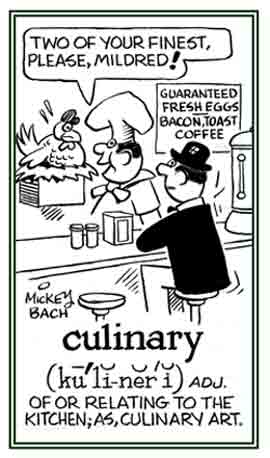 © ALL rights are reserved.
© ALL rights are reserved.
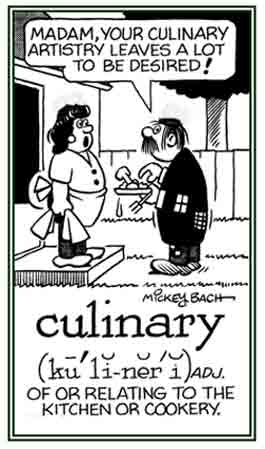 © ALL rights are reserved.
© ALL rights are reserved.
Go to this Word A Day Revisited Index
so you can see more of Mickey Bach's cartoons.
Descriptive of being awkward, clumsy; difficult and inconvenient to manage or handle. (1)
Referring to an action that is done very fast and with little attention given to any details. (2)
A reference to the expression of anger or impatience in a short, abrupt, and blunt manner: Sam, the manager, gave a
curt reply to the customer who was complaining about the clothing that he bought from the store.
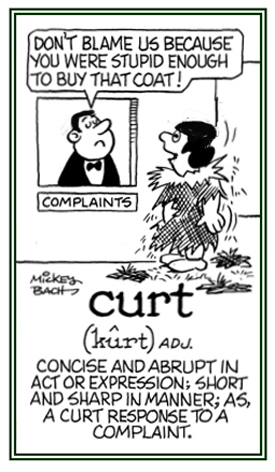 © ALL rights are reserved.
© ALL rights are reserved.
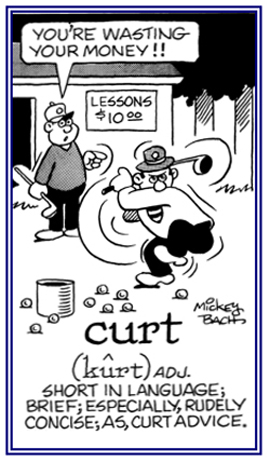 © ALL rights are reserved.
© ALL rights are reserved.
Go to this Word A Day Revisited Index
so you can see more of Mickey Bach's cartoons.
Pertaining to a beautifully shaped woman who is physically very attractive. (2)
Descriptive of someone who is crazy or foolish: Sally was considered to be a
daft comedian by most of her audience.
The teacher told Jimmy not to answer her question with such a daft response.
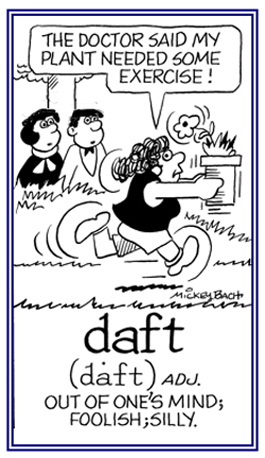 © ALL rights are reserved.
© ALL rights are reserved.
Go to this Word A Day Revisited Index
so you can see more of Mickey Bach's cartoons.
dastardly
(DAS tuhrd lee) (adjective), more dastardly, most dastardly
To describe an individual or something that commits atrocious acts and which is cruel, or vile: A driver who drives wildly through a city at excessive speeds must be a dastardly person who doesn't care about other people.
Being very brave and bold and not discouraged from doing something. (2)
Relating to anything or anyone who is superfluous or in the way and not wanted. (2)
debauchedly
(adverb), more debauchedly, most debauchedly
1. A descriptive term for corruption and sinfulness: Devon's debauchedly written poetry was highly criticized.
2. A reference to being lead away from excellence or virtue: Rosetta encouraged debauchedly inappropriate behavior among her friends.
3. Related to the reduction of the value, quality, or excellence of someone or something; that which is debased: The company has debauchedly produced products that are worthless.
Relating to those who are considered to have low moral standards and an abnormal love of physical pleasures, money, fame, etc.; instead of spiritual values. (1)
déclassé, declasse
(day kla SAY, day klas AY) (French) (adjective); more déclassé, more declasse; most déclassé, most declasse
Pertaining to an inferior quality, social status, class, or rank: Jim and Jane used to go to a chic, or top quality, restaurant that is now a completely
declasse place.
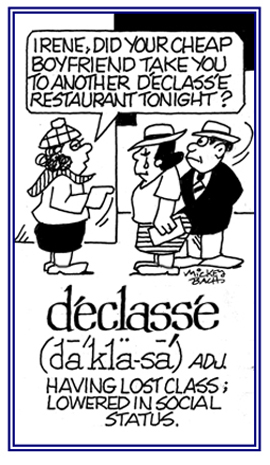 © ALL rights are reserved.
© ALL rights are reserved.
Go to this Word A Day Revisited Index
so you can see more of Mickey Bach's cartoons.
decorous
(DEK uhr uhs, di KOR uhs) (adjective), more decorous, most decorous
1. A reference to conventions or requirements of polite behavior: Jacob has always been considered a polite and
decorous neighbor until he was heard yelling curses and vulgar words at his wife one evening.
2. Proper; becoming; suitable; with dignity and propriety: Even with indecorous customers, the clerk was respectable, polite, and the most
decorous person in the store.
When people don't have wild parties that keep the neighborhood awake until dawn, are civil and courteous to strangers, and use language that is free of obscenities and blasphemies; then they are considered to be decorous, are living "decorously", and are not guilty of "indecorous" behavior.
decorously
(DEK uhr uhs li, di KOR uhs li) (adverb), more decorously, most decorously
Descriptive of being correct and polite in various situations: Hans decorously strived to maintain politeness and calmness when responding to the negative and harsh questions from people in the audience after his speech.
decumbent
(adjective), more decumbent, most decumbent
A reference to a hair that stands 10 to 40 degrees from the surface of an ant's body: Decumbent hair include those that are lying down on the surface of a body, or those that are very close to the skin
Slanderous or scandalous remarks or statements about someone or something. (1)
deftly
(adverb), more deftly, most deftly
A reference to something that is well done or skillfully accomplished: David Garrett deftly plays the violin and deftly leads his musical group at the same time.
Descriptive of something very luxurious, grand, wonderful of the finest quality: Michelle's train accommodations were deluxe, including velvet cushions and lace curtains.
deluxe
(adverb), more deluxe, most deluxe
Pertaining to how something is done in a grand style: The count and his friends traveled deluxe on all occasions.
A reference to being mentally disabled, ill, or insane. (2)
Conveying a strong desire or feeling about something or someone. (2)
Pertaining to tendencies to diminish the merits or reputations of people with disparaging or belittling comments. (3)
Pertaining to getting something in a clever, shrewd, conniving, or dishonest way. (1)
Someone who deserves to be despised, rejected, or scorned because of bad or evil behavior. (1)
Pertaining to being extremely unhappy and discouraged. (1)
A reference to anyone who has complete power to control situations or people even when they don't approve of the decisions made by such an authoritative person. (2)
Pertaining to a lack of a definite plan or purpose and jumping from one thing to another or relating to being unable to make a decision and sticking with it. (2)
Descriptive of a strong desire and an unwavering resolution to complete what a someone wants to achieve. (1)
A reference to something that can cause harm, damage, or injury. (1)
Characteristic of a political ruler with total power who has full power to control people; often in a forceful or unjust manner. (1)
diehard, die-hard
(adjective); more diehard, more die-hard; most diehard, most die-hard
A reference to anybody who is resistant to any kind of change, and reluctant to give up his or her beliefs, positions, or attitudes: They were
diehard politicians who were locked into their uncooperative ways.
Dina's father was a diehard Republican and her mother was a diehard Democrat and neither one could agree on what should be done politically.
Characteristic of a lack of confidence or not feeling comfortable around certain people or in certain circumstances. (3)
Referring to something that lacks conciseness or clarity; using more words than necessary or an excess of words which are not needed. (2)
Relating to wasting time or to cause a delay; descriptive of a strategy to wear down the opposition in order to avoid a direct confrontation or to postpone a decision until later. (2)
Being constant in effort and determination to achieve what is being done. (1)
Relating to an expression of keen insight, perception, and understanding. (1)
Descriptive of being utterly disappointed, sad, and gloomy. (3)
Relating to being careful to avoid embarrassing situations or upsetting another person. (2)
A reference to a disagreement about something that should be the same or different view points about what has happened. (1)
Going on from one topic or subject to another one in order to avoid giving a direct response. (1)
disguised
(adjective), more disguised, most disguised
A reference to being unrecognizable or undercover: The disguised actor was able to do some local shopping without people bothering him for autographs.
Conveying a deception of being honest and sincere when the person is really being crafty, insincere, or dishonest. (1)
disinterested
(dis IN tri stid, dis IN tuh res" tid) (adjective), more disinterested, most disinterested
Referring to being free of bias and self-interest; impartial.
In traditional usage, disinterested can only mean "having no stake in an outcome": Since the judge stands to profit from the sale of the company, he can't be considered a disinterested party in this legal dispute.
Despite critical disapproval, disinterested has come to be widely used by many educated writers to mean "uninterested" or "having lost interest".
A reference to something that is undervalued, deprecated, or considered insignificant. (1)
A reference to people or things that are entirely different in quality or kind from each other. (2)
Depressed, discouraged, and showing a feeling of unhappiness. (1)
Referring to a situation that causes someone to be very worried or nervous about something. (1)
Characterized by spending too much money and time on physical pleasures or being wasteful in the pursuit of pleasure. (1)
Descriptive of being greatly agitated or disturbed. (2)
Characteristic of going in different directions from each other or from a common point; deviating from each other or from a standard or normal course of action. (1)
A reference to being different or distinct from another person or something; having dissimilar viewpoints or opinions. (1)
A reference to causing disagreement, discord, or hostility between people and often resulting in a separation from each other. (2)
docile
(DAHS uhl, DAHS il) (adjective), more docile, most docile
1. Ready and willing to be taught; teachable: The teacher's students were
docile and eager to learn.
2. Yielding to supervision, direction, or management; tractable: Trudy's co-workers turned out to be a very
docile group with whom to work.
3. Amenable to training or handling; easily managed; obedient and non-resistive: Jennifer had a
docile, well-behaved pet.
When a child becomes unusually pliant, obedient, manageable, and excessively subservient, he or she may, in short, become docile.
Docile people sometimes wonder why they are not more popular; after all, they never make any trouble for anyone.
Other people usually find nothing admirable or necessarily likable about a docile person who is willing to be pushed around, or who does what she or he is told out of fear of offending others.
It's considered a poor upbringing when parents don't allow a docile youngster some room for self-expression, and for the release of tension and hostility.
4. Etymology: "easily taught", from Italian or French
docile, from Latin
docilis, "easily taught" and so, "easily managed".
Referring to someone’s actions which show tenacity, persistence, and obstinate determination: Susan was so
dogged insistent to get her own cell phone that she even decided not to eat her meals until she got what she wanted!
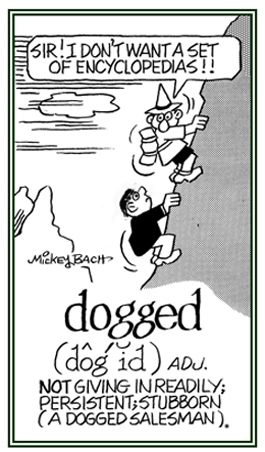 © ALL rights are reserved.
© ALL rights are reserved.
Go to this Word A Day Revisited Index
so you can see more of Mickey Bach's cartoons.
draconian
(dray KOH nee uhn, druh KOH nee uhn) (adjective), more draconian, most draconian
Descriptive of harsh, severe, punitive laws or expectations prepared by the celebrated lawgiver Greek Draco of Athens, Greece in the seventh century B.C.: The
draconian laws of the Greek despot were guaranteed to create a distressed population.
The draconian laws were exceedingly severe, and the term is now sometimes applied to any laws of unusual harshness of a country.
As nearly every violation of Draco's laws was a capital offense, Demades, the orator, said that the draconian code was written in blood.
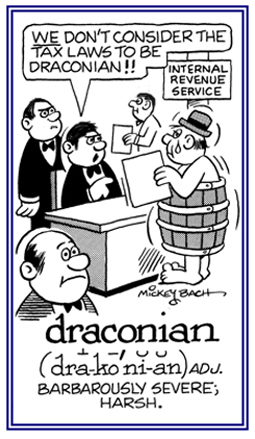 © ALL rights are reserved.
© ALL rights are reserved.
Go to this Word A Day Revisited Index
so you can see more of Mickey Bach's cartoons.
A reference to harsh or very severe laws or rules. (1)
draconic, Draconic
(dray KOHN ik, druh KOHN ik) (adjective); more draconic, more Draconic; most draconic, most Draconic
Applied to laws that are extremely severe or excessive: The draconic measures used by the police to control the demonstrators were being criticized in the newspapers.
A reference to uncertainty or doubt; relating to being suspicious. (2)
dumbstruck
(adjective), more dumbstruck, most dumbstruck
Descriptive of someone who is so disturbed or astonished as to be rendered speechless: Jill was thoroughly
dumbstruck when she suddenly saw her husband standing at the door when he actually was supposed to come home the following week!
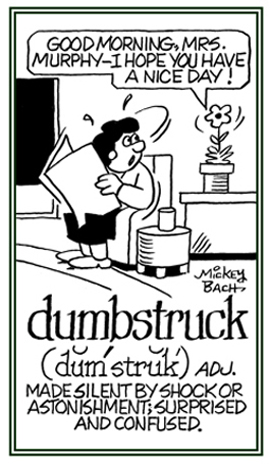 © ALL rights are reserved.
© ALL rights are reserved.
Go to this Word A Day Revisited Index
so you can see more of Mickey Bach's cartoons.
A reference to someone who says or makes an uncomplimentary remark about another person. (1)
eager
(EE guhr) (adjective), more eager, most eager
1. To describe feelings of excitement or enthusiasm about something or some kind of activity: The children were eager to go on the picnic.
2. Illustrating an excited expectancy, a keenness, or zealousness: Elvin's teachers say he is one of the most eager students they have known at the high school.
Descriptive of a very light brown color, similar to unbleached cloth made of a particular fabric: The ecru linen jacket George wore looked very cool and comfortable.
Relating to or descriptive of devouring food in great quantities or to excess. (1)
Conveying a lively, exuberant, or exciting kind of behavior. (1)
Conveying or demonstrating an excess of unrestrained emotion, gratitude, attention, etc. (3)
Conspicuously and outrageously bad; extraordinary in an unacceptable way. (3)
Referring to something that has a conspicuously bad quality or relating to some erroneously presented information. (1)
elusive
(i LOO siv, i LOO ziv) (adjective), more elusive, most elusive
1. Evasive or crafty: They say that antelopes are among the most elusive animals to hunt.
2. Hard to comprehend, baffling: For many people, mathematics is full of elusive concepts.
emaciated
(adjective), more emaciated, most emaciated
A reference to being abnormally thin and/or weak because of hunger, a disease, or lack of sufficient food: The illness left James in a more
emaciated condition than the doctor expected.
Janette was so emaciated that she was too weak to walk and so she had to use a supporting walker to get around.
Because of the severe drought, many of the emaciated cattle on Jake's ranch were not expected to live much longer.
entre nous
(adverb); more entre nous, most entre nous
Pertaining to how private matters or secrets are told or held in strict confidence between one person and another one: Jerome told his friend
entre nous about an incident that happened at work.
George heard entre nous that Sam and Alice were getting married the following week.
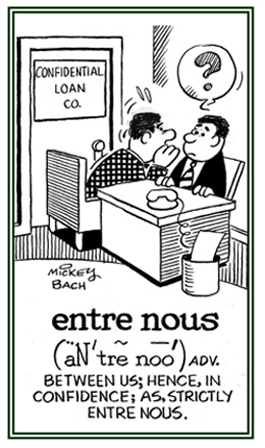 © ALL rights are reserved.
© ALL rights are reserved.
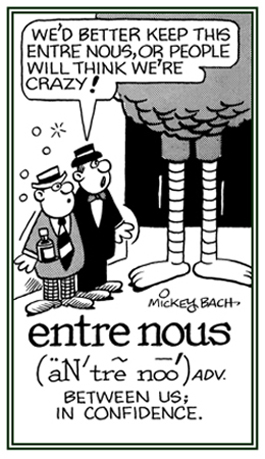 © ALL rights are reserved.
© ALL rights are reserved.
Go to this Word A Day Revisited Index
so you can see more of Mickey Bach's cartoons.
environmental
(adjective), more environmental, most environmental
A reference to the surroundings of people and things: Earth's millions of species influence a wide range of environmental processes, including the force of nature, the stability of ecosystems, and the goods and services they provide.
ephemeral
(i FEM uhr uhl) (adjective), more ephemeral, most ephemeral
A description which lasts for a short time, is brief, or is transitory: Many people enjoy the ephemeral beauty of spring.
Something that begins and ends in one day. (3)
Not following a regular or a proper course; straying; behaving improperly; journeying or traveling in quest of adventure or roving adventurously. (2)
Relating to being overly desirous for food or a reference to being greedy for gain or loot. (2)
Descriptive of something or someone who has been suitably named or identified. (1)
A reference to something which hurts very much or is terribly painful. (1)
Referring to a veering or turning from one point to another one or wandering off the subject as well as erratic behavior. (1)
Characterized as being of very low quality, inferior, detestable, or abhorrent. (3)
A good example or worthy of being admired and imitated. (2)
Pertaining to being free from a liability or an obligation which applies to other people. (1)
A reference to abnormally high costs regarding prices or values; going way above the usual charges for something. (2)
Relating to finding a solution or a practical approach to achieving a desired objective. (2)
Characteristic of being easily replaced or not worth saving; meant to be used and then thrown away. (1)
Very sensitive or well done; such as, executed with precision and good taste. (1)
Significantly excessive or exorbitant; especially, in price or payment. (1)
fabled
(FAY buhld) (adjective), more fabled, most fabled
To describe something that is imaginary, legendary, and not totally believable: There are those who still believe in the fabled Lock Ness Monster.
Joking that is sometimes crude and not appreciated by another person or other people. (3)
faddish
(adjective), more faddish, most faddish
Pertaining to that which is intensely fashionable or popular for a short time: Francine's faddish compulsion for the latest hair and clothing styles is driving her parents crazy.
Pertaining to deceiving and illogical concepts based on untrue information or ideas. (3)
Tending to make mistakes or being wrong. (2)
fatuous
(FACH yoo uhs) (adjective), more fatuous, most fatuous
1. Relating to foolishness, silliness, or stupidity; especially, in a smug or self-satisfied way: Mark had a habit of making
fatuous remarks even during serious conversations.
Jane's fatuous ideas about what her friends should do during the bad economy were ridiculous.
2. Etymology: from Latin
fatuous, "foolish".
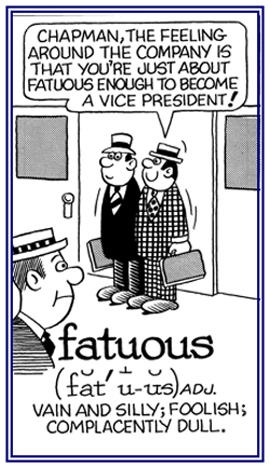 © ALL rights are reserved.
© ALL rights are reserved.
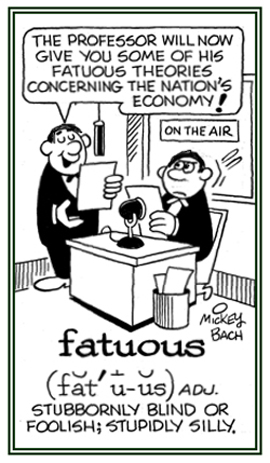 © ALL rights are reserved.
© ALL rights are reserved.
Go to this Word A Day Revisited Index
so you can see more of Mickey Bach's cartoons.
fawning
(adjective), more fawning, most fawning
Pertaining to displaying exaggerated flattery or affection in an obsequious manner or as if one were a slave or humble servant: The employees were giving special attention to and behaving in a
fawning way to the new chief executive of the company.
When the Hollywood stars entered the hotel, the employees were giving more fawning services than they usually do for other famous people.
The wealthy man was surrounded by a group of fawning company representatives in order to encourage him to invest in their business.
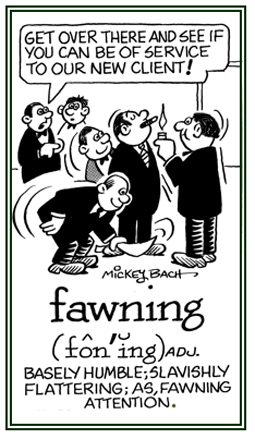 © ALL rights are reserved.
© ALL rights are reserved.
Go to this Word A Day Revisited Index
so you can see more of Mickey Bach's cartoons.
Showing exaggerated flattery or affection in an obsequious or slave-like way by praising someone too much and giving a lot of attention that is usually not sincere to another person; especially, in order to receive a favorable result. (1)
A reference to members of the cat family; similar to a cat; especially, in graceful movements or stealthiness; being sly and clever at tricking others. (1)
felonious
(adjective), more felonious, most felonious
Characterized as a wicked and vicious criminal act: James intentionally committed a
felonious homicide when he shot his neighbor during an argument.
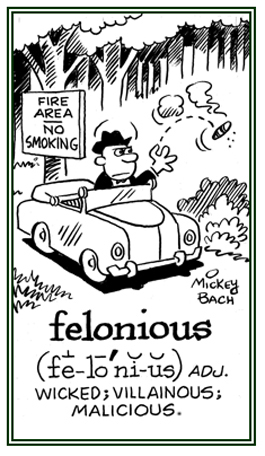 © ALL rights are reserved.
© ALL rights are reserved.
Go to this Word A Day Revisited Index
so you can see more of Mickey Bach's cartoons.
A reference to doing something that is deliberately unlawful, illegal, and harmful to other people. (1)
1. Pertaining to, or of the nature of, a wild and menacing animal or animals: Tom's dog was attacked by a ferine bear while hunting in the woods.
2. Related to human beings and their bestial or beast-like behavior: There was a ferocious and bloody fight going on in the boxing ring between the two ferine boxers.
3. Etymology: from Latin ferinus, from fera, "wild animal".
Relating to a celebration or a holiday. (1)
fickle
(FIK uhl) (adjective), more fickle, most fickle
1. A reference to someone who is likely to change his or her mind without a good reason and without a warning; especially, in matters of loyalty, affection, or taste: Leo's
fickle behavior is a disturbing point for his fiancée’s father.
When fickle people are enthusiastic about something on one day, and then the next day they decide that they don't care about it anymore, they are considered to be unreliable and untrustworthy.
Political candidates can be said to be fickle if they frequently change their positions on issues, which seems to happen quite often.
2. Characteristic of having one opinion now and then an opposite one for erratic or unstable reasons; especially, when something is often done inconsistently: Nolan blames poor sales for his business this month on
fickle consumers who request that he obtain and have certain items available and then they never come back to buy them.
3. Relating to situations becoming suddenly different and unexpected: Sam was complaining about the
fickle weather which was very pleasant in the morning and then quickly became stormy in the afternoon.
4. Etymology: from Middle English
fikel, which came from Old English
ficol, "deceitful, tricky".
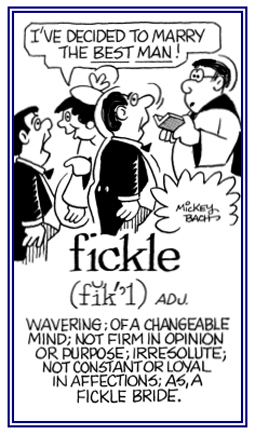 © ALL rights are reserved.
© ALL rights are reserved.
Go to this Word A Day Revisited Index
so you can see more of Mickey Bach's cartoons.
Conveying inconsistency or changing one's mind for no logical reason. (1)
flagitious
(adjective), more flagitious, most flagitious
1. A reference to someone who is guilty of committing terrible crimes: A
flagitious man called an elderly woman and told her that he would be coming to her place to read a water meter and when he arrived, he forced her to give him her jewelry and over $500 in cash and then locked her in a closet so she could not call the police.
2. Characteristic of a person who is extremely brutal, wicked, heinous, or monstrous: Two
flagitious robbers went into a small bank when there were no other customers and forced the clerk to give them several thousand dollars in cash and then beat him until he was unconscious and then they left.
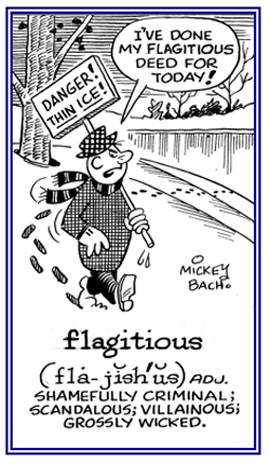 © ALL rights are reserved.
© ALL rights are reserved.
Go to this Word A Day Revisited Index
so you can see more of Mickey Bach's cartoons.
flamboyant
(adjective), more flamboyant, most flamboyant
Characterizing a florid, lavish color, costume, or behavior: When performing, the pianist wore the most flamboyant outfit the audience had ever seen, reminding the patrons of the famous American star of the stage, Liberace.
Having a mistake, a fault, or a weakness: It was a flawed drama production; however, the actors still gave the audience a powerful performance.
flawless
(adjective), more flawless, most flawless
Being perfect; and so, having no mistakes, imperfections, marks, or bad features: Susanne was an attractive woman with flawless facial skin.
flawlessly
(adverb), more flawlessly, most flawlessly
Descriptive of having performed an activity with perfection: Quinton flawlessly performed his musical presentation and the audience shouted for an encore.
fleeting
(adjective), more fleeting, most fleeting
Descriptive of something that passes swiftly and is soon gone; short-lived: It was only momentary, but Grace thought for a
fleeting second that Gary was going to kiss her.
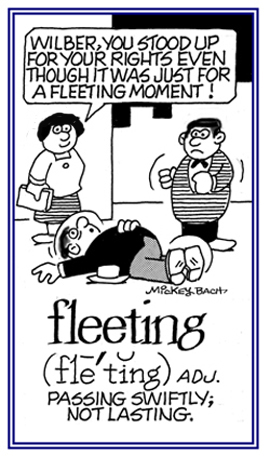 © ALL rights are reserved.
© ALL rights are reserved.
Go to this Word A Day Revisited Index
so you can see more of Mickey Bach's cartoons.
flighty
(adjective), more flighty, most flighty
Descriptive of a situation of an individual who is volatile, impulsive or erratic in behavior and ways; irresponsible: When Sally needed a friend to go with her to the hospital, she didn’t ask Linda who is a
flighty person who often decides to do something else at the last minute.
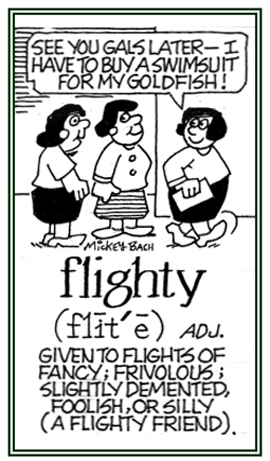 © ALL rights are reserved.
© ALL rights are reserved.
Go to this Word A Day Revisited Index
so you can see more of Mickey Bach's cartoons.
flippant
(FLIP uhnt) (adjective), more flippant, most flippant
Characterized as disrespectful, silly, or inappropriate for a situation: The young man shocked everyone by making
flippant remarks while his father's will was being read.
 © ALL rights are reserved.
© ALL rights are reserved.
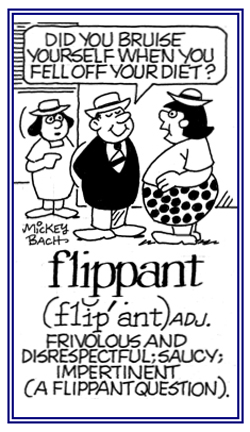 © ALL rights are reserved.
© ALL rights are reserved.
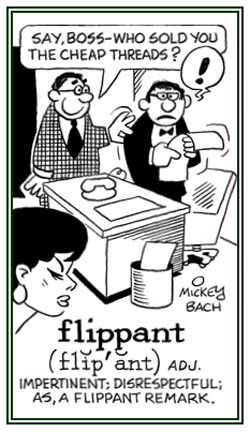 © ALL rights are reserved.
© ALL rights are reserved.
Go to this Word A Day Revisited Index
so you can see more of Mickey Bach's cartoons.
Relating to treating a serious situation with humor, or making silly, inappropriate, and disrespectful remarks. (3)
flowingly
(adjective), more flowingly, most flowingly
A reference to something suggestive of running water: A flowingly thought; the current of history; a flood of ideas; a flux of words; a rush of sympathy; a stream of complaints; a tide of immigration.
This entry is located in the following unit:
flow
(page 1)
footling
(adjective), more footling, most footling
1. A reference to wasting time and behaving in a foolish way: Fred considered his friend a
footling amateur when he played basketball.
2. Pertaining to insignificant, worthless, and even irritating behavior and words: Garret's
footling contribution when working with his colleagues was considered to be useless and silly.
Karl was very upset with his wife's constant criticisms about him and he told her that she comes with the same footling complaints day after day and week after week.
forbearing
(adjective), more forbearing, most forbearing
Descriptive of someone who shows patience, self-control, and is mild, indulgent, tolerant, and long-suffering: Tom’s parents were very
forbearing during the difficult years of his teenage life when he was getting into trouble so often.
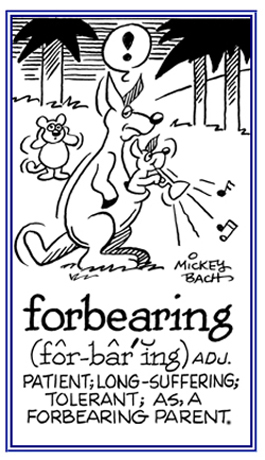 © ALL rights are reserved.
© ALL rights are reserved.
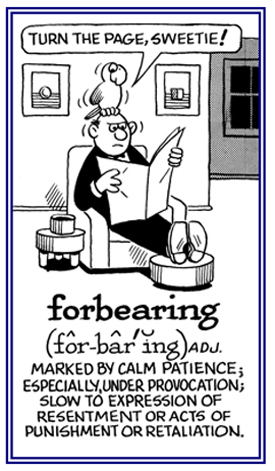 © ALL rights are reserved.
© ALL rights are reserved.
Go to this Word A Day Revisited Index
so you can see more of Mickey Bach's cartoons.
forbidding
(adjective), more forbidding, most forbidding
1. Characterized by a harshly uninviting or formidable behavior or appearance: Karl had a
forbidding scowl, or angry expression on his face, when his wife asked him to hang up the laundry while he was watching a football game on TV.
2. Descriptive of a threatening or foreshadowing evil or tragic developments: The
forbidding thunderclouds indicated that a storm was coming.
 © ALL rights are reserved.
© ALL rights are reserved.
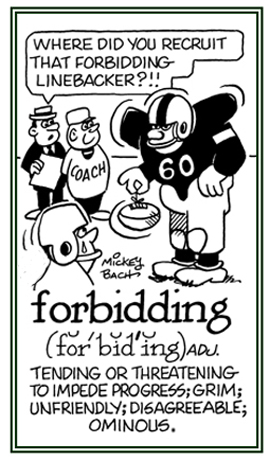 © ALL rights are reserved.
© ALL rights are reserved.
Go to this Word A Day Revisited Index
so you can see more of Mickey Bach's cartoons.
forthright
(adjective), more forthright, most forthright
A reference to being direct, straightforward, and honest: The
forthright mother did not mince any words when she was scolding her son about breaking a window when he and his friend were throwing a ball back and forth to each other.
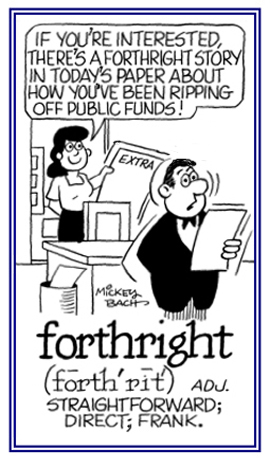 © ALL rights are reserved.
© ALL rights are reserved.
Go to this Word A Day Revisited Index
so you can see more of Mickey Bach's cartoons.
A reference to an event that happens accidentally by luck or chance rather than being planned or expected. (3)
fraught
(adjective), more fraught, most fraught
1. A reference to something or someone that causes or is filled with a lot of emotional stress or worry: Greg's mother and father had a
fraught disturbance when he appeared at dinner with green hair and said he was quitting his studies at the university and wanted to join a circus as a performer!
2. Characteristic of a circumstance that is loaded with bad or unwanted conditions: The plight of suddenly having to drive a car on the left side of the road in London can be
fraught with great difficulties for anyone who has always driven on the right side before!
 © ALL rights are reserved.
© ALL rights are reserved.
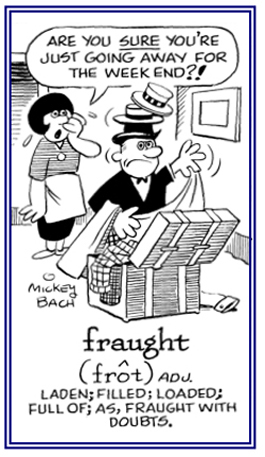 © ALL rights are reserved.
© ALL rights are reserved.
Go to this Word A Day Revisited Index
so you can see more of Mickey Bach's cartoons.
frenzied
(adjective), more frenzied, most frenzied
Pertaining to a great and often wild or uncontrolled activity: There is often a
frenzied crowd of people who are in stores buying things just before Christmas.
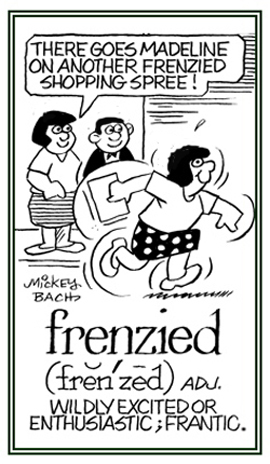 © ALL rights are reserved.
© ALL rights are reserved.
Go to this Word A Day Revisited Index
so you can see more of Mickey Bach's cartoons.
1. That which is new to one's experience or not encountered before: The playwright included a lot of
fresh material in his new drama.
2. Recently made, produced, or harvested; not stale or spoiled:
Fresh bread is available at the local bakery every morning, except on Sunday.
3. Not preserved, as by canning, smoking, or freezing: The store is providing
fresh vegetables from local farms.
4. Not saline or salty: Having
fresh water is essential to good health.
It was so good to taste fresh meat and fresh water again after the trip in the desert.
5. Not yet used or soiled; still clean: Sally took out a
fresh sheet of paper from the desk to write a letter to her friend.
6. Free from impurity or pollution; pure: It's wonderful when Sean can open the windows and get some
fresh air in the apartment.
7. Being improperly sassy, insolent, or a smart-aleck: The boy's mother sent him to his room because of his
fresh behavior.
friable
(FRIGH uh buhl) (adjective), more friable, most friable
Pertaining to being easily broken into small fragments, crumbled, or reduced to powder: The builders used friable asbestos insulation in the new house.
frivolous
(FRIV uh luhs) (adjective), more frivolous, most frivolous
1. Silly, impractical, or whimsical: At least twice a year, Antonio bought something frivolous just to satisfy his ego.
2. Petty, superficial, nonsensical: Kimberly kept wondering why Lorna would marry such a frivolous guy.
Pertaining to being thrifty and not spending money unless it is really necessary. (3)
Referring to something that is shining brightly; which is dazzling or gleaming brilliantly. (1)
Flashing; similar to lightning. (2)
fulsome
(FUHL suhm) (adjective), more fulsome, most fulsome
1. Relating to a flattering or insincere behavior in an offensive way: Roy thought his neighbors were embarrassingly
fulsome in expressing their appreciation for taking care of their mail delivery while they were away on vacation.
2. A reference to a large size or quantity; plentiful; generous or abundant: The farmers were happy to have a
fulsome harvest despite the severe winter conditions that existed earlier in the year.
Ted's parents served him a fulsome meal to celebrate his birthday.
The original meaning of fulsome was "full, abundant", but the dominant sense of the word currently is conveying offensive to the senses or sensibility."
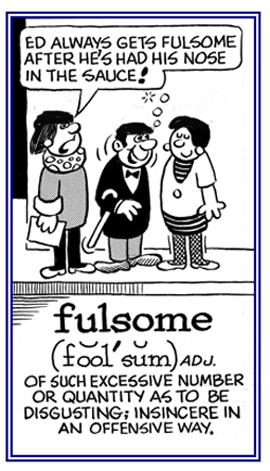 © ALL rights are reserved.
© ALL rights are reserved.
Go to this Word A Day Revisited Index
so you can see more of Mickey Bach's cartoons.
Flattering someone in an insincere way; or a large size or quantity; plentiful; generous or abundant. (1)
A description of sadness and mournfulness; pertaining to being dismal and gloomy. (2)
Referring to the bringing or prediction of death or evil; fatal; such as, the doctor made a funest diagnosis of the patient's heart condition. (1)
furtive
(adjective), more furtive, most furtive
1. A reference to being secret and trying to take actions to escape being noticed: Danny was sneaking
furtive glances at his watch during the business conference to see how much longer he would have to sit there before he could go home.
2. Descriptive of someone who is sly, shifty, or stealthy: The man's
furtive behavior at the bank apparently was enough to get the management to alert the police.
In New York City, there is a claim that at least half the stops and searches of blacks and Latinos by the police are done because of their "furtive movements" or behaviors.
3. Referring to covert or sneaky activities; especially, when a person, who is in the process of stealing, doesn't want to be caught: Debora was
furtive as she engaged in her illegal activities of shoplifting in the store.
3. Etymology: derived from the Latin
furtivus, "stolen" from
furtum, "theft, secret action".
 © ALL rights are reserved.
© ALL rights are reserved.
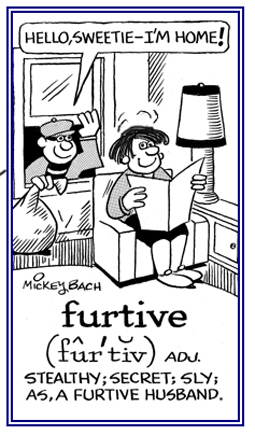
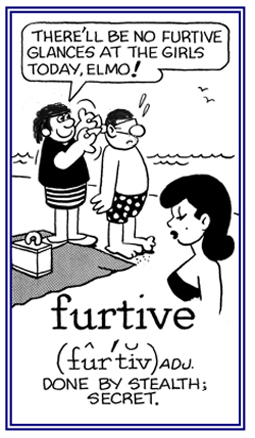 © ALL rights are reserved.
© ALL rights are reserved.
Go to this Word A Day Revisited Index
so you can see more of Mickey Bach's cartoons.
Relating to someone who is trying to avoid being noticed doing something that is illegal or criminal. (3)
furtively
(adverb), more furtively, most furtively
Slyly or secretly in manner or behavior: The woman furtively returned the library book that she had taken last month without checking it out.
Descriptive of being incapable of producing any desired results, useless, unsuccessful; not worth attempting. (1)
Characteristic of a doctrine that human endeavors and aspirations can not be achieved and so they are not worth the efforts. (1)
gargantuan
(gahr GAN choo uhn) (adjective), more gargantuan, most gargantuan
1. Anything that is described as huge, gigantic, vast, or of enormous proportions: The term
gargantuan is derived from
Gargantua who was a king and described as having a voracious appetite in a novel by the French author Francois Rabelais (1494-1553).
Jack and Jill bought a gargantuan house with the money they inherited from her parents which consisted of at least twenty-five rooms.
2. Etymology: derived from
garganta, Spanish for "gullet" and French
gargouille, "throat".
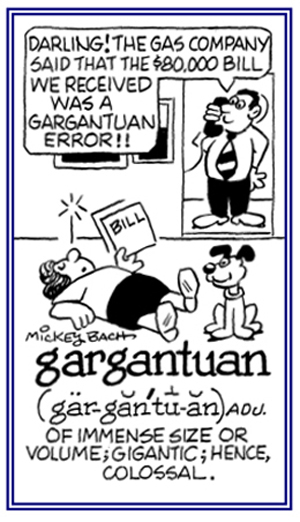 © ALL rights are reserved.
© ALL rights are reserved.
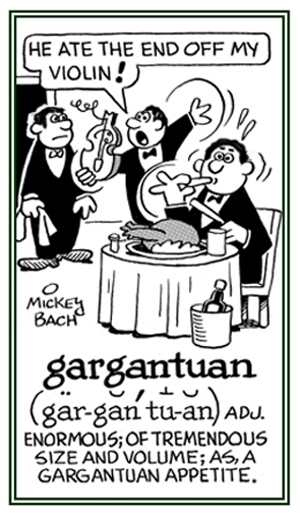 © ALL rights are reserved.
© ALL rights are reserved.
Go to this Word A Day Revisited Index
so you can see more of Mickey Bach's cartoons.
A reference to being too wordy, illogical, and rambling on and on or talking too much. (2)
gauchely
(adverb), more gauchely, most gauchely
A descriptive term for being without social grace, sensitivity, or acuteness; awkward; crude; tactless: Sherry apologized for behaving gauchely at the concert last night and embarrassing her guest.
Being very cold, freezing, and icy. (3)
germane
(adjective), more germane, most germane
Pertaining to something that is relevant to a topic that is being discussed: Mrs. Smart always liked her students to ask
germane or related and important questions so the lesson could proceed successfully.
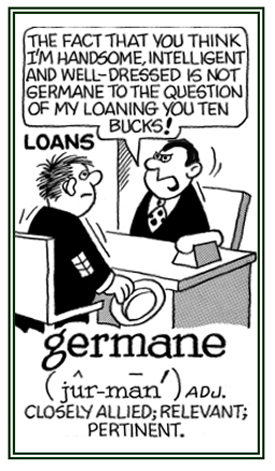 © ALL rights are reserved.
© ALL rights are reserved.
Go to this Word A Day Revisited Index
so you can see more of Mickey Bach's cartoons.
gimmicky
(adjective), more gimmicky, most gimmicky
A reference to a method or process which is used to get people to notice something: The gimmicky advertisements made promises that attracted people; however, they were more talk than any expected results.
glamping
(adjective), more glamping, most glamping
A reference to state-of-the-art, upscale camping equipment that comes in a variety of sizes, shapes, and colors; in other words, heavier on the glamor and lighter on the camping: Tent and lantern makers are providing what is considered upscale
glamping equipment for those who want to have more comfortable and safer ways to go camping.
Lodgings at glamping sites include structures; such as, yurts (circular domed dwellings that are portable and self-supporting), tipis (portable shelters of canvas stretched over supporting poles and fastened to the ground with ropes and pegs), pods (enclosed cabins suspended from cables), bell tents, safari tents (double-roofed frame tents), tent cabins, and tree houses.
Some glamping sites offer amenities; such as, fresh bed linens, washrooms, food services, private verandas, and direct access to the great outdoors.
glibly
(adverb), more glibly, most glibly
Having a ready flow of words but usually not being accurate or understandable: People with extremely facile and ready tongues can glibly talk about all kinds of things even when they don't know what they are talking about.
gormless
(adjective), more gormless, most gormless
Stupid or lacking intelligence: The
gormless student failed all of his high school classes because he made no effort to do his homework or to study for the final exam.
The term gormless is used primarily in British English.
grandiose
(adjective), more grandiose, most grandiose
Descriptive of something as being exaggerated or flamboyant: The home decorator seemed to believe that the more grandiose the better, as reflected in his choices of colors, draperies, and furniture.
greedily
(adverb), more greedily, most greedily
Wanting to eat or to drink more than a person can reasonably consume; voracious; gluttonous: The family was greedily eating and drinking as if they had not eaten or drunk anything for days.
Looking for and enjoying being with others; tending to form a group with those who have the same interests. (2)
grueling
(adjective), more grueling, most grueling
Characteristic of something which is very tiring or exhausting: A marathon is a very
grueling contest.
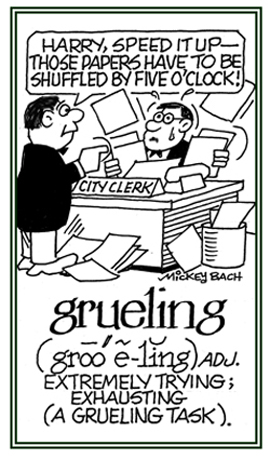 © ALL rights are reserved.
© ALL rights are reserved.
Go to this Word A Day Revisited Index
so you can see more of Mickey Bach's cartoons.
guileless
(adjective), more guileless, most guileless
Characteristic of being straightforward, honest, and sincere: The witness gave a
guileless testimony during the criminal court trial.
The girl answered the moderator on the TV show with more guileless responses when she was asked about her plans for the future.
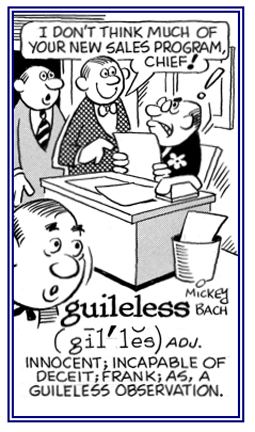 © ALL rights are reserved.
© ALL rights are reserved.
Go to this Word A Day Revisited Index
so you can see more of Mickey Bach's cartoons.
A reference to being honest, sincere, and without deceit. (1)
gullible
(adjective), more gullible, most gullible
Descriptive of being easily fooled, tricked, cheated, or deceived because of having an overly trusting nature or naiveté: Jancy was a
gullible person who thought she could be chosen for a million dollar prize by simply filling out a form with personal information and submitting it to an organization on the internet.
Trista's husband told her that he couldn't believe that she was gullible enough to believe something so outrageous as being told in an e-mail that she had won a million dollars in a lottery; especially, since she never purchased a lottery ticket.
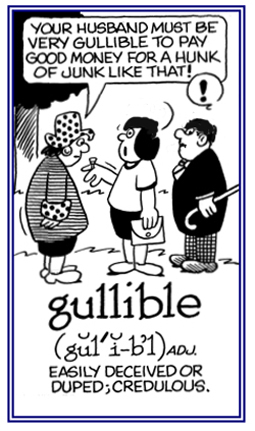 © ALL rights are reserved.
© ALL rights are reserved.
Go to this Word A Day Revisited Index
so you can see more of Mickey Bach's cartoons.
Referring to being easily tricked, deceived, or cheated. (1)
gullibly
(adverb), more gullibly, most gullibly
A reference to being easily fooled or deceived: Stephan gullibly submitted his credit card information to the store clerk.
Relating to a savory, a pleasing, and a delicious flavor when consuming food. (1)
gustily
(adverb), more gustily, most gustily
Descriptive of blowing strongly: James tried to get home as soon as possible because the gustily blowing winds indicated that a storm was coming very soon.
Descriptive of being skilled and creative: Janet's mother was more
habile as a writer of children's stories than most authors for the very young readers.
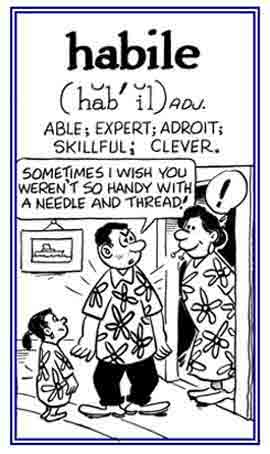 © ALL rights are reserved.
© ALL rights are reserved.
Go to this Word A Day Revisited Index
so you can see more of Mickey Bach's cartoons.
hackneyed
(adjective), more hackneyed, most hackneyed
1. Pertaining to something that is not funny nor interesting anymore, because it is used so often that it is worn out and is too commonplace: Sometimes people use
hackneyed words, phrases, jokes, or topics to such a degree that they are boring and of little interest for others who have to listen to them.
2. Etymology: A
hack, "a taxicab or horse for hire" is a short form of
hackney, "a type of horse-drawn carriage" once very frequently used as a taxicab.
The literary hack who does mediocre, or average quality writing, gets his or her name from the "horse", since both could be hired cheaply to do routine or common work.
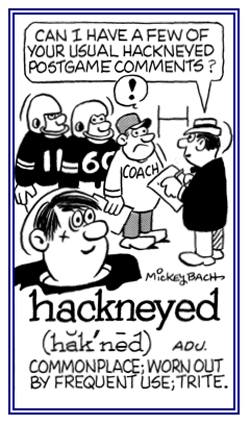 © ALL rights are reserved.
© ALL rights are reserved.
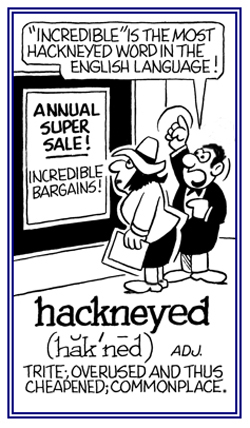 © ALL rights are reserved.
© ALL rights are reserved.
Go to this Word A Day Revisited Index
so you can see more of Mickey Bach's cartoons.
A reference to something that is too commonplace, trite, and worn out because of excessive usage. (2)
haggard
(adjective), more haggard, most haggard
Descriptive of someone who looks worn and exhausted from being overworked: Jim's wife was shocked by her husband's
haggard appearance after he had been working overtime as a carpenter.
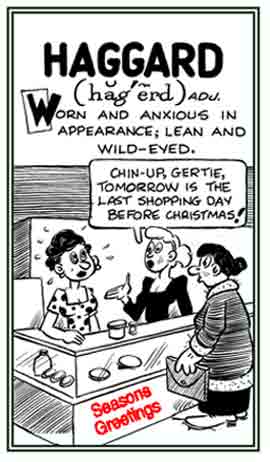 © ALL rights are reserved.
© ALL rights are reserved.
Go to this Word A Day Revisited Index
so you can see more of Mickey Bach's cartoons.
halcyon
(adjective), more halcyon, most halcyon
Descriptive of peacefulness, calmness, prosperity, and of being very happy and successful: Catherine fondly remembers the
halcyon days of her career as an actress when she was just out of college.
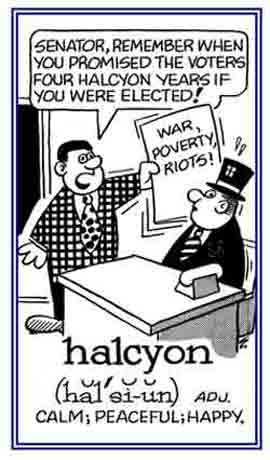 © ALL rights are reserved.
© ALL rights are reserved.
Go to this Word A Day Revisited Index
so you can see more of Mickey Bach's cartoons.
Referring to anyone who does not have a plan for accomplishing something or doing something at random and by chance without an organized procedure. (1)
happily
(adverb), more happily, most happily
1. A reference to saying that something good or fortunate has taken place: Happily, no one was injured in the car accident.
2. Descriptive of being in a willing way: The salesperson told Fred that she would happily accept his credit card for payment of the products that he had picked out.
harrowing
(adjective); more harrowing, most harrowing
Descriptive of causing distress, pain or upsetting someone: Alice has given a
harrowing account and description of her battle with cancer.
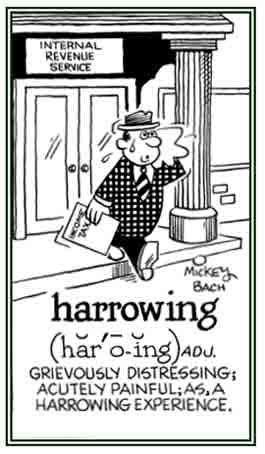 © ALL rights are reserved.
© ALL rights are reserved.
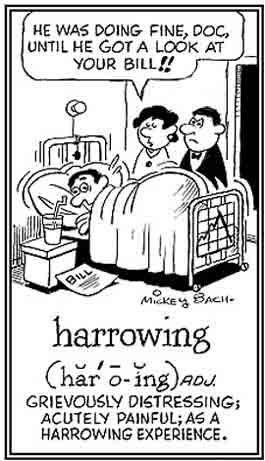 © ALL rights are reserved.
© ALL rights are reserved.
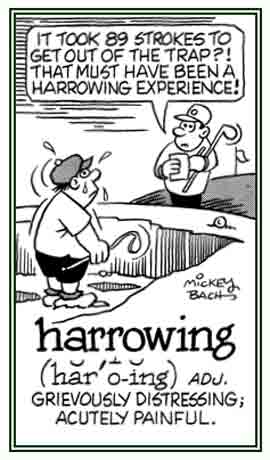 © ALL rights are reserved.
© ALL rights are reserved.
Go to this Word A Day Revisited Index
so you can see more of Mickey Bach's cartoons.
haunted
(adjective), more haunted, most haunted
1. Upset or troubled: Mike was a strange person who always appeared to have haunted feelings about what happened to his son during the war.
2. Lived in or visited by ghosts: That haunted house kept people away from it, including those who otherwise wanted to break in.
haunting
(adjective), more haunting, most haunting
Pertaining to being sad or beautiful to such a degree that it is difficult to forget: The haunting sounds of the singer's voice could not be forgotten by many people in the audience.
hauntingly
(adverb), more hauntingly, most hauntingly
A reference to having a problem of forgetting something because of its beauty or sadness: Lorna's hauntingly sad life, as a result of her family being burned to death in their house while she was visiting a friend, continually disturbed her for the rest of her life.
hazardous
(adjective), more hazardous, most hazardous
1. A reference to being potentially very dangerous to living beings or to an environment: When people throw away their garbage and it lands in the sea, it can be very
hazardous for the fish and other sea creatures.
2. Relating to jeopardy; perilous: Being a mountain climber can be very risky or
hazardous; especially, if the weather conditions turn bad and he or she cannot return to the lodge or campsite in time.
3. Descriptive of someone who is depending excessively on chance or luck: Ricky seemed to be a
hazardous type of person, being quite bold and reckless when driving his car at high speeds and overtaking others without checking to see if other drivers were approaching on the other side of the road.
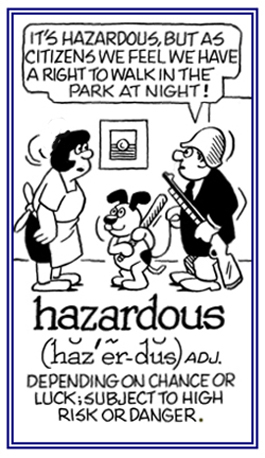 © ALL rights are reserved.
© ALL rights are reserved.
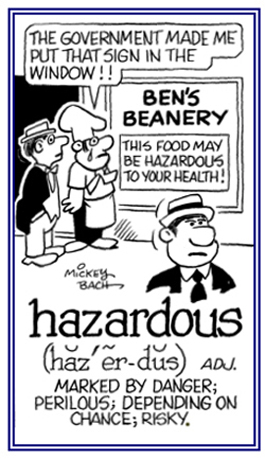 © ALL rights are reserved.
© ALL rights are reserved.
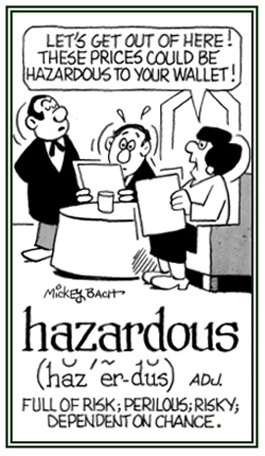 © ALL rights are reserved.
© ALL rights are reserved.
Go to this Word A Day Revisited Index
so you can see more of Mickey Bach's cartoons.
heedless
(adjective), more heedless, most heedless
Not paying careful attention: There is a more
heedless use of natural resources in many parts of the world now than that which has taken place before.
The heedless utilization of water could result in severe shortages.
heinous
(adjective), more heinous, most heinous
1. Shockingly brutal, cruel, and hateful: It would be a
heinous act of betrayal to disclose comments made during a religious confession.
2. Grossly wicked or reprehensible; abominable: The shooter of the students committed a
heinous crime.
3. Etymology: from Old French
haineus; from French
haineux, from
haine, "hatred"; and
hair, "to hate".
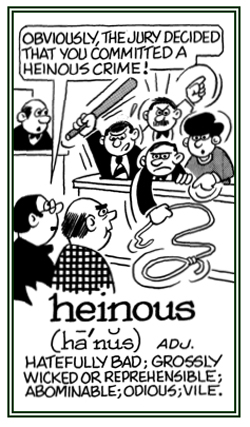 © ALL rights are reserved.
© ALL rights are reserved.
Go to this Word A Day Revisited Index
so you can see more of Mickey Bach's cartoons.
A description of a brutal, cruel, and hateful action that is abhorrent and abominable. (1)
heinously
(adverb), more heinously, most heinously
Terribly evil and extremely reprehensible: Robert Louis Stevenson portrayed a heinously evil doctor in his story Dr. Jekyll and Mr. Hyde.
Relating to winter weather, wintry. (2)
histrionic
(adjective); more histrionic, most histrionic
1. Relating to actors or acting: The director was looking for someone with
histrionic talents to play the part in the melodrama in town.
2. A reference to being excessively dramatic or emotional, especially with the intention of drawing attention to oneself: The dinner guests suddenly stopped talking with each other when Rebecca unexpectedly burst out laughing in her
histrionic way.
3. Etymology: from Late Latin
histrionicus, "pertaining to acting".
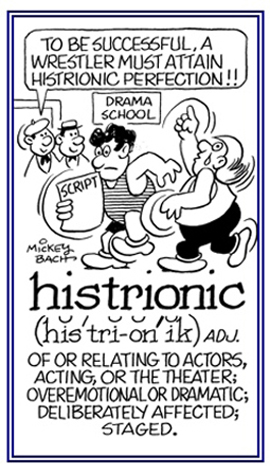 © ALL rights are reserved.
© ALL rights are reserved.
Go to this Word A Day Revisited Index
so you can see more of Mickey Bach's cartoons.
Descriptive of a something that is written by the hand of a person whose signature is on a piece of paper indicating an official action which is to be done. (1)
Hideous; appalling; shockingly dreadful and fearful. (2)
A reference to anything that produces terrible sounds. (1)
Relating to urging or encouraging someone, or others, to do something by giving them confidence that they will be successful. (1)
humdrum
(adjective); more humdrum, most humdrum
A reference to being dull, boring, or lacking any excitement: Mrs. Todd's lessons were so
humdrum that her students almost fell asleep because they felt that she was monotonous and repetitious.
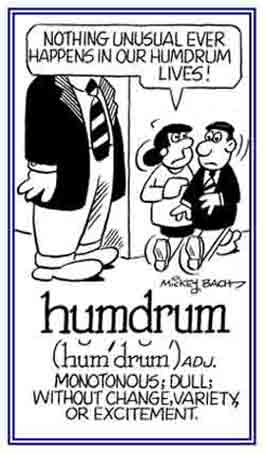 © ALL rights are reserved.
© ALL rights are reserved.
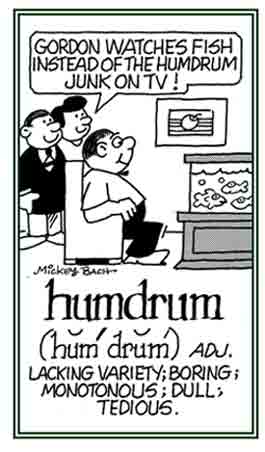 © ALL rights are reserved.
© ALL rights are reserved.
Go to this Word A Day Revisited Index
so you can see more of Mickey Bach's cartoons.
Conveying a situation that shows that one has been greatly upset, disturbed, or harmed by something. (2)
icy
(IGH see) (adjective), more icy, most icy
1. Covered or frozen over and slick: Joan commented to her husband, "Jim, drive with caution because the roads are icy."
2. Reserved or hostile in behavior: An icy reception greeted the late arrivals at the meeting.
3. Unfriendly, frigid, cold: Janine gave Benjamin an icy stare when he spilled the soup on the table during dinner.
idyllic
(adjective), more idyllic, most idyllic
1. A reference to simple, unspoiled, and especially rural charm: The shimmering lakes out in the country are as
idyllic as ever.
2. Descriptive of a very peaceful, happy, and enjoyable situation: Joyce and her children were having an
idyllic summer day at the local swimming pool.
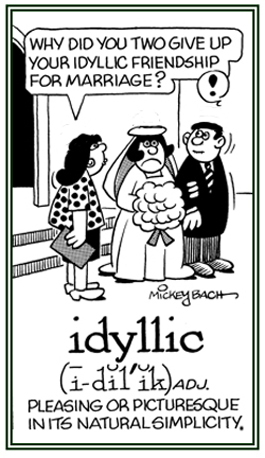 © ALL rights are reserved.
© ALL rights are reserved.
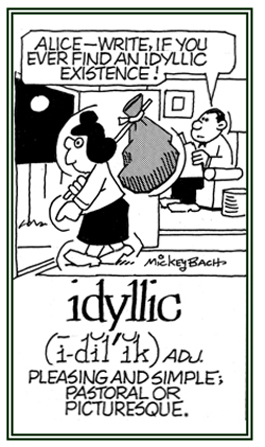 © ALL rights are reserved.
© ALL rights are reserved.
Go to this Word A Day Revisited Index
so you can see more of Mickey Bach's cartoons.
ill-disposed
(adjective), more ill-disposed, most ill-disposed
A reference to someone who is unfriendly or has a bad attitude: Judy evidently was in a disagreeable mood that morning and was completely
ill-disposed and uncooperative with the others in her study group at school.
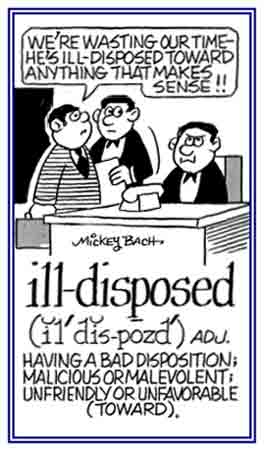 © ALL rights are reserved.
© ALL rights are reserved.
Go to this Word A Day Revisited Index
so you can see more of Mickey Bach's cartoons.
Descriptive of anything that is not permitted by law. (1)
imbecilic
(adjective), more imbecilic, most imbecilic
Relating to being so senseless as to be absurd, foolish, stupid, idiotic: Lydia made an
imbecilic decision when she drove her car to work on a very stormy day.
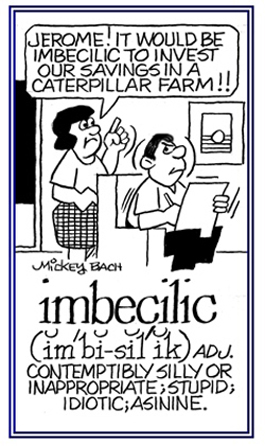 © ALL rights are reserved.
© ALL rights are reserved.
Go to this Word A Day Revisited Index
so you can see more of Mickey Bach's cartoons.
imminent
(adjective), more imminent, most imminent
Descriptive of something that is about to happen, to occur, or to take place very soon; especially, of anything which won't last very long: Doris and Jacob are expecting the
imminent arrival of friends for their wedding anniversary.
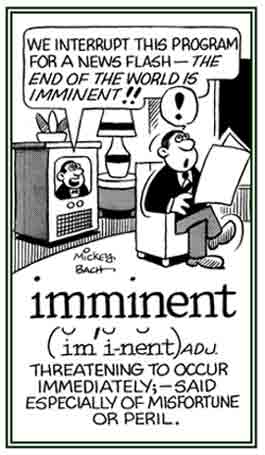 © ALL rights are reserved.
© ALL rights are reserved.
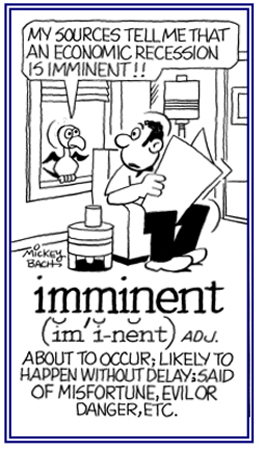 © ALL rights are reserved.
© ALL rights are reserved.
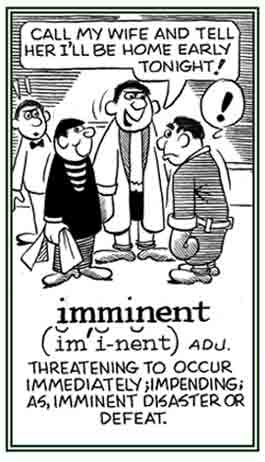 © ALL rights are reserved.
© ALL rights are reserved.
Go to this Word A Day Revisited Index
so you can see more of Mickey Bach's cartoons.
A reference to being incapable of perceiving something by the sense of touch; intangible or untouchable. (1)
impavid
(adjective); more impavid, most impavid
A reference to fearlessness, including courage and a resolution to achieve an objective: Little Finn was quite
impavid and undaunted in his attempts to climb up the vertical ladder by himself to get to the top, where his brother's bed was!
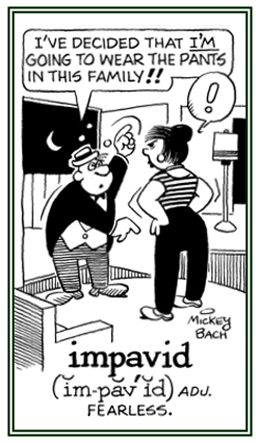 © ALL rights are reserved.
© ALL rights are reserved.
Go to this Word A Day Revisited Index
so you can see more of Mickey Bach's cartoons.
1. Faultless, without doing wrong.
2. Not liable to be sinful. (1)
Living in poverty because there is no money to pay for food or a place to live. (2)
A reference to something that is happening now or is likely to happen soon. (4)
Pertaining to something that is definitely necessary and needs to be taken care of right away. (2)
Characteristic of being minute, insignificant, minor, or infinitesimally dissimilar. (1)
Showing an overbearing, arrogant, or domineering behavior or attitude. (3)
Showing a lack of respect or being rude. (1)
Calm, unexcitable, and not easily agitated. (2)
Excitable, impulsive, hasty, and rash. (2)
Showing a playful desire to cause trouble: Michael had an
impish grin when he told his brother that he couldn't watch TV because it was broken even though it wasn't.
Janine, the impish girl, was constantly teasing her younger brother.
Relating to being annoyingly and continually requesting or begging for something. (1)
Descriptive of something or someone who is very impressive and magnificent because of great size, forcefulness, and/or power. (2)
Not getting ready for what can or will happen or what will be needed in the future. (1)
A reference to someone who does not use good judgement, or who shows carelessness and doesn't realize the bad consequences of what he or she is saying or doing. (2)
Relating to an accidental or an unintentional mistake; doing or saying something that was not meant to happen. (4)
A reference to making no sense or being without significance; conveying silliness and being pointless. (2)
inclement
(in KLEM uhnt) (adjective), more inclement, most inclement
1. Harsh or severe; stormy; rigorous; foul, not mild: The inclement weather spoiled Eugene's entire vacation on the island.
2. Etymology: from Latin inclemens, from in, "not" and clemens, "mild".
incondite
(adjective), more incondite, most incondite
A reference to something which is badly constructed or put together: James said the artist had
incondite or badly-arranged and ill-composed artistic works.
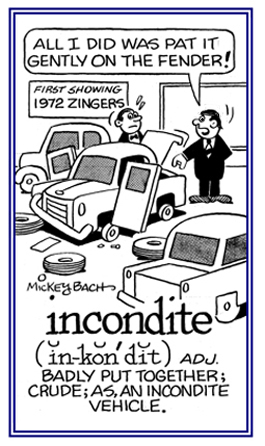 © ALL rights are reserved.
© ALL rights are reserved.
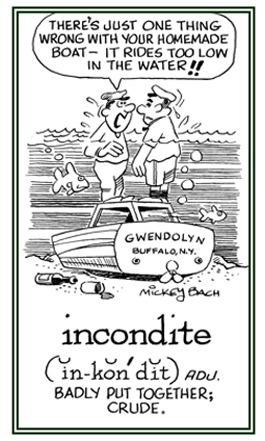 © ALL rights are reserved.
© ALL rights are reserved.
Go to this Word A Day Revisited Index
so you can see more of Mickey Bach's cartoons.
Conveying undeniable and unquestionable proof that something is correct and so it should not be challenged or doubted. (1)
Something which is necessary as a result of a responsibility or an obligation; imposed as a duty. (1)
Relating to the inability to come to a conclusion immediately and confidently. (1)
Descriptive of rudeness or shocking behavior because of being considered socially unacceptable or improper behavior. (1)
indigent
(adjective), more indigent, most indigent
Relating to people who are very poor, destitute, and in need of financial aid: While on vacation, Fred saw many homeless and
indigent men, women, and even children living on the streets, under bridges, and in the parks of the city.
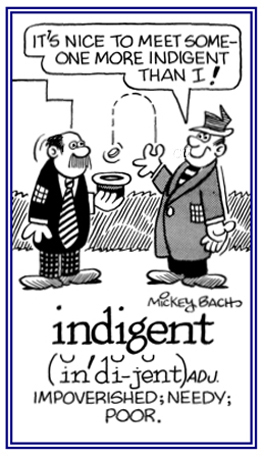 © ALL rights are reserved.
© ALL rights are reserved.
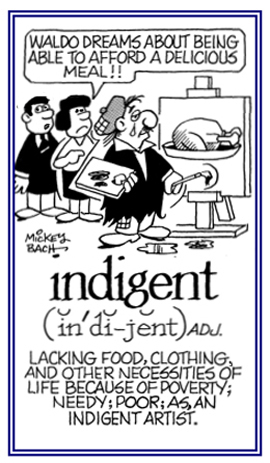 © ALL rights are reserved.
© ALL rights are reserved.
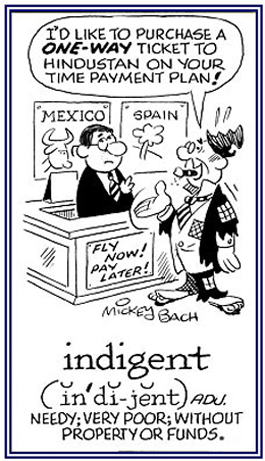 © ALL rights are reserved.
© ALL rights are reserved.
Go to this Word A Day Revisited Index
so you can see more of Mickey Bach's cartoons.
Pertaining to an expression of scorn or anger because of an ungrateful or unjustified treatment. (1)
Pertaining to something that should not be said or done because it is not acceptable or it is insulting another person. (1)
Pertaining to not feeling well; not willing or not likely to do something. (1)
Characteristic of anyone who is not easily discouraged or defeated; unyielding; unconquerable. (2)
inextricable
(adjective), more inextricable, most inextricable
A reference to something that is impossible or extremely difficult to separate because it is so closely joined or related to something else: Professor Charles argues that there is an
inextricable connection between poverty and poor health.
Sharon has an inextricable problem with her bank as she tries to untangle her financial debts.
After Bonita slipped on the banana peel and hit her head on the sidewalk, she had an inextricable problem with her memory of past events.
inextricably
(adverb), more inextricably, most inextricably
1. Descriptive of something that can't be disentangled or separated: The results of the global economic conditions are more inextricably linked to each other than it has been in the past.
2. A reference to anything that is extremely intricate or involved: The lives of people on a global scale are inextricably influenced by the weather conditions of excessive rain or droughts that are taking place now.
Relating to anything that works as it should or that has the results that are expected; a reference to not making mistakes when making decisions. (1)
infatuated
(adjective), more infatuated, most infatuated
1. Descriptive of someone being foolishly or unreasonably attracted to or in love with someone else: Thomas was completely
infatuated and enamoured with Grace and asked her to the senior prom.
2. A reference to an individual having an excessive desire or enthusiasm about doing something: After Nick went to the rock concert, he was so fascinated and
infatuated by the music that he bought all of their CDs!
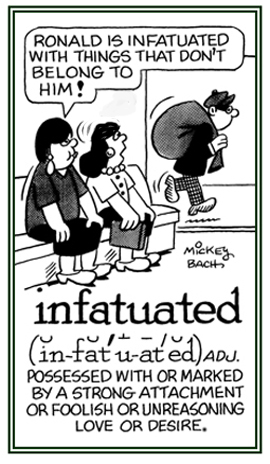 © ALL rights are reserved.
© ALL rights are reserved.
Go to this Word A Day Revisited Index
so you can see more of Mickey Bach's cartoons.
Hellish, diabolical, fiendish; awful, outrageous, and abominable. (1)
infinitesimal
(in" fin i TES uh muhl) (adjective); more infinitesimal, most infinitesimal
Descriptive of being very small in number, amount, or degree; while "infinite" means very great and seeming to have no limit.
inflammable
(in FLAM uh buhl) (adjective), more inflammable, most inflammable
Characteristic of being easily ignited and capable of burning rapidly; flammable.
Historically, flammable and inflammable meant the same thing; however, the presence of the prefix in- has misled many people into assuming that inflammable means "not flammable" or "noncombustible".
The prefix in inflammable is not, however, the Latin negative prefix in-, which is related to the English un- and appears in such words as "indecent" and "inglorious".
Instead, this in- is an intensive prefix derived from the Latin preposition in and it also appears in the word enflame, but many people are not aware of this derivation, and for clarity's sake it is advisable to use only "flammable" to give any kind of warnings about burning or catching on fire.
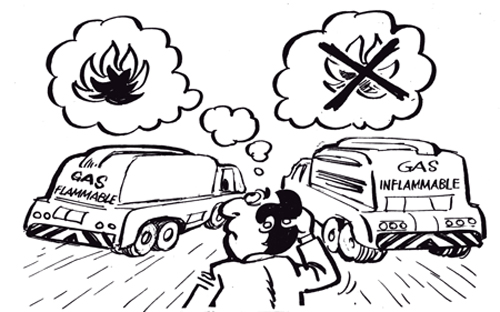
ingenuous
(in JEN yoo uhs) (adjective), more ingenuous, most ingenuous
1. Relating to showing innocence and a lack of worldly experience, cunning, guile.
2. Pertaining to being openly straightforward or frank; candid.
inimical
(i NIM i kuhl) (adjective), more inimical, most inimical
1. Injurious or likely to cause a bad effect or damage: Some people have
inimical habits that can cause an illness.
The drought has been inimical to crops this summer.
2. A reference to being unfriendly or hostile: The
inimical glare of the judge disturbed the witness and his defense attorney.
Incapable of being copied or produced in the same way; unique or one of a kind. (2)
Doing something that goes beyond what is considered usual, proper, acceptable, or normal. (2)
Pertaining to asking more questions than is proper or necessary; a reference to being too curious and prying into other people's personal lives. (1)
Pertaining to or characteristic of not being able to be understood. (3)
Referring to a lack of common sense, being irrational in one's behavior, or having no feeling regarding what is going on. (2)
Conveying a treacherous, deceitful, and crafty operation or plot for a dishonest purpose. (2)
Relating to a refusal to obey orders or to follow the instructions by an authority. (2)
A reference to a situation in which someone finds it very difficult to endure what is going on; referring to conditions or people who are too unpleasant to deal with or to accept. (1)
intercamp
(adjective), more intercamp, most intercamp
Activities done with other temporary overnight lodgers who are outdoors, typically in tents in various localities: Most intercamp sports and social activities have been canceled or postponed and hand sanitizer is everywhere because of the epidemic of the virus.
Stopping and starting at regular intervals or at irregular times. (1)
intexticated
(adjective), more intexticated, most intexticated
Describes people who drive while they are busy reading or sending text messages on their cell phones: Studies have revealed that the dangers of driving and being distracted while
intexticated can be as disastrous as, or worse than, being intoxicated.
Laura's young daughter had a car accident because she was intexticated and not paying attention to the traffic while she was driving home from work.
Pertaining to being ungovernable, unruly, or difficult to control or to manage. (2)
intriguing
(adjective), more intriguing, most intriguing
A reference to something which causes a desire to know more about what is going on: The
intriguing offer to make a significant profit from his investment made Lester very interested in proceeding with the suggestions.
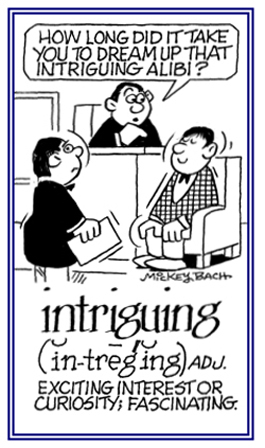 © ALL rights are reserved.
© ALL rights are reserved.
Go to this Word A Day Revisited Index
so you can see more of Mickey Bach's cartoons.
Descriptive of becoming adapted to existing situations or accustomed to something negative. (1)
Relating to animals that lack a backbone; referring to people who are spineless or irresolute; that is, unable to act or to make a decision in a firm manner. (1)
Insulting or causing bad feelings, resentment, or hatred in another person. (3)
A reference to something which promotes amicable relations that are free of hostility and are non-confrontational: After her divorce, Grace was looking for an
irenic relationship, peaceful, and harmonious.
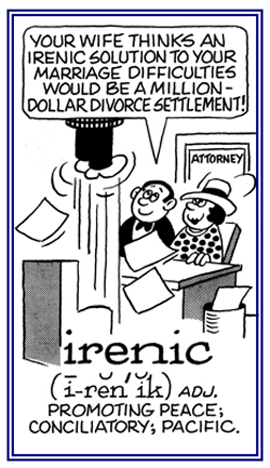 © ALL rights are reserved.
© ALL rights are reserved.
Go to this Word A Day Revisited Index
so you can see more of Mickey Bach's cartoons.
Relating to something which is contrary or the reverse of what is expected or intended. (1)
Descriptive of an inability to prove that an opinion, an argument, one's behavior, or a decision is wrong. (1)
Something that is not applicable, not important, or is inappropriate to a discussion or or situation. (1)
Characteristic of being impossible to fix, to repair, to remedy, or to improve. (1)
jaded
(JAY did) (adjective), more jaded, most jaded
1. Descriptive of something that is overused or worn out: James thought the movie dealt with the same old
jaded themes of betrayal and revenge.
2. Relating to someone who is disinterested and bored: Janice told Glenda that the Parisians are
jaded and not easily impressed by foreigners.
 © ALL rights are reserved.
© ALL rights are reserved.
Go to this Word A Day Revisited Index
so you can see more of Mickey Bach's cartoons.
A reference to something that is overused or worn out or to someone who is not interested and is bored. (1)
jet lagged
(noun), more jet lagged, most jet lagged
Descriptive of being very tired and lacking physical energy after a long flight: Walter's jet lagged sister had to recuperate and readjust to her normal life after her flight home from Canada back to Germany.
With a playful joking disposition; playfully humorous. (2)
Intended to be funny, treated as a joke, or containing humor. (3)
1. Cheerful and full of good humor.
2. Full of gladness and gaiety; mirthful. (1)
Moving up and down over and over again: It was difficult to ride in Jim's jouncy car because the shock absorbers needed to be replaced.
A reference to being being very joyful and happy. (1)
kaleidoscopic
(adjective), more kaleidoscopic, most kaleidoscopic
A reference to continually shifting from one set of relations or conditions to another one: The climate has been more kaleidoscopic in Sam's area than in other places.
1. Sharp and finely honed: The knife was old, but the blade had a keen edge.
2. Being wholehearted, eager, and enthusiastic: Lawrence and his family were keen about going to the picnic this afternoon.
3. Used to describe a discriminating, acute, and passionate attitude about something: Sharan has a keen appreciation of art works and so she goes to various exhibitions whenever she can.
knee-jerk
(adjective), more knee-jerk, most knee-jerk
Reacting automatically and without thought: The politician made a
knee-jerk reaction by using a vulgar term when a reporter asked him the same question again.
The term, knee-jerk, often has a negative connotation; such as, being too-hasty, to impulsive, and perhaps even being an irrational or unacceptable response.
Descriptive of individuals who work, complete tasks, or get things done: Most of the nation's labor positions have been significantly reduced because of the current economy.
labored
(LAY buhrd) (adjective), more labored, most labored
1. Descriptive of movement that is stiff, strained, ponderous: The old woman moved in a labored way as she went up the steps to her apartment.
2. Descriptive of something as contrived, strained, unnatural, or forced: Logan's so-called jokes were so labored that his fellow workers didn't want to hear them.
Tearful, sorrowful, causing crying or the shedding of tears. (3)
A reference to weeping because of a very sad situation that causes the tears. (1)
lackadaisical
(adjective), more lackadaisical, most lackadaisical
1. Pertaining to being without much enthusiasm, energy, or effort: Elwood's teacher said that he is a
lackadaisical pupil because he doesn't show any interest in learning.
2. Descriptive of being idle or indolent; especially, in a dreamy way: Leila was annoyingly
lackadaisical because she often just looked out the window, didn’t clean up the kitchen like her mother asked her, and she didn't complete her homework until quite late at night or not at all.
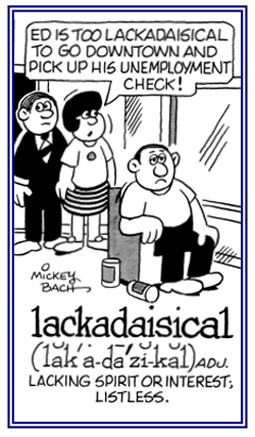 © ALL rights are reserved.
© ALL rights are reserved.
Go to this Word A Day Revisited Index
so you can see more of Mickey Bach's cartoons.
A reference to someone who is listless and without any enthusiasm, energy, or desire to do anything. (1)
lackadaisically
(adverb), more lackadaisically, most lackadaisically
Lacking spirit, liveliness, or interest: Rod and Quentin said the food at the restaurant was good enough, but they didn't appreciate the lackadaisically slow service.
lacking
(adjective), more lacking, most lacking
1. A descriptive term for inadequate qualifications: Shauna was told that she was lacking experience and training so she would be disqualified for the job she was seeking.
2. A reference to something that is necessary but which is nonexistent or completely missing: Mildred was lacking in stamina which hampered her from completing the marathon.
lackluster
(U.S.), lacklustre
(British) (adjective); more lackluster, more lacklustre; most lackluster, most lacklustre
Without excitement or interest: Kermit's
lackluster performance on the stage was a disappointment to the audience.
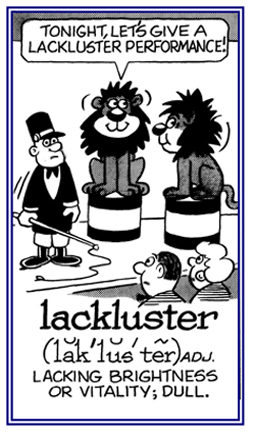 © ALL rights are reserved.
© ALL rights are reserved.
Go to this Word A Day Revisited Index
so you can see more of Mickey Bach's cartoons.
A brief and to-the-point speech or response in a message. (3)
Descriptive of shedding a lot of tears. (2)
laggard
(adjective), more laggard, most laggard
1. A reference to being reluctant and tending to get left behind: The laggard politicians couldn't get the budget put together.
2. Tending to waste time: Jim was a laggard student in that he rarely got his homework done on time because he was watching too much TV instead of doing the assignments that were given to him by his teachers.
laggardly
(adverb), more laggardly, most laggardly
Resembling that which takes more time than is necessary: Jose hates to get stuck behind laggardly slow driving motorists on the expressway when they are blocking all of the lanes; especially, when they are driving and blocking the fast lane.
laissez-faire
(adjective), more laissez-faire, most laissez-faire
1. Descriptive of noninterference with what someone or others are doing: The government is planning to adopt a policy of
laissez-faire intervention with what congress is planning to do with the new tax system.
The principal of Jim's school has a laissez-faire policy with his teachers when it comes to preparing and presenting their lessons for students.
2. Etymology: from French
laissez, "let" +
faire, "do"; "let others in trade and industry do as they will, without government controls, a policy of non interference."
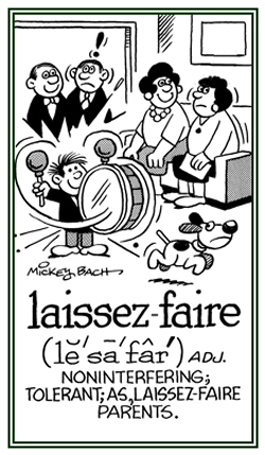 © ALL rights are reserved.
© ALL rights are reserved.
Go to this Word A Day Revisited Index
so you can see more of Mickey Bach's cartoons.
lambent
(adjective), more lambent, most lambent
1. Softly gleaming, shining, or glowing faintly, but without heat: Jan and Sam could see lambent sunlight glinting off the waves as they walked along the beach.
2. Flickering; such as, a flame over a surface without burning it: The lambent light of the aurora borealis flickered across the horizon.
3. Having a light but brilliant touch; exhibiting lightness or brilliance of wit; clever or witty without being unkind: Denis was a writer known for his lambent wit.
4. Brushing or flickering gently over a surface with low intensity: The lambent light of the stars twinkled on the surface of the lake waters.
5. Etymology: moving lightly over a surface, flickering, shimmering from 1647, borrowed from Latin lambentem, lambens, present participle of lambere, "to lick".
lambently
(adverb), more lambently, most lambently
A description of reflected or gleaming illumination: The lambently glowing light in the sky was a beautiful sight to behold.
Thievish, given to defrauding others with plans for committing thefts. (2)
laughable
(adjective), more laughable, most laughable
Regarding something that is not good because it is considered silly or foolish: The 78 year-old Earl's attempt to learn to ski was thought to be a
laughable decision by his wife.
The descriptions by the students, of what happened during the American Revolution, showed a laughable ignorance of what really took place.
laughably
(adverb), more laughably, most laughably
In an amused way: For such a big man, Roy was driving a laughably small vehicle.
Descriptive of being very generous or providing great amounts of something. (1)
lecherous
(adjective), more lecherous, most lecherous
Having or showing an excessive or disgusting behavior regarding sexual matters: The
lecherous behavior of the young boy no doubt was an extension of the immoral influences he was experiencing in his family.
Sam's lecherous and lewd behavior in class resulted in his being sent to the principal's office for disciplinary action.
lecherously
(adverb), more lecherously, most lecherously
A reference to unrestrained sexual craving: The way Alan was lecherously looking around at women on the bus was disturbing both women and men who noticed his disgusting behavior.
Using or
interlarded (click for explanation) with pretentious words or describing someone who is only interested in impressing other people with his or her undeserved claim of importance. (2)
limpidly
(adverb), more limpidly, most limpidly
Relating to a lucidly and clear way.
livable
(adjective), more livable, most livable
1. Suitable as a place for habitation: After the floods, Vincent's house was barely a livable place.
2. Referring to the establishment of and for maintaining an adequate existence by having what is needed to physically survive: People everywhere need jobs that will pay livable wages.
1. Charged or energized with electricity: Be careful and don't touch that
live wire.
2. Not imaginary, but actually existing and done in front of an audience; such as a play, a concert, etc. which is performed in front of people: The play had
live music which made the drama more interesting.
The TV program provided live coverage of the political debate.
People thought the soldiers were using harmless blanks; however, they were shooting live bullets.
live
(adverb), more live, most live
During, from, or at the actual time when something happens; such as, a performance, an event, etc.: The students are listening to the
live playing of music that is being performed by a trio of musicians in the school auditorium.
There was a live recording of final piano recital of Lynn’s mother during the performance.
livid
(LIV id) (adjective), more livid, most livid
1. Descriptive of something that is a dark purplish color, or bruised black and blue: Kendrick's arm had a livid bruise where he fell against the tree.
2. To describe an appearance or a mood; such as, angry, furious, hugely disturbed: Virgie's insulting remark made Roscoe livid.
3. Etymology: from Middle French livide and directly from Latin lividus, "of a bluish color, black and blue".
1. A reference to something that has certain contents: Richard had a
loaded gun so he could practice shooting at a target.
Sam used loaded dice when he was playing a board game.
2. Having a large amount of what is wanted or considered necessary: The
loaded soccer team had as many good players as the coach could include for the championship game.
loathingly
(adjective), more loathingly, most loathingly
Relating to negative opinions about certain situations: Some citizens are loathingly concerned about public officials who are corrupt and dishonest.
This entry is located in the following unit:
loth-
(page 1)
loathsome
(adjective), more loathsome, most loathsome
Descriptive of something that is very offensive, sickening, and abominable: The official of the country claimed to have a
loathsome or negative feeling about accepting bribes; however, he took them anyway.
 © ALL rights are reserved.
© ALL rights are reserved.
Go to this Word A Day Revisited Index
so you can see more of Mickey Bach's cartoons.
This entry is located in the following unit:
loth-
(page 1)
Lose/Loose, Use and Abuse; More about [sic] from the Last Newsletter
I probably should have been more precise with my discussion about “lose” and the [sic] example of “loose”. Whenever we mean that something has been lost, we should NEVER say, “I loose the hounds” or “I loosened the hounds” OR “The quarter back loosed his grip on the football” when LOST is meant!
The [sic] misuses are when people replace “lose” with “loose”. Again, I should have written, “... we NEVER ‘loose’ anything when ‘to lose’ is meant! They are two different verbs with different meanings and should not be confused. It’s certainly correct to say, “I let the dogs loose so they could run around (for example).” I maintain that it is unacceptable to say, “I loosed the dogs and I don’t know where they are” when “I lost the dogs .... ” is meant. Does this clarify the point?
I do appreciate the comments from readers. If nothing else, they make me aware that I must be more precise and probably should not have sent the letter out when I was so tired. It was after 2:30 a.m. (where I am) when I submitted the letter to the web and I wanted to get it out to see if it would go out properly (over the internet, that is).
For those who wrote, thank you. It means you’re paying attention and that’s better than being ignored. This reminds me of something I read recently about the “conspiracy of silence”. The phrase was coined by Sir Lewis Morris, a minor poet of the Victorian era. He wanted to be Poet Laureate in England but he never gained this honor. He claimed that critics were jealous of him and, as a result, damned his poetry when they bothered to mention it at all. He once complained at length to Oscar Wilde of this treatment, finally saying: “Oscar, there’s a conspiracy of silence against me. What shall I do?” Wilde replied simply: “Join it!”
Lucullan,
(looh KUHL uhn), Lucullean
(looh kuh LEE uhn) (adjective); more Lucullan, more Lucullean; most Lucullan, most Lucullean
1. Descriptive of a meal that is very lavish and luxurious, an elegant meal that is "fit for the gods": To celebrate the end of the football season, Eleanor prepared a
Lucullan feast for her husband and her sons, all of whom were avid couch potato football fans.
2. Etymology: This special Lucullan reference is derived from Lucius Licinius Lucullus (about 110-57 B.C.), a Roman general and politician who dedicated his later years to a very rich and elegant life with special emphasis on gourmet food and drinks of the highest degree of elegance or luxuriousness.
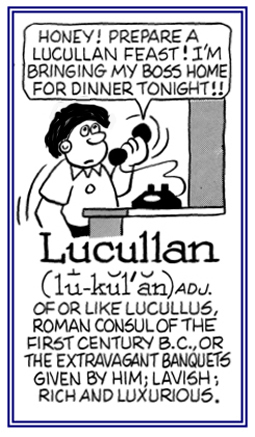 © ALL rights are reserved.
© ALL rights are reserved.
Go to this Word A Day Revisited Index
so you can see more of Mickey Bach's cartoons.
Conveying an extravagant banquet or meals named after Lucullan, a Roman counsel, who provided lavish and gourmet food and drinks for his guests. (1)
1. A reference to being shocking, terrible and horrifying: Jerome described the auto accident with
lurid details.
2. Descriptive of something that is appalling and ghastly: The newspaper told about
lurid crimes that were happening in the city and the communities nearby.
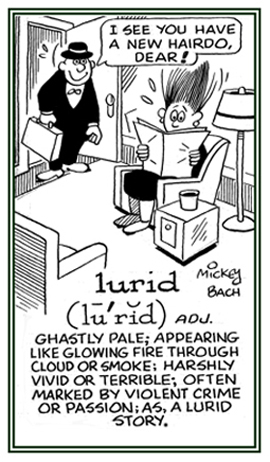 © ALL rights are reserved.
© ALL rights are reserved.
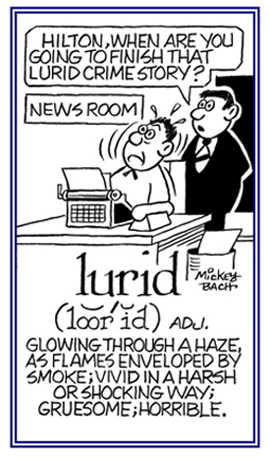 © ALL rights are reserved.
© ALL rights are reserved.
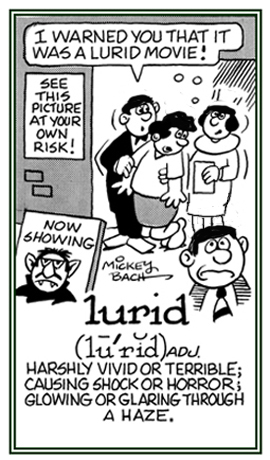 © ALL rights are reserved.
© ALL rights are reserved.
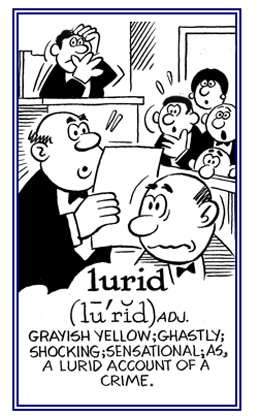 © ALL rights are reserved.
© ALL rights are reserved.
Go to this Word A Day Revisited Index
so you can see more of Mickey Bach's cartoons.
macabre
(muh KAH bruh, muh KAHB ruh, muhj KAH ber) (adjective), more macabre, most macabre
1. Descriptive of something or someone that is ghastly, gruesome, and horrible: The
macabre story shown on TV about headless ghosts frightened Irene's children very much.
2. Etymology: from Old French
danse macabre, "dance of death"; literally, "dance of the Maccabees". There is much that is
macabre in the tale of the Maccabees.
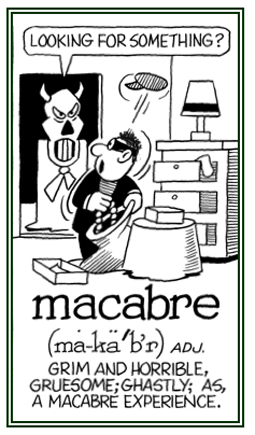 © ALL rights are reserved.
© ALL rights are reserved.
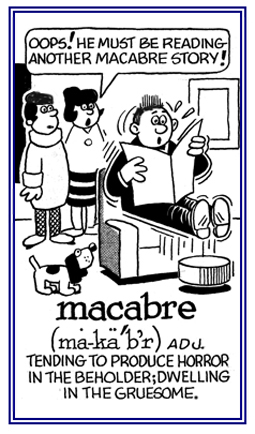 © ALL rights are reserved.
© ALL rights are reserved.
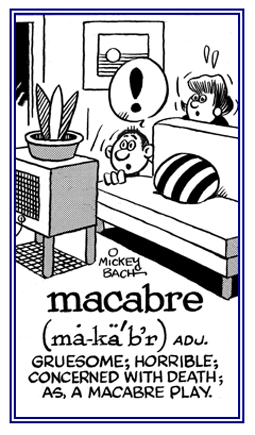 © ALL rights are reserved.
© ALL rights are reserved.
Go to this Word A Day Revisited Index
so you can see more of Mickey Bach's cartoons.
A reference to something or someone that is repulsive, hideous, frightful, and terrifying. (3)
macabrely
(adverb), more macabrely, most macabrely
1. In a manner that is horrible, gruesome, and to an extreme: The teacher macabrely told tales of wars and plagues which occurred in the Middle Ages.
2. Pertaining to grotesque and horrific details of death and decay: The tornadoes macabrely created devastation for many areas.
3. Constituting or including a representation of death; spine-chilling, repulsive, or ghastly: The book macabrely described the "criminal history of mankind".
Machiavellian
(mak" ee uh VEL ee uhn) (adjective), more Machiavellian, most Machiavellian
1. Characterized as subtle, unscrupulous, self-serving, and dishonest: The prime minister has a
Machiavellian scheme to be appointed as the young king's guardian.
In his Machiavellian view, it is suggested that a prince should be concerned only with power and be bound only by rules that would lead to success in political activities.
As an Italian historian, statesman, and political philosopher; Machiavelli's amoral and Machiavellian writings about political actions have resulted in his name being a synonym for "cunning" and "duplicity".
2. Etymology: from the name of the Florentine diplomat Niccolò Machiavelli (1469-1527) whose book,
The Prince, outlined ruthless ways to get and to keep political power.
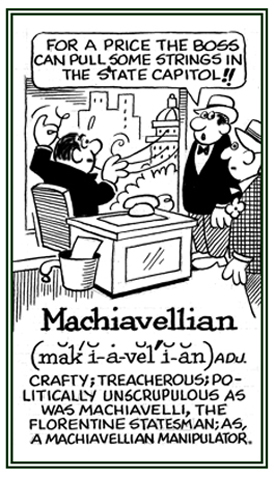 © ALL rights are reserved.
© ALL rights are reserved.
Go to this Word A Day Revisited Index
so you can see more of Mickey Bach's cartoons.
Descriptive of someone who is self-serving, crafty, and a political manipulator. (1)
madly
(adverb), more madly, most madly
1. To an extreme or excessive degree: The madly ambitious writer almost became seriously ill from his excessive dedication.
2. In an insane manner or action: People were greatly disturbed as the man pulled out a knife and started madly waving it around in a threatening way.
maestoso
(adjective), more maestoso, most maestoso
Playing music with beauty and quality: The conductor of the orchestra raised her baton and indicated to the players to perform in a maestoso manner.
maestoso
(adverb), more maestoso, most maestoso
Relating to the majestic or magnificent way music is to be played: The orchestra had to practice the second movement again because the conductor wanted it played maestoso, with a lot of feeling of greatness, and not just legato or smoothly, without any noticeable breaks between the notes.
A reference to someone who is behaving in a bold, rude, discourteous, or disrespectful way. (2)
In an awkward or out of place manner; relating to an inappropriate presentation. (1)
Descriptive of being malicious, producing evil, or causing harm. (1)
A reference to a person or agencies which are working to harm others or to commit criminal acts. (1)
Characterized by wishing evil or harm to another person or other people. (3)
Acts of ill-will or viciousness toward others all of which are influenced by hate or spite. (4)
1. Characterized by being fashioned, easily changed, or influenced to do something.
2. A reference to something that can be shaped by being beaten or pressured into a form; such as, some metals including silver, gold, platinum, etc. (2)
A reference to something that has a terrible odor or an excessive stink. (2)
Relating to, consisting of, resembling, or having a large quantity of loose and crumbling earthy deposits: The marly fertilizers that the farmers were spreading in the fields consisted of sand, silt, or clay and a substantial amount of calcium carbonate.
martial
(adjective), more martial, most martial
1. Characteristic of war, soldiers, and aggressive warlike behavior: The town was under
martial law.
2. Associated with the military or armed forces: The country maintains a
martial or warlike attitude toward its neighbors.
3. Soldier-like in behavior, bearing, etc.: The old veteran had a
martial attitude.
Mr. Brown's martial uniform makes him look older than he really is.
4. Etymology:
Martial literally means "pertaining to Mars", the Roman god of war.
Martial may refer to anything related to a soldier, like a military uniform, or it can refer to someone who is antagonistic and warlike.
If Martial Law is declared in a country, it means that the military has taken control of that country.
Martial Arts refers to any of several fighting styles that include specified methods of training for combat, armed and unarmed; and it is performed as a sport, including boxing, karate, judo, etc.
Wonderful, extremely good, enjoyable, and very surprising. (1)
massive
(adjective), more massive, most massive
1. Pertaining to a large mass; bulky, heavy, and solid: Kay bought a
massive piece of furniture for her apartment.
2. A reference something which is large or imposing, as in quantity, scope, degree, intensity, or scale: The military unit must be reinforced by the further deterrent of
massive retaliatory power.
3. Relating to something which is considerably large in comparison with the usual amount: The doctor gave Sharon a
massive dose of medication as a painkiller for the injury she suffered when she fell on the slippery steps.
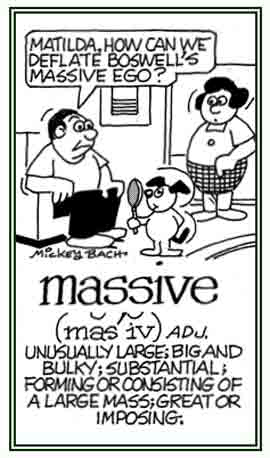 © ALL rights are reserved.
© ALL rights are reserved.
Go to this Word A Day Revisited Index
so you can see more of Mickey Bach's cartoons.
maudlin
(adjective), more maudlin, most maudlin
1. Relating to a condition of being overly tearful or effusively sentimental; especially, because of drinking alcohol: Manual was expressing an excessive
maudlin emotion in a foolish and annoying way when he met his former girl friend at Jim's birthday party.
2. Etymology:
Maudlin is the English development of an alteration of the second name of Mary Magdalene, who was often shown in medieval art as a tearful repentant sinner, or reformed prostitute, who was forgiven by Jesus as indicated in the Bible at Luke vii:37-38.
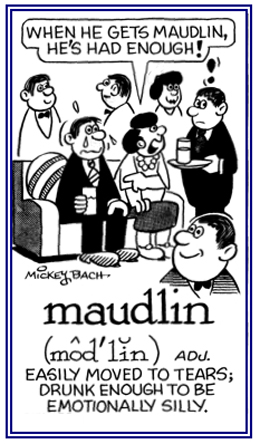 © ALL rights are reserved.
© ALL rights are reserved.
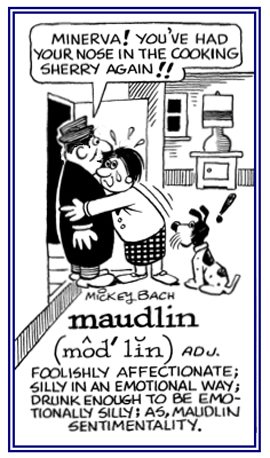 © ALL rights are reserved.
© ALL rights are reserved.
Go to this Word A Day Revisited Index
so you can see more of Mickey Bach's cartoons.
maudlinly
(adverb), more maudlinly, most maudlinly
Conveying
maudlinly
(adverb), more maudlinly, most maudlinly
Conveying great sorrow, disappointment, and grief: Even though the politician who was running for office was leading in the pre-election, his rival won by a small amount and he and is wife were maudlinly suffering in misery and agony.
mawkish
(adjective), more mawkish, most mawkish
1. A reference to being objectionably and excessively sentimental: Jerome made such
mawkish compliments that those who heard his phony statements got sick to their stomachs.
2. Etymology: from a Middle English word meaning "maggot"; originally, it meant "nauseated" or "sickly".
Mawkish evolved to mean that which is so overly emotional that it makes people "sick" to hear it.
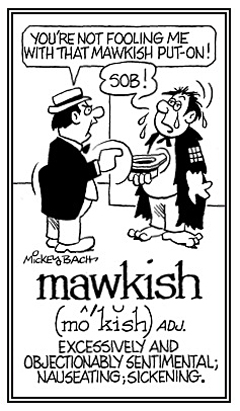 © ALL rights are reserved.
© ALL rights are reserved.
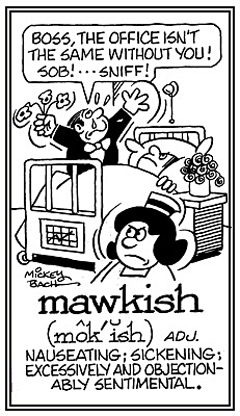 © ALL rights are reserved.
© ALL rights are reserved.
Go to this Word A Day Revisited Index
so you can see more of Mickey Bach's illustrations.
A descriptive term for being overly sentimental or too emotional; usually, in a false manner. (2)
Pertaining to not having enough of something or having very little: Beatrice arrived in the foreign country with a
meager knowledge of the language, but she has been learning more words every day.
Too many people are having problems surviving on the meager wages that they receive these days.
mealy-mouthed
(adjective), more mealy-mouthed, most mealy-mouthed
A reference to anybody who is not willing to tell the truth in clear and simple language or not being plain and straightforward during conversations: Politicians are not the only
mealy-mouthed people we must put up with; for example, there are some
mealy-mouthed financial advisors that all of us should be aware of, too.
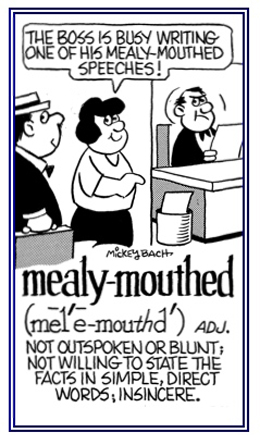 © ALL rights are reserved.
© ALL rights are reserved.
Go to this Word A Day Revisited Index
so you can see more of Mickey Bach's cartoons.
Relating to someone who is not truthful, or who lies and makes false statements; characterized by, deceptions or falsehoods. (2)
1. Nothing but; nothing more nor better than what is mentioned or specified; only: After slipping on the ice, she escaped with a
mere scratch.
The mere mention of the monster in the film filled the children with terror.
Mere and "bare" are often used interchangeably, the difference being that "bare" is more often thought of in a positive sense: He "barely" escaped with his life.
Mere tends to be negative, suggesting that something is lacking: He is merely a clerk in the company.
2. Etymology: from Middle English by way of Latin
merus, "pure, unmixed".
meretricious
(mer" i TRISH uhs) (adjective), more meretricious, most meretricious
1. Pertaining to being showily but falsely attractive: The advertisement used for the car was meretricious, a lot o flash, but very deceptive.
2. A reference to being based on pretense; deceptively pleasing: In old novels, the villain frequently uses meretricious compliments to seduce the innocent heroine.
Pertaining to being overly precise, extremely careful, and excessively concerned with details. (3)
A reference to having or showing a strong desire to use forceful methods to accomplish something or to support an objective, sometimes to the point of being overly aggressive. (3)
mirthful
(MURTH fuhl) (adjective), more mirthful, most mirthful
Descriptive of being happy and joyful: The father of the
mirthful baby had a picture taken to show his friends and relatives how sweet and lovable his little boy is.
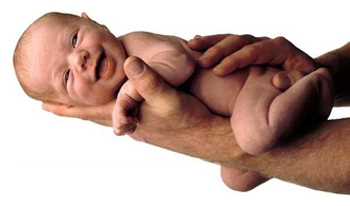
This cartoon illustrates a mirthful character who is showing his happiness.
 © ALL rights are reserved.
© ALL rights are reserved.
Go to this Word A Day Revisited Index
so you can see more of Mickey Bach's cartoons.
This entry is located in the following unit:
mirth-
(page 1)
mirthfully
(adverb), more mirthfully, most mirthfully
Conveying comical or laugh-provoking results: Ted's impersonation of his fellow singers was a source of
mirthfully humorous amusement for his fellow entertainers.

This entry is located in the following unit:
mirth-
(page 1)
mirthless
(MURTH lis) (adjective), more mirthless, most mirthless
A reference to sadness, or being without merriment, happiness, or gaiety: A
mirthless smile or laugh expresses negative feelings; such as, anger, depressions, or grief.
Attending the comedian's funeral was a mirthless occasion for his family, friends, and those who enjoyed his presentations on TV and in movies.
This entry is located in the following unit:
mirth-
(page 1)
mirthlessly
(adverb), more mirthlessly, most mirthlessly
Descriptive of being without joy or happiness: Frank was
mirthlessly disappointed that his girl friend didn't what to see him anymore.

This entry is located in the following unit:
mirth-
(page 1)
Conveying a bitterness or hostility and prejudice against being around anyone who smokes. (1)
A reference to anyone who despises military battles and anyone who is involved with such activities. (1)
Descriptive of something that is extremely shocking, huge, or outrageous. (1)
Relating to something that is huge, very impressive, or very significant. (1)
moot
(MOOT) (adjective), more moot, most moot
1. Descriptive of something that is debatable, not certain, questionable, or is totally insignificant: During a lecture, a student asked the professor a
moot question regarding what was on the last test, which the other students considered to be inappropriate at that time.
When it started to rain, it became a moot decision as to where Jim and his family would have their picnic .
2. Etymology: originally in Anglo Saxon days, a
moot point was one which was talked about at a "meeting" because "meeting" is the original sense of the noun
moot, a town meeting for purposes of debating and discussing issues.
Compiled from information provided by John Ayto
in the Dictionary of Word Origins; Arcade Publishing;
New York; 1990; page 354.
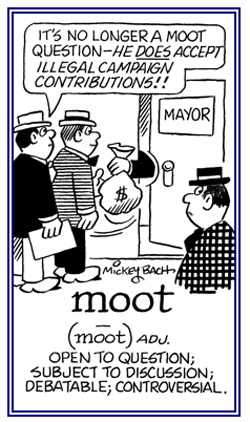 © ALL rights are reserved.
© ALL rights are reserved.
Go to this Word A Day Revisited Index
so you can see more of Mickey Bach's cartoons.
A reference to an issue that is debatable, uncertain, or questionable. (1)
More Denglish
Another article about “Denglish” this one from the Berlin Journal which has a Copyright of 1998, of The New York Times Company and was written on December 6, 1998. Sent in by Douglas B. in Berlin.
The same article also appeared in the International Herald Tribune, on December 7, 1998, with the title, “Germany
Debates ‘Denglisch’ ”
Some parts of the article from the Journal include the following (partly edited to make it shorter):
“Berlin Has a Word for Its Ambitions: English” by Roger Cohen.
The fight to be the leading newspaper of the city with ambitions to be Europe’s new
capital is a ferocious one, so when executives at the Berliner Morgenpost sat down recently to dream up a new advertising slogan, they thought long and hard. What they came up with was:“Simply the Best.”
Not “Einfach besser,” German for the same idea, but “Simply the Best,” as in Tina Turner’s popular song. “ Our target group was young people,” said Rolf Buer, the paper’s marketing manager, “and this slogan was young, fresh, simple and sure to get people talking. German words are just too long.”
That may seem an unjust accusation to level at “Einfach besser,” but it is true that if precision is a hallmark of the German vocabulary, brevity is not. In any event, the issue is clearly a broader one, for the English encroachment on Deutsch has assumed epic proportions, giving rise to a form of speech widely known as “Denglisch.”
Consider this city, whose passion for reinventing itself is very much of the New World. As you drive past posters advertising Volkswagen’s “New Beetle” (not “Der neue Kafer”), you may hear a radio advertisement for an Audi that gives you “die power,” only to see a newspaper headline about Germany’s lack of “jobs” (forget “arbeit”), as the radio turns to a discussion of Berliners’ growing attraction for “the American way of life.”
English, of course, is advancing everywhere, propelled by the Internet and the dominance of American popular culture. It is the most widely studied foreign language in German schools, where most children start learning it at age 11. Its advance appears particularly marked here, strong enough to set off a debate on what it is to be a German.
“I don’t like to think in terms of national borders,” said Ulrich Veigel, head of the Bates advertising agency in Germany. “I live in Germany, and was born here, but I’m a citizen of the world, and that is the way we should all think. In the medium-term, nationalities have no chance.”
English, Veigel continued, is a wonderful language precisely because it is the most cosmopolitan. “I look forward to the day,” he said, “when I go to France and do not have to speak French.”
Until that day -- some way off if the Academie Francaise has anything to do with it -- Veigel will be pushing his message in Germany, where the Bates agency is responsible for the current campaign of the cargo division of the national airline, Lufthansa. Slogan: “Thinking in new directions.” It is also promoting a new German telephone company called “First Telecom” with the jingle “You can’t beat the First.”
Such catchwords clearly reflect a perception that Germans see English as more contemporary or modish. “New Beetle sounds more hip than neue Kafer,” said Sabina Metzner of Volkswagen. “We wanted to make clear that the Beetle might have some resemblances to the old Kafer, but it is very much a modern car.”
The Social Democrat Gerhard Schroeder, devoted much of a recent summit meeting with French leaders to the issue of defending “Franco-German culture” against the cultural pull of America through the establishment of a new Franco-German university in Saarbrucken and other measures.
Of course, France and Germany have a basic problem: the unfettered, dynamic, creative culture of California is more attractive to many young people than European societies often identified with high unemployment and rigidity.
“The young want to hear English,“ said Buer of the Berliner Morgenpost. “It’s seen as free and flexible.”
Besides, he noted, if the Berliner Morgenpost had chosen “Einfach besser” instead of “Simply the Best” as a slogan, it might have violated the German law known as the “Unzulassige Alleinstellung,” which forbids sweeping assertions of superiority in advertising.
“We would have had to answer a lot of questions,” Buer said. “Better than who? Better than what? Why better? Better in what precise respect? It was just too much bother, whereas in English we could do what we wanted.”
Copyright 1998 The New York Times Company
A term that describes the kind of tool which is used for cutting grass, hay, etc.: The farmer was busy with his
mowing machine cutting the alfalfa that he will use to feed his cattle during the winter.
Another farmer was using his mowing equipment first to reap his wheat and then his oats.
mugwumpish
(adjective), more mugwumpish, most mugwumpish
To be like or to resemble an uncommitted or undecided person: "Jack acted in a most mugwumpish manner when he refused to state his opinion on the pressing issue of prostitution in the city."
Including several or many things, people, or parts. (1)
Consisting of or descriptive of a very great, but indefinite number; innumerable. (2)
nagging
(adjective), more nagging, most nagging
A reference to being bothered or upset: Joyce told her doctor that she still has a few nagging pains that won't go away and can anything be done to stop them?
nerve-racking
(adjective), more nerve-racking, most nerve-racking
A description of a situation which is intensely irritating or distressing and causes a person to lose his or her patience: Waiting in the line for more than an hour to go up the CN Tower in Toronto was tiresome,
nerve-racking and exasperating.
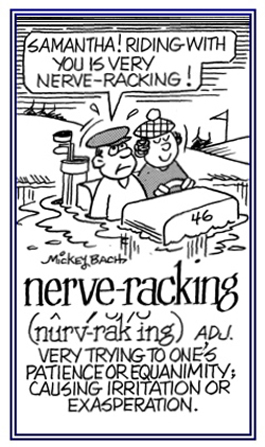 © ALL rights are reserved.
© ALL rights are reserved.
Go to this Word A Day Revisited Index
so you can see more of Mickey Bach's cartoons.
nimble
(NIM buhl) (adjective), more nimble, most nimble
1. Descriptive of someone who is spry, brisk, or skillful: Henry showed how
nimble he was during the football game when he was able to avoid all of the tacklers and make a touchdown.
2. Clever, proficient, or fast thinking: Marla was considered one of the most
nimble-minded students in school because she almost always came up with good answers faster than the others.
 © ALL rights are reserved.
© ALL rights are reserved.
Go to this Word A Day Revisited Index
so you can see more of Mickey Bach's cartoons.
nimbly
(adverb), more nimbly, most nimbly
In an agile manner; with quickness, lightness, and ease: Melba ran nimbly up the stairs after she returned home from school.
Descriptive of people or organizations that resist unwanted development; such as, manufacturing plants, prisons, power companies, or chemical companies in his or her own neighborhood or town: Although many British are overwhelmingly pro-wind, too many have a nimby attitude against putting any wind turbines in their areas.
nimbyfying
(adjective), more nimbyfying, most nimbyfying
A descriptive term for attitudes, people, or organizations that object to a variety of new construction activities close to them, but still advocate such improvements for other areas: The commentator wrote that we are living in a nimbyfying world where "idealism abounds" but with stronger self-centered concerns than for the greater good.
noisome
(NOI suhm) (adjective), more noisome, most noisome
1. Pertaining to being offensive to the point of arousing disgust; foul: There was a noisome odor from the garbage container.
2. Descriptive of a harmful or dangerous condition or situation: The noisome fumes from the container could cause serious harm to those who are living in the house.
Descriptive of someone who is being calm, indifferent and unconcerned about what is going on around him or her. (3)
Characteristic of being very foolish, ludicrous, ridiculous, or absurd. (1)
Unimportant or not worth anything. (2)
Of little value or worthless. (2)
1. Obstinately or stubbornly pursing a purpose despite the appeals made by another person or other people to stop.
2. Unyielding in feeling or persuasion. (3)
A reference to anyone who is overly obedient or who is too willing to comply with the wishes of another person; relating to someone who is too eager to help or to obey those who are important or who are very popular. (2)
A reference to someone who is stubborn, bullheaded, or determined to have his or her personal way of doing things. (1)
1. Slow to understand or to perceive something.
2. Lacking fast perception or intellect. (3)
Pertaining to supernatural or magical activities or powers; a reference to something which is beyond the understanding of most people. (2)
Volunteering services when they are neither asked for nor needed; intruding and interfering with suggestions or actions that are not wanted and are unnecessary. (3)
off-key
(adjective), more off-key, most off-key
1. Not in tune because the tones are above or below the proper pitch: Some of the musical notes during the concert were slightly
off-key, which produced unharmonious results.
2. Behavior that deviates from what is considered to be normal or proper: Jan's neighbor had
off-key activities which disturbed others who lived near him because he played his recorded music very loudly or had the volume on his TV blasting so much that people could not enjoy listening to their own TVs or were unable to go to sleep while he was continuing his
off-key activities.
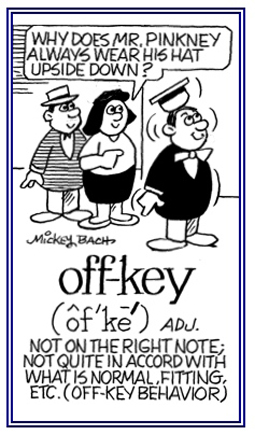 © ALL rights are reserved.
© ALL rights are reserved.
Go to this Word A Day Revisited Index
so you can see more of Mickey Bach's cartoons.
Not in tune because some of the musical notes are above or below the proper pitch; behavior that deviates from what is considered to be normal or proper. (1)
Involving troublesome obligations that are more disadvantageous than advantageous; descriptive of a heavy load that is imposed by something irksome or annoying. (2)
Relating to something that comes at a good time to achieve a particular objective. (1)
painful
(adjective), more painful, most painful
Relating to hurting or causing misery: Someone is apparently causing a painful agony by squeezing the pumpkin's face.
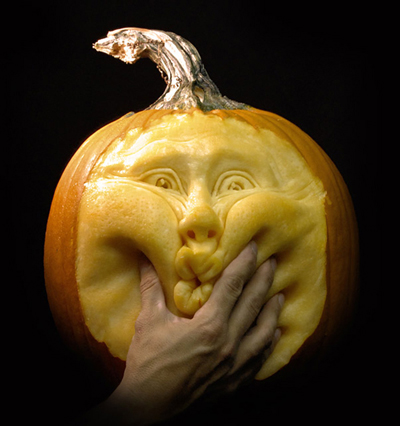
Descriptive of something that is obvious or easily perceived and understood. (3)
1. Characterized with uncertainty, danger, or risk.
2. Mischievous; so, keen and shrewd. (4)
parsimonious
(adjective), more parsimonious, most parsimonious
1. A reference to being very unwilling to spend money: Susan was a very
parsimonious shopper; especially, since her retirement restricted her income.
2. Descriptive of being frugal and thrifty: Because the elderly couple was
parsimonious, they did not need to ask for financial aid from their children or other relatives.
3. Etymology: from Latin
parcimonia, from
parcere, "to spare" +
–ous, "having the quality of".
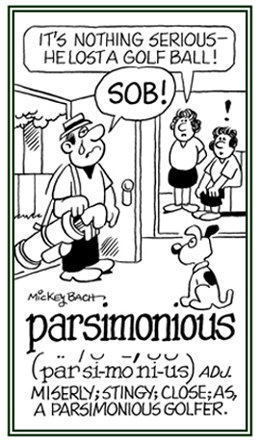 © ALL rights are reserved.
© ALL rights are reserved.
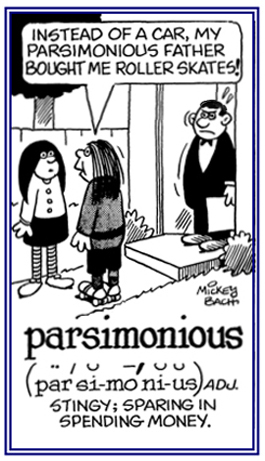 © ALL rights are reserved.
© ALL rights are reserved.
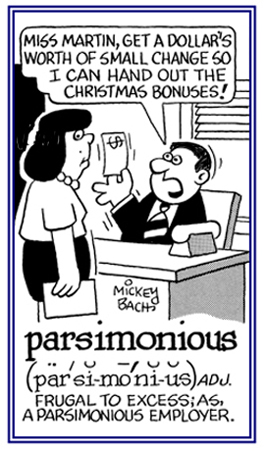 © ALL rights are reserved.
© ALL rights are reserved.
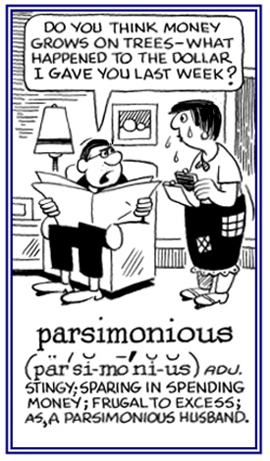 © ALL rights are reserved.
© ALL rights are reserved.
Go to this Word A Day Revisited Index
so you can see more of Mickey Bach's cartoons.
passé, passe
(adjective); more passé, more passe; most passé, most passe
1. Pertaining to being no longer current or in fashion: The kind of musical presentations that were played years ago are now considered to be
passé renditions now.
2. Etymology: from the French verb
passer, "to pass"; so, it literally means "passed".
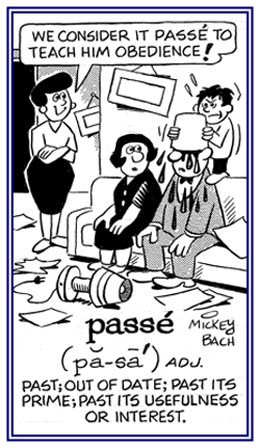 © ALL rights are reserved.
© ALL rights are reserved.
Go to this Word A Day Revisited Index
so you can see more of Mickey Bach's cartoons.
Conveying a compulsive illness or mental problem which is not normal. (1)
Relating to committing villainous or objectionable activities. (1)
Consisting of or given or exacted in money or monetary payments; with reference to a crime, violation, etc. involving a fine or penalty of money. (2)
Superb, matchless, unrivaled, and having no equal in skill or talent. (1)
peevish
(adjective), more peevish, most peevish
1. Relating to a person who feels cross, fretful, or who complains: Jenifer's young girl was a
peevish child when she was told it was time to go to bed when there were visitors in the evening.
2. A reference to someone who is irritable, grouchy, or cranky: Michael's mother gets
peevish when she is kept waiting for him to get dressed for school so he can catch the bus on time.
3. Etymology: from Latin
perversus, "turned the wrong way, distorted, perverse" from
pervertere, "to turn around".
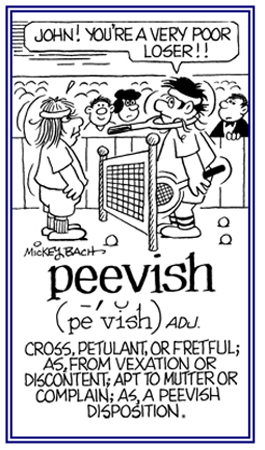 © ALL rights are reserved.
© ALL rights are reserved.
Go to this Word A Day Revisited Index
so you can see more of Mickey Bach's cartoons.
pelagic
(adjective), more pelagic, most pelagic
1. Referring to the fish and animals that live in the open sea far from the shore:
Palagic areas are related to creatures that exist in the expansive bodies of salt water that covers almost three fourths of the earth's surface rather than areas which are adjacent to land or inland rivers or streams.
2. Relating to the ocean or the open sea:
Pelagic habitats differ depending on the water depth in the aquatic areas.
3. Etymology: from Greek
pelagikos, from
pelagos, "the sea".
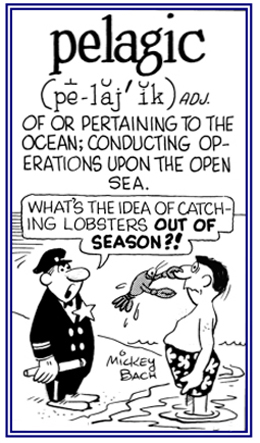 © ALL rights are reserved.
© ALL rights are reserved.
Go to this Word A Day Revisited Index
so you can see more of Mickey Bach's cartoons.
A reference to being very quiet and thoughtful about something that is serious or sad. (2)
pent-up
(adjective), more pent-up, most pent-up
1. A reference to emotions or forces which are held or kept inside and not released: Tom's family was full of
pent-up energy after the long trip to visit his mother and father.
Tim's supervisor was in pent-up anger and frustration when he saw the loss of profits for his company that happened during the past month.
2. Relating to feelings being confined or repressed: When Jill fell down and hurt her knee, she had
pent-up emotions and did not cry at first.
3. Etymology: from Latin
penna, "feather" and from Old French
penne, "feather".
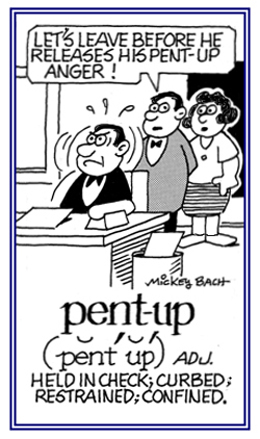 © ALL rights are reserved.
© ALL rights are reserved.
Go to this Word A Day Revisited Index
so you can see more of Mickey Bach's cartoons.
penurious
(adjective), more penurious, most penurious
1. A reference to the condition of being miserly or extremely destitute and poor: The old man next door to Tom died a
penurious wretch.
There are many "street people" in cities who live penurious lives in alleyways, or places without protections from weather conditions, etc.
2. Etymology: from French
pénurie or borrowed from Latin
penuria, "need, scarcity".
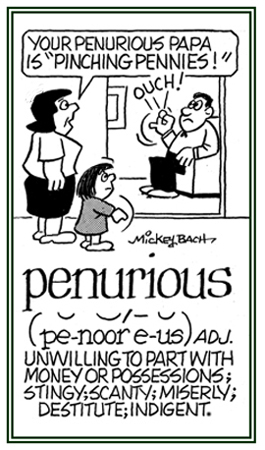 © ALL rights are reserved.
© ALL rights are reserved.
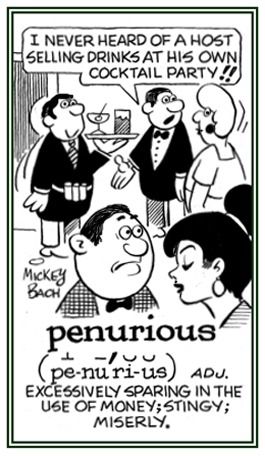 © ALL rights are reserved.
© ALL rights are reserved.
Go to this Word A Day Revisited Index
so you can see more of Mickey Bach's cartoons.
Referring to someone who is disloyal and treacherous even though he or she is supposed to be a trusted friend. (2)
A reference to causing great harm, destruction, or death; name calling. (4)
Full of doubt or puzzlement; anything that is hard to understand or which is confusing and bewildering. (1)
Stubbornly determined to continue doing something despite any problems or difficulties. (1)
persnickety
(adjective), more persnickety, most persnickety
1. A reference to someone who gives a great deal of attention to details that are minor or not important: George had a
persnickety teacher who required her students to follow instructions exactly as she had given them to the classes.
2. Relating to a person who places too much emphasis on trivial or minor things: Patricia has a very
persnickety or fussy attitude about the way her meals are prepared.
3. Etymology: from American English, 1905; "overly fastidious, fussy".
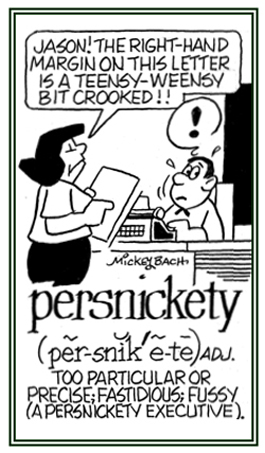 © ALL rights are reserved.
© ALL rights are reserved.
Go to this Word A Day Revisited Index
so you can see more of Mickey Bach's cartoons.
Descriptive of doing something wrong or unacceptable and not doing what is considered proper as far as what other people think. (1)
Descriptive of someone who is obstinate or not willing to be reasonable and to change his or her ideas, plans, or behavior. (1)
1. A reference to a person or an object that is of small stature or size, little: Ann is a
petite woman who is slim and vivacious.
The clothing store has dresses and other clothing in petite sizes besides those for women who do not have petite bodies.
2. Etymology: from French,
petit, "small."
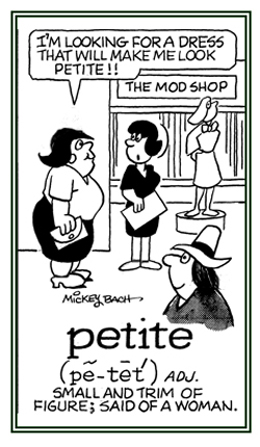 © ALL rights are reserved.
© ALL rights are reserved.
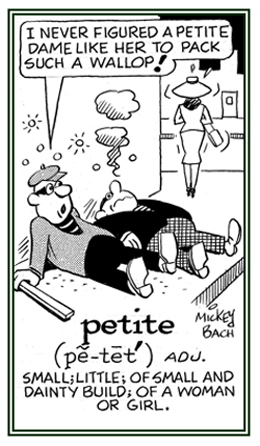 © ALL rights are reserved.
© ALL rights are reserved.
Go to this Word A Day Revisited Index
so you can see more of Mickey Bach's cartoons.
A person who is described as someone who observes the formalities of a religion, but who neglects the spirit of his or her religious beliefs; hypocritical. (1)
Characteristic of being unselfish, considerate of, and compassionate for others who are in need of help. (2)
Pertaining to having many offspring and loving all of them very much and other children as well. (1)
Relating to being calm and rational even during a very difficult situation. (1)
Descriptive of someone who loves and displays affections for animals. (1)
picayune
(pi ki YOON; pik" uh YOON) (adjective), more picayune, most picayune
1. Pertaining to anything that is petty, trifling, paltry, insignificant, or worthless: Joe didn't want to argue with his wife about such a
picayune matter as to which color shirt he should wear to the party.
2. Etymology: from French,
picaillon, "small coin, halfpenny".
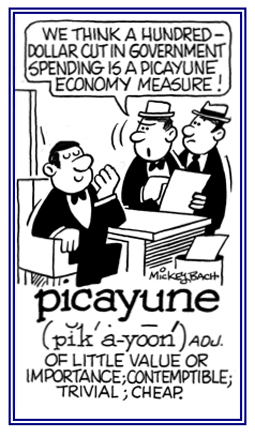 © ALL rights are reserved.
© ALL rights are reserved.
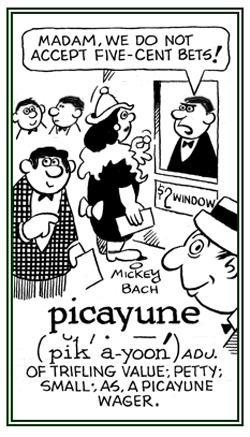 © ALL rights are reserved.
© ALL rights are reserved.
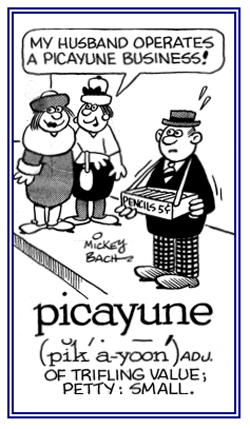 © ALL rights are reserved.
© ALL rights are reserved.
Go to this Word A Day Revisited Index
so you can see more of Mickey Bach's cartoons.
Pertaining to anything that is trivial, unimportant, of slight value, or worthless. (3)
picayunish
(adjective), more picayunish, most picayunish
Relating to quibbling or finding fault about some petty matter: Ned's mother was known to be a picayunish shopper who was always trying to buy things at a small discount or a lower price; even when it was just a few cents.
pilfering
(adjective), more pilfering, most pilfering
Typically related to stealing or filching things of relatively little value: There have been pilfering students in Glen's dormitory; so, he constantly reminds himself to lock his door when he goes to classes, shopping, etc.
Pertaining to sadness or mournfulness which is often expressed with sorrowful crying. (1)
Characterized by or pertaining to a lot of rain. (2)
Descriptive of being deeply moving or very touching and emotional. (2)
Controversial arguments or opposing views during a discussion. (3)
A reference to being clever, crafty, and shrewd; such as, a politic politician. (2)
Descriptive of a person who is capable of reading, writing, or speaking many languages. (2)
Pertaining to all forms of life which assume different characteristics, shapes, or styles at different times in their existence. (1)
Conveying slowness and lumbering; exhaustive. (1)
A reference to something that is beyond a person's control and is dependent on the will or pleasure of someone else; an insecure situation. (3)
Relating to animals that survive by preying on other animals for food; people who make a living by taking advantage of others or even robbing them of their finances. (4)
A reference to something or someone who is special or highly favored above or more than other things or people. (1)
Relating to grabbing, seizing, or holding something by wrapping around it. (1)
Characteristic of being greater in force or weight than someone else. (1)
Characteristic of presenting an impression that pleases or which attracts others and provides confidence that someone is an exceptional person. (3)
presently
(PREZ uhnt lee) (adverb), more presently, most presently
Characteristic of not being at this exact moment but in a short while; soon: Shirley said that she would be here presently.
A reference to being unduly bold in opinion or behavior in a way that is arrogant or rude. (3)
Belonging to the first or earliest age or ages; original or ancient in development. (1)
From the earliest time; primitive, crude, undeveloped. (2)
Pertaining to a situation or status that is primitive, original, fresh, unspoiled, and unpolluted. (2)
Referring to someone who wastes money or other valuable things. (2)
Extraordinary in bulk, quantity, or degree; descriptive of something that is great in size, force, or extent. (2)
Relating to being very extravagant or wasteful. (2)
Promethean
(adjective), more Promethean, most Promethean
1. A reference to a person who is daringly original, boldly inventive or creative: Some artists are more
Promethean when they produce their works in enormous sizes than others do it.
A Promethean is someone who is very clever or defiantly original in behavior or actions.
2. Etymology: from Greek mythology "one who created mortals from clay and gave them fire" from
pro-, "before" +
manthano, "learn, perceive."
Prometheus was a demigod, one of the Titans, who was worshiped by craftsmen. When Zeus hid fire from mankind, Prometheus stole it by trickery and returned it to earth.
As punishment, Zeus chained Proetheus to a rock where an eagle fed on his liver every day, which grew again each night; then he was finally rescued by Hercules.
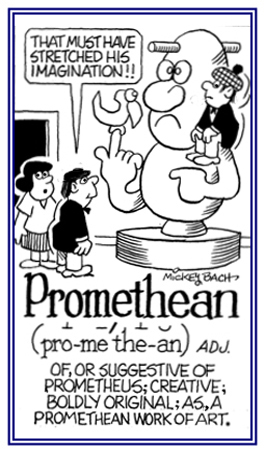 © ALL rights are reserved.
© ALL rights are reserved.
Go to this Word A Day Revisited Index
so you can see more of Mickey Bach's cartoons.
Being favorable and likely to lead to success; a good omen. (2)
Uninteresting, dull, commonplace, and ordinary. (2)
protean
(adjective), more protean, most protean
1. A reference to the nature of something or someone that is able to assume different shapes, forms, or roles easily: When Mildred is described as a
protean genius of novels, it means that not only was she brilliant, but that she utilized her talents to write in many styles.
2. Relating to the variety or great diversity of skills or aptitudes a person can display; many-sided; changeable: It is believed that, as a versatile musical composer, Shostakovich's
protean talents resulted in many wonderful styles of music.
3. Etymology: from Greek
proteus, "sea god who could change into many different shapes."
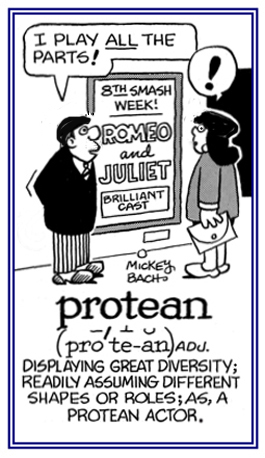 © ALL rights are reserved.
© ALL rights are reserved.
Go to this Word A Day Revisited Index
so you can see more of Mickey Bach's cartoons.
A reference to being unusually extended or prolonged; drawn out. (1)
Preparing for or getting ready for future needs or something that might happen. (1)
Characteristic of having a quarrelsome or combative disposition; being belligerent. (2)
Powerful or very strong. (2)
A reference to having great stamina and being physically powerful. (1)
Relating to being definite, strict, exact, and precise. (2)
Relating to the powerful and intense smell or taste of something. (1)
A person who has an uncontrolled or insane desire to set things on fire. (2)
quaint
(KWAYNT) (adjective), more quaint, most quaint
Charming, pleasingly unusual, old fashioned: During their trip, Mike and Karen enjoyed a village's
quaint customs.
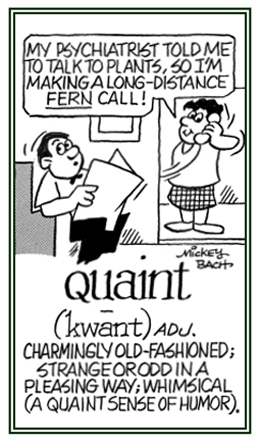 © ALL rights are reserved.
© ALL rights are reserved.
Go to this Word A Day Revisited Index
so you can see more of Mickey Bach's cartoons.
qualified
(KWAHL uh fighd") (adjective), more qualified, most qualified
1. Possessing experience, being competent and knowledgeable: Max was told to take his dog to a qualified veterinarian if he wanted it to get better.
2. Guarded, tentative, conditional: Brian gave a qualified answer when he was asked to give definite assurances that Melba could get the flight out that evening.
quippish
(adjective), more quippish, most quippish
A reference to mocking or scoffing another person or something that has been experienced previously: Shirley made a sarcastic or quippish remark about her husband backing his car up into another car while he was trying to maneuver into a parking space.
Conveying an unusual assertion or representation by joking about what has transpired, occurred, or appeared at some prior time: Patrick's quippy declaration regarding his handwriting being beautiful was really ridiculous, since his penmanship was quite bad and very difficult to read.
quixotic
(adjective), more quixotic, most quixotic
1. Relating to something that is unrealistic or to someone who is hopeful in a way that is not practical: Jane and Jim had
quixotic dreams about their financial existence.
2. Etymology: from Latin
coxa, "hip, thigh."
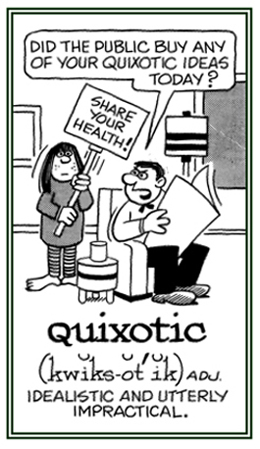 © ALL rights are reserved.
© ALL rights are reserved.
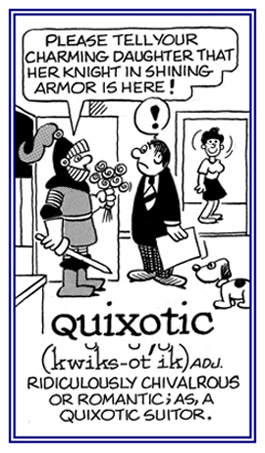 © ALL rights are reserved.
© ALL rights are reserved.
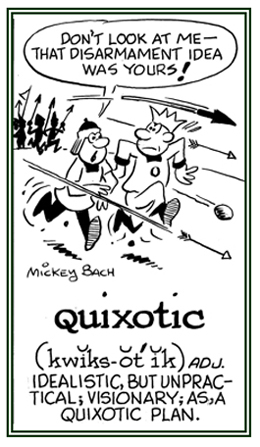 © ALL rights are reserved.
© ALL rights are reserved.
Go to this Word A Day Revisited Index
so you can see more of Mickey Bach's cartoons.
Having a very fervent interest in or a zealous opinion about someone or something with extreme intensity. (1)
1. Relating to or based on a person's genetic stock or heritage: Dina was part of a racial minority.
2. Pertaining to the issues between different genetic or geographical backgrounds or heritages: The two minority groups were striving to achieve racial equality.
1. A reference to being prejudiced against all people who belong to other genetic, culturally, ethnically, and geographically distinguished groups: Tom's obvious racist attitudes disqualified him from running for political office.
2. Being discriminatory; especially, on the basis of genetics and physical characteristics or religion: The two religious groups were in serious conflict with each other because of their racist beliefs.
Referring to something that is shining brightly and beaming; or pertaining to someone who is expressing pleasure, love, and well-being. (1)
rambling
(adjective), more rambling, most rambling
1. A reference to a large building that has a great number of rooms: The people were amazed when they saw the old
rambling building out on the farm.
2. Without a specific purpose, direction, or objective: The family decided to go on a
rambling vacation across the country instead of planning any specific places to visit.
The weatherman presented a rambling lecture about the extreme weather conditions that were taking place during the summer.
rampageous
(adjective), more rampageous, most rampageous
A description of wild and destructive behavior: The shooter in the theater went on a rampageous attack on the people who were there.
rampageously
(adverb), more rampageously, most rampageously
Referring to violent and destructive actions: The rioters were rampageously setting fires, attacking shops, other people, and even the police.
rampant
(adjective), more rampant, most rampant
1. A description of a condition which is spreading quickly and in a way that is difficult to control: There is a concern by local officials about the
rampant crime wave that is going on in the city.
There have been rampant wildfires which have destroyed many homes in Colorado and California.
2. Etymology: from the French word
ramper meaning "to climb, to creep" like an animal on its hind legs using its paws as if it is in a climbing-mode.
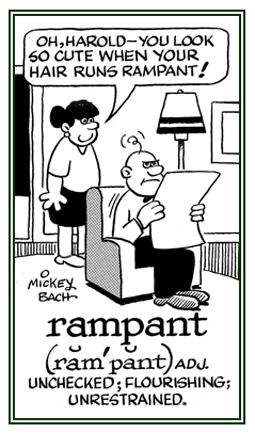 © ALL rights are reserved.
© ALL rights are reserved.
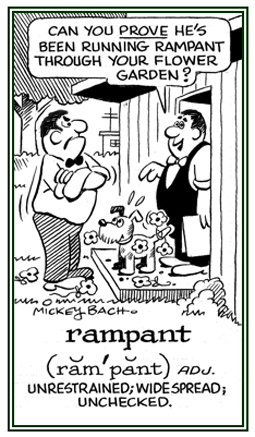 © ALL rights are reserved.
© ALL rights are reserved.
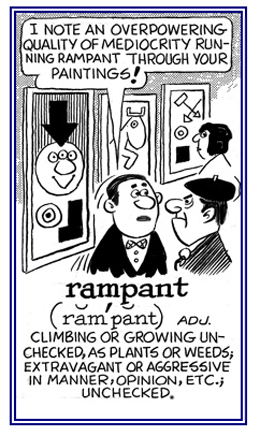 © ALL rights are reserved.
© ALL rights are reserved.
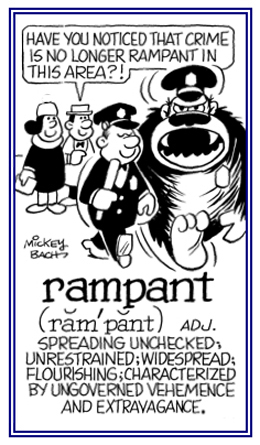 © ALL rights are reserved.
© ALL rights are reserved.
Go to this Word A Day Revisited Index
so you can see more of Mickey Bach's cartoons.
rancorous
(adjective), more rancorous, most rancorous
1. A reference to a grudge or grievance which is bitterly malicious, spiteful and hateful: The political leader has made some
rancorous sanctions that are causing other countries to plan to get revenge on him and his nation.
2. Etymology: related to Latin
rancidus, and
rancere, "to be stinking."
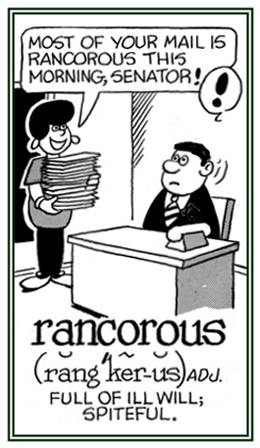 © ALL rights are reserved.
© ALL rights are reserved.
Go to this Word A Day Revisited Index
so you can see more of Mickey Bach's cartoons.
1. Proceeding, made, or occurring without definite aim, reason, or pattern: The program director made random selections of people who could participate in the TV quiz.
2. Characterizing a process of selection in which each item of a set has an equal probability of being chosen: By random choice, the card shark drew an "ace" from the new deck of cards.
3. In building construction: with reference to building materials; lacking uniformity of dimensions; constructed or applied without regularity: The stones in the walk to the house were placed in a random order.
4. Etymology: "having no definite aim or purpose", 1655, from at random (1565), "at great speed" (thus, "carelessly, haphazardly"); alteration of Middle English randon, "impetuosity, speed" (c.1305), from Old French randon, "rush, disorder, force, impetuosity"; from randir, "to run fast", from Frankish rant, "a running".
Characteristic of taking something by force or violence; being ravenous or greedy. (1)
Relating to being involved in, fascinated by, or concentrated on something to the exclusion of everything else; deeply engrossed or absorbed. (2)
Conveying a strong desire for food or being extremely hungry. (1)
A reference to the refusal of any creature, human or animal, to conform to an authority or to follow instructions by someone. (1)
Descriptive of being worthy of honor or respect for something that causes great fear or respect; being very powerful. (3)
The use of more words than are necessary to express ideas; superfluous. (1)
Relating to being very bad or deserving very strong criticism or blame. (3)
A reference to being offensive and completely unacceptable; a stinking odor. (2)
The ability to recover quickly, as from a misfortune or a disastrous situation; showing the power of recovery. (1)
restive
(RES tiv) (adjective), more restive, most restive
1. Relating to resisting control; difficult to control.
2. Characteristic of refusing to move, with reference to a horse or other animal.
Characteristic of being able to remember things for a long time. (2)
retired
(ri TIGHRD) (adjective) more retired, most retired
1. Secluded from much of society or from public notice: The famous author lived a
retired lifestyle, residing in the country.
2. Living away from public view; withdrawn: The
retired scientist kept up with current events by reading the blogs and tweets of his younger colleagues.
3. Withdrawn from business or an active life; usually, because of age: The elderly employee accepted his
retired status, although there were times when he wished that he could continue to have a job.
Mark has a more retired life style now that he is on vacation.
retiring
(ri TIGHR ing) (adjective), more retiring, most retiring
1. A person who is quiet and shy: Shanna is a timid and retiring young woman.
2. Someone who is withdrawn, uncommunicative, or unsocial: Harry's brother is a rascal with a deceptively more retiring manner.
3. The time when a person determines no longer to be working: Mrs. Williams thinks that 65 is a good retiring age for her so she can spend more time with her grand children.
Looking back to something that existed in the past. (1)
A reference to indulging in vulgar or lewd talk or humor: Victor's
ribald or indecent jokes were not acceptable by most of the people who were at the party.
Sometimes on a TV talk show, a person will use a ribald expression which usually results in a noise, or beep, that obliterates what he or she says.
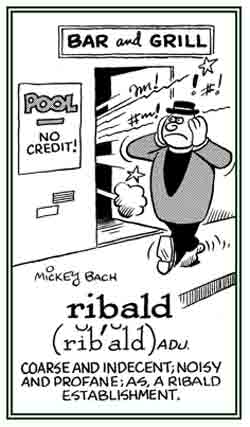 © ALL rights are reserved.
© ALL rights are reserved.
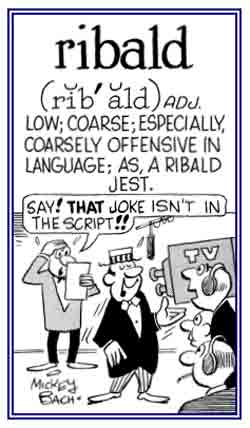 © ALL rights are reserved.
© ALL rights are reserved.
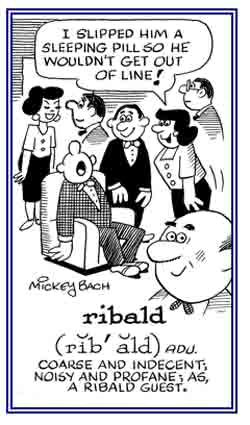 © ALL rights are reserved.
© ALL rights are reserved.
Go to this Word A Day Revisited Index
so you can see more of Mickey Bach's cartoons.
Vulgar or lewd language used in jokes, speeches, in written material, etc. (3)
risible
(RIZ uh buhl) (adjective), more risible, most risible
A reference to being capable of laughing or inclined to laugh.
risqué, risque
(adjective); more risqué, more risque; most risqué, most risque
1. Referring to unacceptable or immoral presentations: The nightclub woman was singing a song with
risqué lyrics.
2. Suggestive of or bordering on impropriety or indecency: When Andrew was telling his girlfriend a
risqué story, she did not appreciate it and she told him never to do it again.
3. Etymology: from French
risqué, a reference to "being indecent or unacceptable"; from
risquer, "to risk."
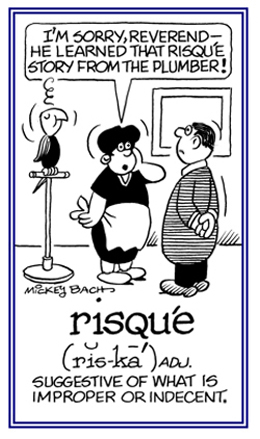 © ALL rights are reserved.
© ALL rights are reserved.
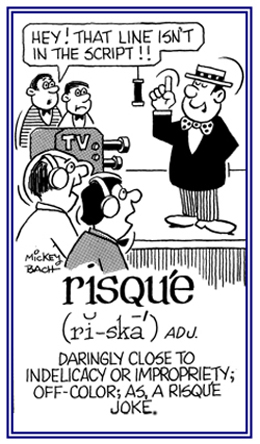 © ALL rights are reserved.
© ALL rights are reserved.
Go to this Word A Day Revisited Index
so you can see more of Mickey Bach's cartoons.
roguish
(adjective), more roguish, most roguish
1. Characterizing a person who is dishonest, unprincipled, or unscrupulous: The criminal in the story was presented as being quite
roguish because he told the lovely lady that she was beautiful and at the same time stole her expensive bracelet!
2. Descriptive of the manner or expression which is pleasantly or playfully mischievous in an appealing bold way: At the party Jim gave Susan a
roguish smile which made her blush completely!
3. Etymology: from Latin
rogare, "to be dishonest, to be rascally."
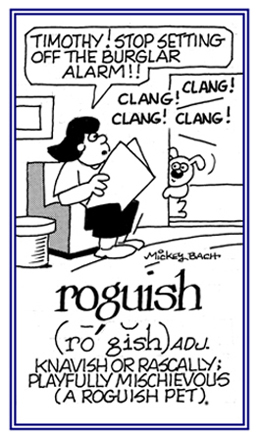 © ALL rights are reserved.
© ALL rights are reserved.
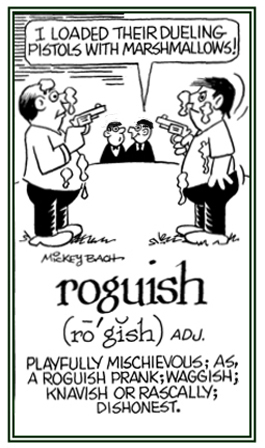 © ALL rights are reserved.
© ALL rights are reserved.
Go to this Word A Day Revisited Index
so you can see more of Mickey Bach's cartoons.
Elementary, undeveloped, or basic principles. (1)
1. Relating to a person's feeling or to an expression of regret: Little Jeremy gave his mother a
rueful smile when he apologized for spilling some soup on the table during lunch.
2. Conveying sympathy or compassion: Jack nodded his head at Rebecca's reason for being late with dinner and so, he gave her a
rueful and understanding smile.
3. Etymology or origin of the word: from Old English
hreow, "repentance" and German
Reue, "remorse."
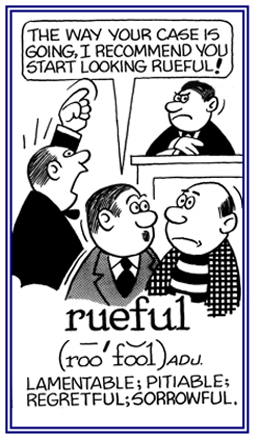 © ALL rights are reserved.
© ALL rights are reserved.
Go to this Word A Day Revisited Index
so you can see more of Mickey Bach's cartoons.
ruthless
(adjective), more ruthless, most ruthless
Descriptive of having no pity and being cruel, brutal, or merciless: The police are still looking for the
ruthless killer of the family.
The journalist was ruthless with his negative criticism of the government.
ruthlessly
(adverb), more ruthlessly, most ruthlessly
A reference to being heartless, callous, and vicious: The slaves were often ruthlessly abused by their owners.
Especially noticeable, conspicuous, prominent, and relevant for a situation. (2)
Moving around by leaps or abrupt propulsion rather than by smooth gradual transitions. (1)
sardonic
(sar DAHN ik) (adjective), more sardonic, most sardonic
1. Scornful or cynically mocking: Shirley had a
sardonic smile when she was told what a wonderful dress she was wearing.
2. Etymology: from Greek:
sardonios, "of bitter" or "scornful laughter".
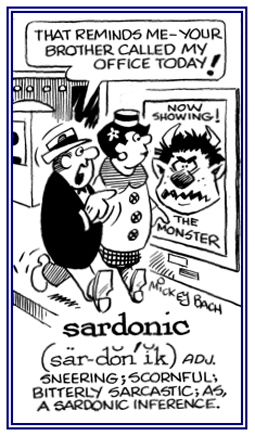 © ALL rights are reserved.
© ALL rights are reserved.
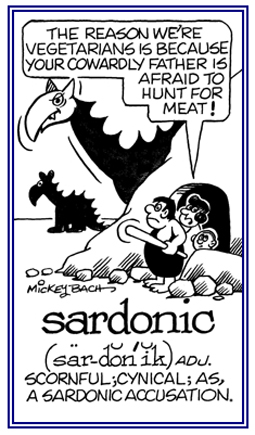 © ALL rights are reserved.
© ALL rights are reserved.
Go to this Word A Day Revisited Index
so you can see more of Mickey Bach's cartoons.
sartorial
(adjective), more sartorial, most sartorial
1. Relating to the tailoring of clothing: In his flashy suit, Jack had by far the most
sartorial outfit at Jane's birthday party.
Sam's special suit was of sartorial interest to those who were at the nightclub.
The couple arrived for their wedding ceremony in sartorial splendor.
2. Etymology: from Latin
sartor, "tailor"; from
sarcire, "to patch."
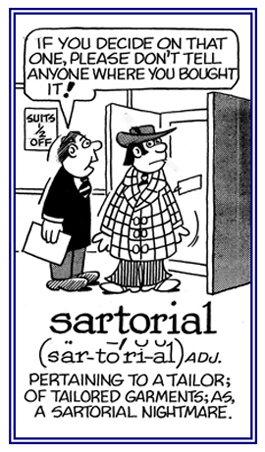 © ALL rights are reserved.
© ALL rights are reserved.
Go to this Word A Day Revisited Index
so you can see more of Mickey Bach's cartoons.
scathing
(adjective), more scathing, most scathing
1. Referring to bitterly severe remark: The local newspaper made a
scathing review of the drama.
2. Conveying harmful, injurious, or searing and severely critical rebukes: The coach was making
scathing criticisms to his football players after they lost the game to a competing team.
3. Etymology: from Old Norse
skathi, "damage, harm."
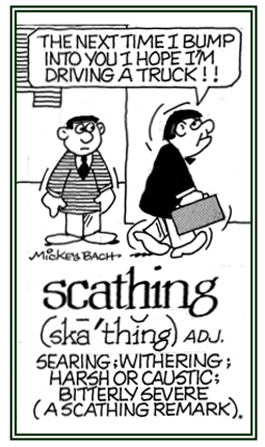 © ALL rights are reserved.
© ALL rights are reserved.
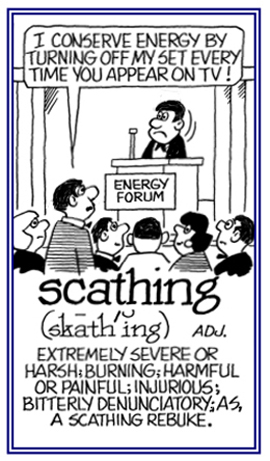 © ALL rights are reserved.
© ALL rights are reserved.
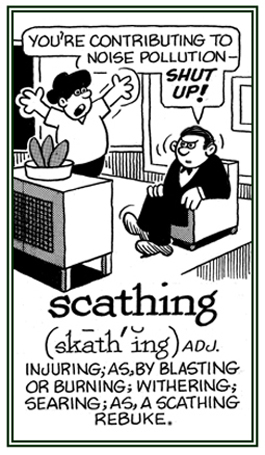 © ALL rights are reserved.
© ALL rights are reserved.
Go to this Word A Day Revisited Index
so you can see more of Mickey Bach's cartoons.
scorched
(adjective), more scorched, most scorched
Referring to something that has been burned: When Melba was cooking, she noticed that the scorched meat could not be served because it could not be eaten.
scorching
(adjective), more scorching, most scorching
Descriptive of something that is very hot: There have been some unusually scorching weather conditions already this summer, and it is only June.
scurrilous
(adjective), more scurrilous, most scurrilous
1. A reference to the use of low and indecent language of some persons: When it comes to presenting
scurrilous people, politicians often are examples of such behavior.
Paul had to make a public announcement to restore his reputation if he wanted a chance at winning the election as mayor after his opponent spread scurrilous lies about him.
Scurrilous accusations or stories are untrue and unfair, and they are likely to damage the reputation of the person that they refer to.
2. Relating to something that is said or done unfairly to make people have a bad opinion of a person: Catherine, an actress and a singer, criticized a reporter who spread
scurrilous articles about her in his newspaper which were unfounded and unjust.
3. Etymology: from Latin
scurrilis, "buffoon-like", from
scurra, "a vulgar buffoon (a person who does silly things) who behaves in an indecent, vile, or vulgar way".
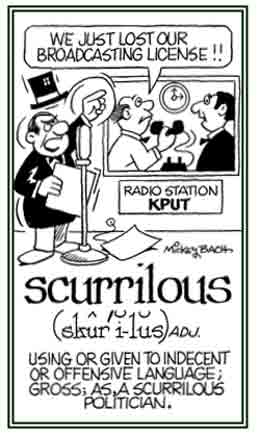 © ALL rights are reserved.
© ALL rights are reserved.
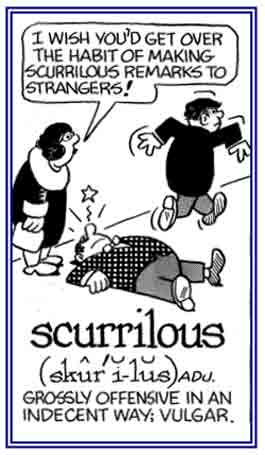 © ALL rights are reserved.
© ALL rights are reserved.
Go to this Word A Day Revisited Index
so you can see more of Mickey Bach's cartoons.
A reference to something that is going on, or being planned, and not letting others know about it. (1)
Pertaining to a peaceful and quiet environment without excitement or any significant activities. (1)
Characteristic of continually sitting and not moving around. (2)
Pertaining to the promotion of a rebellion against a lawful authority. (2)
A reference to being diligent and persistent when striving to achieve a goal or an objective. (2)
seething
(adjective), more seething, most seething
A reference to being very agitated, upset, or angry: Henry had a seething reaction and feeling when the train left just before he could get on it.
self-effacing
(adjective), more self-effacing, most self-effacing
1. A reference to a person who shuns attention and doesn't want to acknowledge praise: Doug patted Mark on the back and said that he did a wonderful job, and Mark, being a quiet and
self-effacing man, replied, "Oh, it was nothing."
2. Etymology: from Latin
se-, "self " +
ex-, "out" +
face, "appearance".
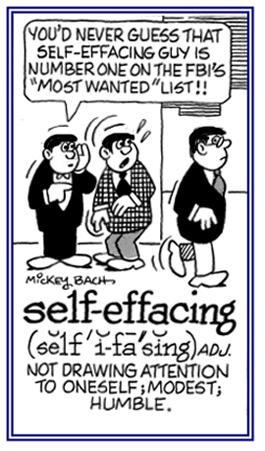 © ALL rights are reserved.
© ALL rights are reserved.
Go to this Word A Day Revisited Index
so you can see more of Mickey Bach's cartoons.
A reference to expressing much in a few words; concise and full of meaning; brief and to the point. (1)
A reference to being secluded, separated, or isolated from other people. (3)
seraphic
(adjective), more seraphic, most seraphic
1. A reference to or characteristic of an angel, being very beautiful and of very good character and righteousness: When Adam arrived home from work, his little daughter usually greeted him with a
seraphic smile and run to him so he would pick her up to be in his arms.
2. Etymology: from Greek
seraphim, serapheim and Latin
seraphim, seraphin, "highest order of angels".
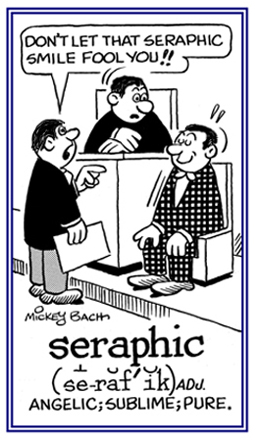 © ALL rights are reserved.
© ALL rights are reserved.
Go to this Word A Day Revisited Index
so you can see more of Mickey Bach's cartoons.
Characteristic of the use of abnormally big or long words; such as, those that are located at this
Sesquipedalia page. (2)
shaky
(adjective); shakier, more shaky; shakiest, most shaky
Referring to not not being strong or steady in movements, sound, etc.: Shirley took a few shaky steps before she collapsed after hearing that her mother had just died.
shimmering
(adjective), more shimmering, most shimmering
Descriptive of shining as with a light that seems to move slightly: Because of the heat, drivers going to work could not avoid seeing the shimmering rays rising up from the highway.
shimmery
(adjective), more shimmery, most shimmery
Conveying light that flashes or glistens and moves with brightness: The multitudes of shimmery lightning bugs, or fireflies, that were flying around during the evening, were spectacular.
shoddily
(adverb), more shoddily, most shoddily
Relating or pertaining to that which is poorly or shabbily done: Ingrid considered the book to be about the most shoddily composed novel she has ever read.
sighted
(adjective), more sighted, most sighted
Able to see and not being blind: There are partially sighted people who have a limited ability to see enough to read and to get around.
A reference to futile and endless repetition of labor or drudgery. (1)
sketchily
(adverb), more sketchily, most sketchily
Slight; superficial: The only thing that Charles could see in the notebook was a sketchily drawn face.
sketchy
(SKECH ee) (adjective), more sketchy, most sketchy
1. Giving only major written points or parts that are incomplete or vague: The investment advertisement gives a
sketchy description of what monetary results might be received for the money.
2. Inadequate, superficial, or lacking in details: The details about the bus accident are still too
sketchy to know what really happened.
Jack has only a sketchy idea of how his computer program works.
3. Something which is done quickly without many details: Jillian made a
sketchy drawing of the earthquake destruction of the city.
skimpily
(adjective), more skimpily, most skimpily
Relating to that which is insufficient or inadequate: Because she didn't allow enough time to do her class assignment, Trisha did her homework skimpily for history class the next day.
skittish
(adjective), more skittish, most skittish
1. Being unpredictable and easily excited: Skittish horses are often seen in parades because of the loud noises and crowds of people that make many of the horses very nervous and jumpy.
2. Nervous or worried: Some skittish children are afraid to meet strangers.
3. Easily startled or timid and afraid: The cat is calm and friendly with people it knows, but it becomes a skittish cat when strangers come to visit.
skulking
(adjective), more skulking, most skulking
Pertaining to movements that are done in a quiet or secret way: The skulking cat was about to pounce on the mouse that had found its way into Kay's apartment.
skulkingly
(adverb), more skulkingly, most skulkingly
Descriptive of moving in a sneaking manner: Tim's little boy was skulkingly approaching his mother, who was unaware of his presence, so he could surprise her by saying: "Boo, mommy!"
slavish
(adjective), more slavish, most slavish
1. Of or characteristic of being servile, subservient, or submissive: Slavish devotion to another person can be self-destructive.
2. Showing no originality; blindly imitative: The painting is a slavish imitation of Van Gogh's style.
slavishly
(adverb), more slavishly, most slavishly
Descriptive of anyone who copies or follows another person, or something, completely without any attempt to be original or independent: The high school boy slavishly copies everything his older brother does.
sleazily
(adverb), more sleazily, most sleazily
Descriptive of behavior that is immoral or dishonest: Mary felt that her lawyer was
sleazily doing more harm than properly defending her in court.
Are the politicians sleazily saying one thing during one speech and then the complete opposite later in a different flip-flop presentation?
slothful
(adjective), more slothful, most slothful
A reference to being idle, sluggish, or lazy: A
slothful person is always a burden to any group trying to complete a project.
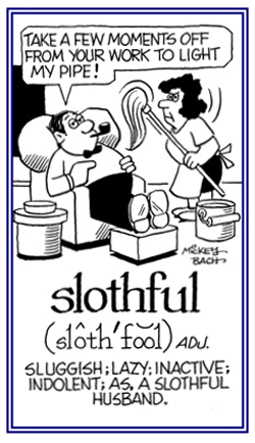 © ALL rights are reserved.
© ALL rights are reserved.
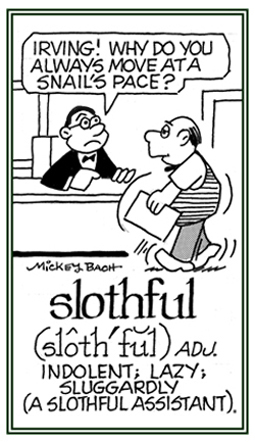 © ALL rights are reserved.
© ALL rights are reserved.
Go to this Word A Day Revisited Index
so you can see more of Mickey Bach's cartoons.
sluggish
(adjective), more sluggish, most sluggish
1. A reference to a person who is habitually idle, lazy and inactive: Mary always feels
sluggish in the morning, so she usually drinks a large glass of water and some coffee to wake up completely and to get moving!
2. Characteristic of something which is slow and indicates little motion: Inflation has been rising despite the
sluggish economy.
3. Etymology: from Middle English
slug, "slow moving" + -ish, "inclined to be".
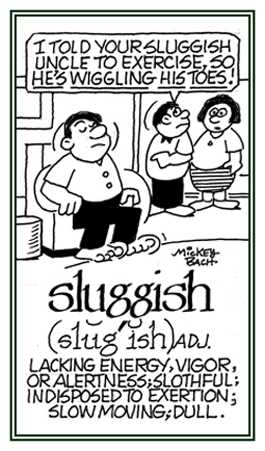 © ALL rights are reserved.
© ALL rights are reserved.
Go to this Word A Day Revisited Index
so you can see more of Mickey Bach's cartoons.
smoldering
(adjective), more smoldering, most smoldering
1. A reference to burning without smoke: The smoldering fireplace continued all night and even into the next day.
2. Descriptive of burning inwardly with silent rage: Eric had several smoldering days of anger without saying anything about the argument he had had with his neighbor.
smoothly
(adverb), more smoothly, most smoothly
Conveying something that is accomplished without problems, difficulties, or delays: The family's trip went very well; especially, since the traffic was flowing smoothly as they drove to their vacation destination and back home again three weeks later.
Something which is done or made suddenly; often, without careful thinking: Samuel made a
snap statement that got him in trouble with his wife.
The politician, thinking that the microphone in front of him was off, made a snap remark (which happened to be vulgar) about his opponent to someone who was sitting next to him and which was heard by the TV audience, too.
snappish
(adjective), more snappish, most snappish
Feeling or showing irritation: Sabina made a
snappish remark when the man in the elevator asked her where she was working in the building.
The shopper was snappish and rude with the salesclerk.
snappishly
(adverb), more snappishly, most snappishly
A reference to the behavior of someone who is showing anger: When Monroe met his wife downtown, she snappishly said, "I've been waiting for you for more than thirty minutes!"
snide
(adjective); snider, snidest; more snide, most snide
Pertaining to making unkind or insulting statements, comments, or references in a derogatory way: Willie made a
snide remark to his fellow worker when he suggested that maybe she should take an elementary course in spelling when she wrote that the "male man delivered the letters this morning".
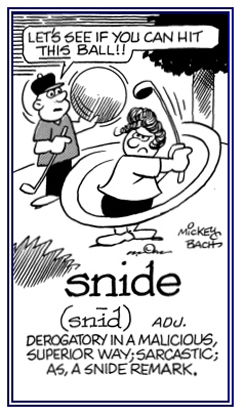 © ALL rights are reserved.
© ALL rights are reserved.
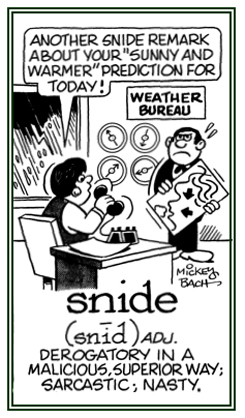 © ALL rights are reserved.
© ALL rights are reserved.
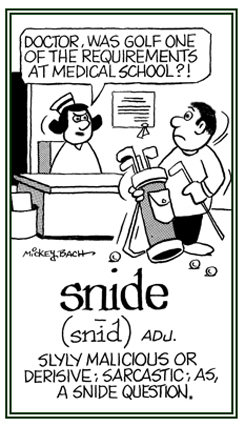 © ALL rights are reserved.
© ALL rights are reserved.
Go to this Word A Day Revisited Index
so you can see more of Mickey Bach's cartoons.
Characteristic of making insulting or unkind statements, comments, or references in a derogatory or disapproving way. (3)
Conveying an attitude of serious concern and consideration for a person's health, happiness, welfare, etc. (2)
A reference to walking while asleep or descriptive of sleep walking. (1)
A reference to anything that causes sleepiness or drowsiness or that induces a person to fall asleep. (3)
Characteristic of being sleepy, drowsy, or dozing off. (1)
Despicable, vile, filthy, and showing the worst aspects of human nature; such as, immorality, selfishness, and greed. (1)
sparing
(adjective), more sparing, most sparing
1. A reference to the avoidance of waste and to economical management and frugality: Joe's mother prepared a
sparing meal for the family.
Sam and his wife saved money by being sparing shoppers.
2. Etymology: from Latin
spargere, "to sprinkle" and the adjective form describes being "moderate, economical".
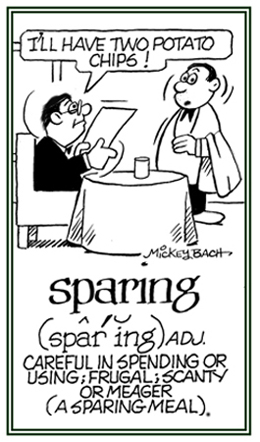 © ALL rights are reserved.
© ALL rights are reserved.
A reference to something that is clearly and exactly presented or stated. (1)
Seeming to be true but actually referring to something that is false or untrue. (1)
Referring to anyone who is showing a desire to be mean to others with bad behavior. (2)
Descriptive of something that happens or takes place without any apparent external cause; self-generated, instinctive and without prompting. (1)
spurious
(adjective), more spurious, most spurious
1. Not genuine, insincere, not authentic, counterfeit: Edward gave his wife a necklace of
spurious pearls which were fakes.
2. Based on false ideas or bad reasoning: Shelby made a
spurious claim to her health insurance for medication that she never used or needed.
3. In botany, that which is similar in appearance but different in structure or function: There are some
spurious parts of plants that superficially resemble those of other plants, but they are not the same.
4. Etymology: from Latin
spurius, "false, illegitimate".
The sense of having an illegitimate or being of an invald origin, not properly qualified or constituted, is recorded first in Ben Jonson's 1601 The Poetaster and the extended sense of "false, sham, counterfeit" appeared in 1615.
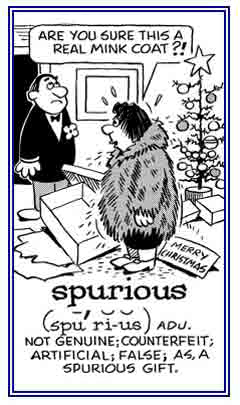 © ALL rights are reserved.
© ALL rights are reserved.
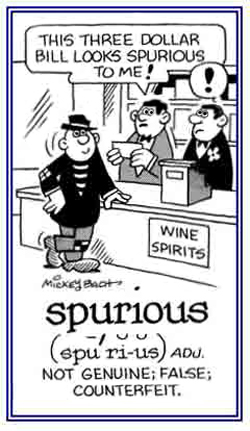 © ALL rights are reserved.
© ALL rights are reserved.
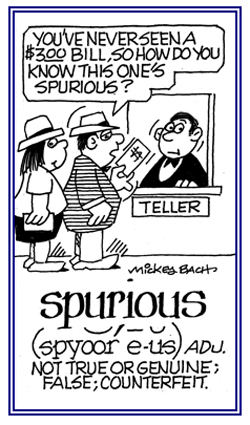 © ALL rights are reserved.
© ALL rights are reserved.
Go to this Word A Day Revisited Index
so you can see more of Mickey Bach's cartoons.
A reference to being false or not genuine. (3)
spuriously
(adverb), more spuriously, most spuriously
Descriptive of that which is apparently but not actually valid: The politician
spuriously presented an argument that was irrational and unrealistic.
The customer spuriously tried to use counterfeit money to pay for his purchases.
squeamish,
(SKWEE mish) (adjective), more squeamish, most squeamish
1. Referring to a person's sensitivity of being easily sickened or upset: Trina gets
squeamish about eating raw fish.
Marvin gets a squeamish feeling just at the sight of blood.
2. Relating to the condition of having an unpleasantly nervous or doubtful feeling: Shelby's brother has a
squeamish attitude about walking in the city at night.
3. Descriptive of someone who is easily shocked, disturbed, or disgusted: Some movies are just too unacceptable for
squeamish people who can't stand looking at all of the violence and bloodshed.
4. Pertaining to a person who is afraid to deal with or to do things which might hurt or offend people: Journalists should not be
squeamish about writing the truth about anyone or anything.
5. Characteristic of an individual who is easily offended or shocked by such things as violence, the mention of bodily functions, or strong language: Some talk-show hosts on the radio and TV programs upset members of their
squeamish audiences who feel it is inexcusable for those hosts to use such psycho talk, vulgarisms, and personal attacks on people they disagree with.
6. Etymology: from
squoymous, "disdainful, fastidious" which is from Anglo-French
escoymous, of unknown origin.
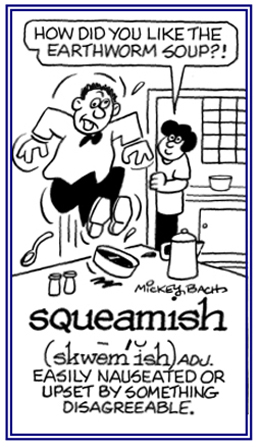 © ALL rights are reserved.
© ALL rights are reserved.
Go to this Word A Day Revisited Index
so you can see more of Mickey Bach's cartoons.
stalwart
(adjective), more stalwart, most stalwart
1. Relating to enormous strength and vigor of mind, body, or spirit: Norman's
stalwart son was a star professional football player.
2. A reference to those who are very loyal and dedicated: Susan and her friends were more
stalwart supporters of the politician's candidacy for governor than most of the other people in her community.
3. Etymology: from Old English
staelwierthe, "serviceable, good" from
stathol, "position" +
wierthe, "worthy, excellent".
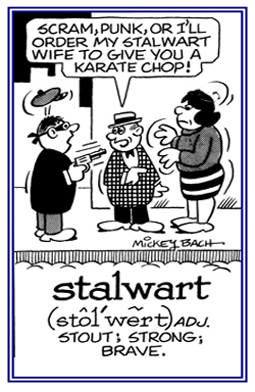 © ALL rights are reserved.
© ALL rights are reserved.
Go to this Word A Day Revisited Index
so you can see more of Mickey Bach's cartoons.
steadfast
(adjective), more steadfast, most steadfast
Pertaining to being firm, steady, or unwavering about an issue or principle: Carol was a
steadfast student at the university despite the fact that she had to work at a restaurant several hours each day in order to pay for her tuition and other living expenses.
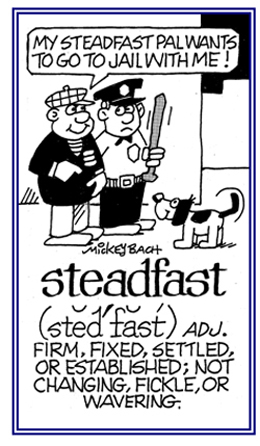 © ALL rights are reserved.
© ALL rights are reserved.
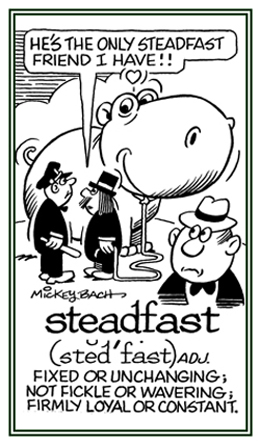 © ALL rights are reserved.
© ALL rights are reserved.
Go to this Word A Day Revisited Index
so you can see more of Mickey Bach's cartoons.
steadily
(adverb), more steadily, most steadily
In a nonmoving way: Bernhard was told to keep holding the camera steadily.
stealthily
(adverb), more stealthily, most stealthily
In a manner that is intended to be done very quietly in order not to be noticed: The camera crew moved stealthily closer and closer to the pride of lions.
stertorous
(STUR tur uhs) (adjective), more stertorous, most stertorous
1. A heavy snoring sound while breathing during sleep; accompanied by a hoarse snoring or gasping sound: Trying to sleep with a
stertorous wife makes it difficult for the husband to continue sleeping and it also applies when the circumstances are reversed.
2. Etymology: from Latin
stertere, "to snort".
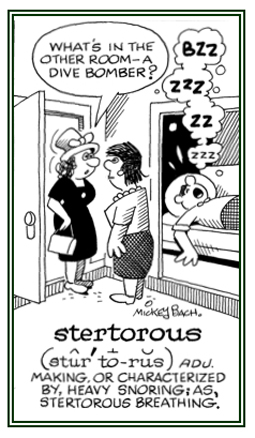 © ALL rights are reserved.
© ALL rights are reserved.
Go to this Word A Day Revisited Index
so you can see more of Mickey Bach's cartoons.
1. Referring to a person or a thing that is dull, uninteresting, and not very exciting; expressionless: The man behind the desk in the office was quite
stolid and impassive as Susan and Marc explained their sad plight to him.
2. Etymology: from Latin
stolidus, "insensible, dull, slow, brutish, rude, stupid."
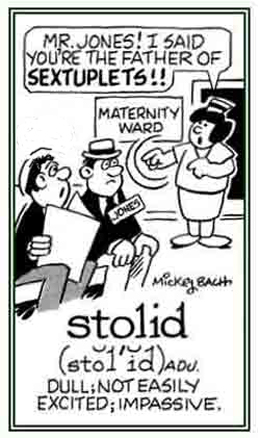 © ALL rights are reserved.
© ALL rights are reserved.
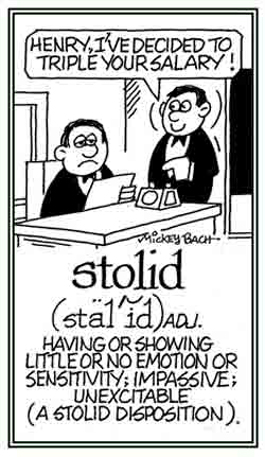 © ALL rights are reserved.
© ALL rights are reserved.
Go to this Word A Day Revisited Index
so you can see more of Mickey Bach's cartoons.
1. Regarding something or a place which is abounding in, covered with, or full of stones: Jim and Carla had a very
stony beach instead of a sandy one as they had hoped for.
2. Descriptive of a stone, as in hardness: The
stony steps were very cool when the couple sat down on them to enjoy the stars in the sky.
3. Characterizing a person who is hardhearted and unfeeling; unemotional: Little Sally didn't like her aunt who had a
stony glare when she was having tea with the rest of the family.
4. Concerning an individual who exhibits no feeling or warmth; impassive: Henry had a
stony expression when he was told that he could not go on the trip.
5. Pertaining to someone who is in a state of emotional numbness or is petrified: The noise that woke Shirley up at night gave her a
stony feeling of fear.
6. Etymology: from Old English
stanig, "stony, rocky".
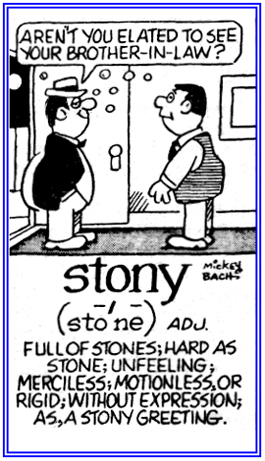 © ALL rights are reserved.
© ALL rights are reserved.
Go to this Word A Day Revisited Index
so you can see more of Mickey Bach's cartoons.
stunning
(adjective), more stunning, most stunning
1. Related to causing someone to be very surprised or shocked: Jacob made a stunning discovery regarding the profits he made with his investment at the bank.
2. Quite beautiful or pleasing: Tabitha wore a stunning gown to her friend's wedding.
stunningly
(adverb), more stunningly, most stunningly
Very surprising and attractive: Monroe took stunningly sharp pictures of the events at the international sporting championships.
A reference to being agreeable, pleasant, and gracious in behavior or manners. (3)
A reference to someone who is in a position or rank that has less power or authority than another person or not as important as something else. (1)
Having or presenting a friendly smile. (1)
Speaking privately, or confidentially, and secretly. (1)
Characteristic of being subordinate, servile, submissive, and obsequious; resembling a slave or a servant. (1)
Referring to the regulation or control of expenses for food, clothes, or other materials. (2)
Relating to something that is made or produced at great expense; so, it is magnificent in workmanship and is very expensive and impressive. (2)
Referring to something that is done beyond what is required or expected. (1)
Pertaining to something which is more than is necessary or required; excessive, unnecessary. (2)
Referring to the greatest degree of excellence, the highest quality, or anything that is much better than normal. (2)
Exceeding the required or normal number of things or people. (2)
A description of someone behaving in a quiet and secret way so no one sees or hears the person. (2)
susurrant
(adjective), more susurrant, most susurrant
A reference to whispering or talking in a very soft voice: While Clement and Marina were traveling on the bus, they carried on
susurrant conversations so they wouldn't disturb other passengers and also so other people couldn't hear what they were saying.
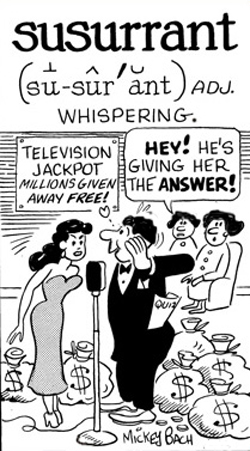 © ALL rights are reserved.
© ALL rights are reserved.
Go to this Word A Day Revisited Index
so you can see more of Mickey Bach's cartoons.
A descriptive term for whispering or talking in a very soft voice. (1)
susurrous
(soo SUHR uhs) (adjective), more susurrous, most susurrous
A description of something that involves rustling or whispering sounds: During the autumn when the leaves fall from the trees, it is very common to hear the susurrous noise made by a person's feet as he or she walks near the perennial woody plants.
1. Descriptive of someone who is lithe, slender and of small build: The new fashions of the year emphasize Claudia's
svelte and slim figure.
2. Etymology: from Latin
ex-, "out" +
vellere "to pluck, to pull, to stretch."
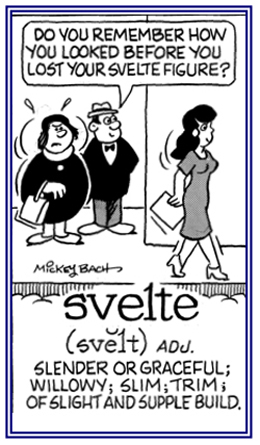 © ALL rights are reserved.
© ALL rights are reserved.
Go to this Word A Day Revisited Index
so you can see more of Mickey Bach's cartoons.
tangled
(adjective), more tangled, most tangled
Complicated or confusing: The divorce agreements were done without a tangled argument because they had prenuptial (pre-marriage) and postnuptial (after marriage) agreements.
tattooed
(adjective), more tattooed, most tattooed
A reference to skin that has been marked in colors with designs or patterns with a special needle: A sailor had a
tattooed ship on his arm.
Large tattooed areas on the skin are sometimes removed by dermabrasion (high-speed sanding to reduce the pitted scars) or laser (concentrated beam of light radiation) treatments in order to decrease the size of the scars.
tawdry
(TAW dree) (adjective), more tawdry, most tawdry
1. Unpleasant, immoral, shameful; mean-spirited and lacking in human decency: Several politicians have ruined their political careers with
tawdry affairs while in office, and consequently, they have found it difficult to escape their shameful behaviors.
2. Inexpensive and of bad quality; gaudy and cheap: Some people think that the talented violinist dresses in a
tawdry style (old blue jeans, hair in a pony tail, etc.) which are in bad taste for the concerts he gives.
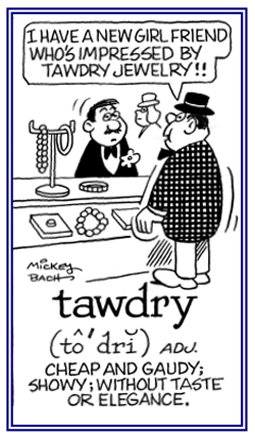 © ALL rights are reserved.
© ALL rights are reserved.
Go to this Word A Day Revisited Index
so you can see more of Mickey Bach's cartoons.
Referring to a dull, monotonous, unexciting, or boring situation or activity. (1)
teeming
(adjective), more teeming, most teeming
1. Referring to the abundance of something, like fish or people: Jack looked into the clear water and saw
teeming masses of trout and decided that he wanted to go fishing tomorrow.
2. Concerning that which is crowded or bustling: The
teeming multitudes of journalists were hustling and elbowing around for the best spot outside the city hall in order to get the best photos and interviews.
3. Etymology: from the Old English
teman, "to give birth to" from "being fertile, pregnant, or producing babies."
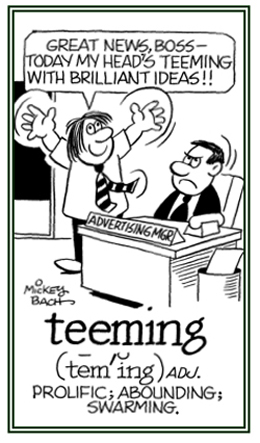 © ALL rights are reserved.
© ALL rights are reserved.
Go to this Word A Day Revisited Index
so you can see more of Mickey Bach's cartoons.
Characteristic of being unreasonably daring, rash, or reckless. (2)
Pertaining to something that can be maintained or defended. (1)
Descriptive of something that is not easily pulled apart or someone who is persistent, unyielding, and will not give up. (1)
tenebrous
(adjective), more tenebrous, most tenebrous
1. Descriptive of something which is dark and gloomy: When Jane and her family visited the old castle, it seemed to be
tenebrous because it was creepy with shadows that gave the impression that there were ghosts moving around in it!
2. Etymology: from Latin
tenebrosus, "dark"; from
tenebrae, "darkness, shadows."
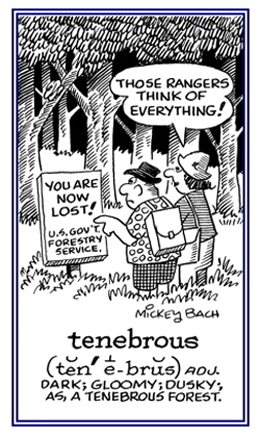 © ALL rights are reserved.
© ALL rights are reserved.
Go to this Word A Day Revisited Index
so you can see more of Mickey Bach's cartoons.
tenuous
(TEN yoo uhs) (adjective), more tenuous, most tenuous
1. Referring to something which has little substance; is flimsy; has extreme thinness; is slender or slim: James could provide only a
tenuous claim to ownership of the contents of his thesis.
The valley is covered with a tenuous mist.
Tenuous also describes something that is used in a more figurative sense meaning of slight importance; weak; flimsy; vague; unsubstantial; such as, presenting a tenuous argument, story, or claim.
2. Etymology: from Latin
tenuis, "thin, drawn out, meager, slender"+
-ous an element that makes adjectives from nouns, meaning "having, full of, inclined to."
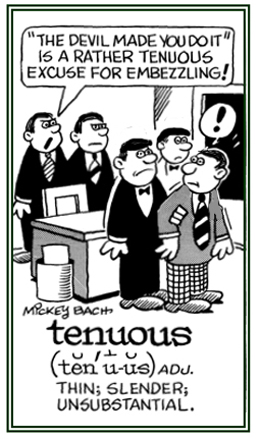 © ALL rights are reserved.
© ALL rights are reserved.
Go to this Word A Day Revisited Index
so you can see more of Mickey Bach's cartoons.
tenuously
(adverb), more tenuously, most tenuously
A reference to something that is uncertain, weak, or indefinite: The judge determined that Charles was tenuously connected to the robbery that took place in his neighborhood.
terpsichorean
(adjective), more terpsichorean, most terpsichorean
1. Relating to dancing: Jane wanted to impress her mother by saying that there would be a big
terpsichorean gala including dinner at school the following week and that she would need to have a ball dress to go there.
2. Etymology: from a combination of Greek
terpein, "to enjoy, to delight" +
khoros, "dance, dancing" resulting in
terpsichore, "delighting in dancing."
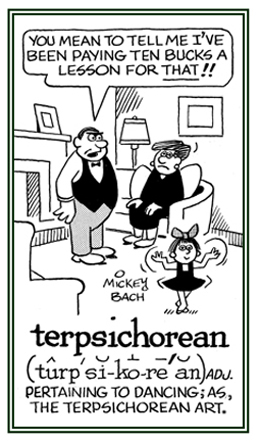 © ALL rights are reserved.
© ALL rights are reserved.
Go to this Word A Day Revisited Index
so you can see more of Mickey Bach's cartoons.
Easily annoyed or irritated; impatient, or easily exasperated and being peevish about little things. (1)
thinking
(adjective), more thinking, most thinking
A reference to the ability to intelligently decide the best approach to solving complicated things: There are thinking scholars who want to encourage students to be creative thinkers.
thoughtful
(adjective), more thoughtful, most thoughtful
1. Being serious and quiet because someone is engaged in a reflective moment: Hank looked at his mother with a thoughtful expression.
2. That which is done or made after careful consideration: Maggie wrote a more thoughtful book about educational procedures than anyone had done before.
3. Showing concern for the needs or feelings of other people or creatures; being considerate: Helping the hundreds of pet dogs that were left behind by thousands of people when they left Detroit was one of the most thoughtful things that these volunteers could have done.
thoughtless
(adjective), more thoughtless, most thoughtless
Not showing concern for the needs or feelings of other people or creatures; being inconsiderate: The reporter made
thoughtless comments in his article about the destruction that took place during the tornado.
Hitting the woman with his car and then driving off without helping her was about the most thoughtless and illegal behavior a person could do.
ticklish
(adjective), more ticklish, most ticklish
1. Sensitive to tingling or easily reactive to a light touch: Marge admitted that she was a ticklish person.
2. A reference to being delicate, complicated, awkward, requiring tact, etc.: Bringing the two enemies together will be a ticklish procedure.
tirading
(adjective), more tirading, most tirading
References to statements or speeches that reprimand, scold, denounce, condemn, vilify, etc.: The tirading taggers were spray painting all over the city, but they were finally caught by the police.
Descriptive of anything that is of great size, power, or force. (1)
toothsome
(TOOTH suhm) (adjective), more toothsome, most toothsome
A reference to having a pleasing smell, taste, or appearance.
Sluggish in functioning; apathetic, dormant, and inactive or deprived of the power of motion. (2)
torrential
(adjective), more torrential, most torrential
A reference to rain falling rapidly and in copious quantities: The thunderstorm resulted in a
torrential downpour that caused a great deal of flooding.
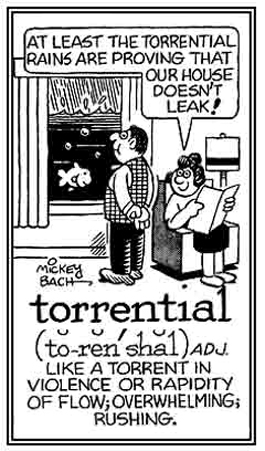 © ALL rights are reserved.
© ALL rights are reserved.
Go to this Word A Day Revisited Index
so you can see more of Mickey Bach's cartoons.
A reference to fast falling rain in great quantities. (1)
A reference to something that has many turns or bends going in different directions; pertaining to being devious or deceitful. (1)
Easily controlled or taught; compliant and docile. (2)
A reference to someone who exceeds normal comprehension and who conveys superior ideas or concepts. (1)
Enduring, existing, or lasting for a short time; neither permanent nor eternal. (2)
treadless
(adjective), more treadless, most treadless
1. Without touching the ground or without any patterns on the bottom of shoes, boots, or tires: It was obvious that Ned needed new shoes because they were completely treadless from years of use.
2. The parts of wheels or tires that make contact with roads or rails and which are without patterns of ridges, or grooves, and that are non-existent on tires: It is very dangerous to drive a car with treadless tires because it is much easier to slip or to slide out of control.
trenchant
(adjective), more trenchant, most trenchant
1. Descriptive of an opinion, a criticism, or an observation, which is very strong and disturbing: Bruce made a
trenchant analysis of the reasons for the losses in sales of his company.
As a reporter, Debora was known to have trenchant writing skills.
2. Etymology: from Old French
trenchier, "to cut, to be incisive."
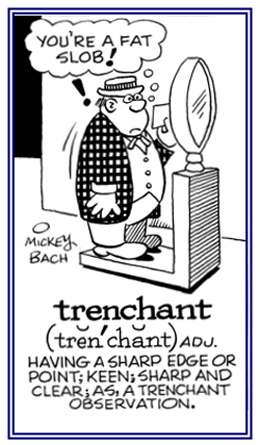 © ALL rights are reserved.
© ALL rights are reserved.
Go to this Word A Day Revisited Index
so you can see more of Mickey Bach's cartoons.
Relating to something that is worn out by constant use; common place and stale. (1)
truculent
(adjective), more truculent, most truculent
1. A reference to being savage, ferocious, malevolent, or threatening: The
truculent customer glared at the salesman when he told her how much the winter coat would cost.
2. Relating to being easily annoyed or angered and likely to argue: Marie's
truculent son wanted to finish watching a movie and so he was very upset when she told him it was time for him to turn off the TV and go to bed, NOW!
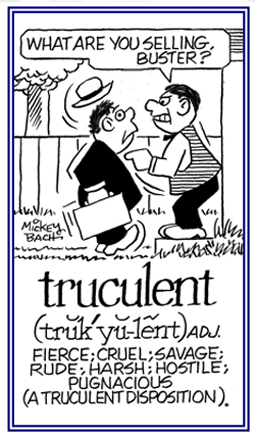 © ALL rights are reserved.
© ALL rights are reserved.
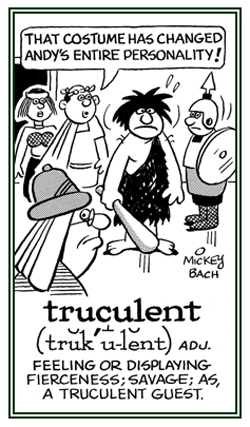 © ALL rights are reserved.
© ALL rights are reserved.
Go to this Word A Day Revisited Index
so you can see more of Mickey Bach's cartoons.
Relating to pugnacious, hostile, cruel, savage, or harsh behavior. (2)
truculently
(adverb), more truculently, most truculently
Descriptive of being ferociously aggressive or savagely defiant: The bear truculently attacked the hunting dog when it came near the bear's cub.
trumped-up
(adjective), more trumped-up, most trumped-up
That which is deliberately done or created to make an innocent person appear to be guilty of a crime: Sam was arrested on
trumped-up charges that included
trumped-up evidence.
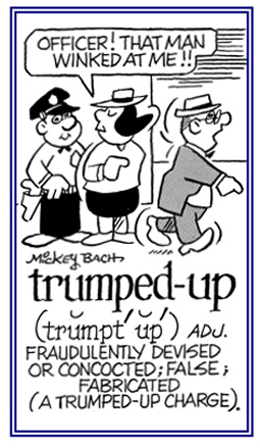 © ALL rights are reserved.
© ALL rights are reserved.
Go to this Word A Day Revisited Index
so you can see more of Mickey Bach's cartoons.
Noisy and unrestrained in a way that shows excitement or great happiness; chaotic; especially, as a result of a popular outcry involving disorderly, noisy, and emotional reactions. (2)
Conveying an idea that someone or something is present, or seems to be existing, everywhere at the same time. (2)
uddered
(adjective), more uddered, most uddered
A reference to the mammary glands of female animals that produce milk for their offspring: The uddered swine were separated from the male swine and placed in a protected shelter.
unalloyed
(adjective), more unalloyed, most unalloyed
Pertaining to something that is not mixed with anything else: Mary had
unalloyed pleasure when her daughter gave birth to her first baby.
There are some unalloyed metals that are not blended nor mingled with others; for example, copper.
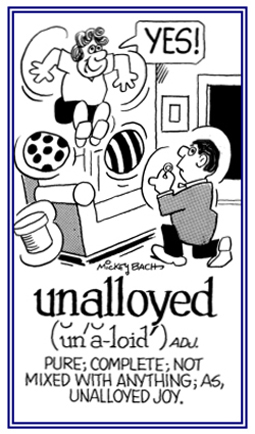 © ALL rights are reserved.
© ALL rights are reserved.
Go to this Word A Day Revisited Index
so you can see more of Mickey Bach's cartoons.
uncanny
(adjective), more uncanny, most uncanny
A reference to that which is strange and difficult to explain: Cleo had an
uncanny or a mysterious feeling that she was seeing into the future.
Uncanny powers of observation and solutions were attributed to Sherlock Holmes.
There was an uncanny silence that pervaded the old mansion when James and Isabel went to visit the place.
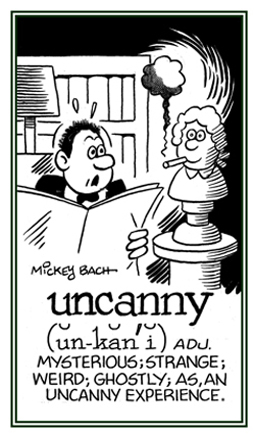 © ALL rights are reserved.
© ALL rights are reserved.
Go to this Word A Day Revisited Index
so you can see more of Mickey Bach's cartoons.
uncouth
(adjective), more uncouth, most uncouth
1. Descriptive of impolite or very rude behavior: When Clement started to yell at his host at the party, everyone thought he was certainly a very
uncouth and uncivilized person.
2. Etymology: from Old English
uncup, "unknown"; from
cunnan, "to know"; an earlier form of "can".
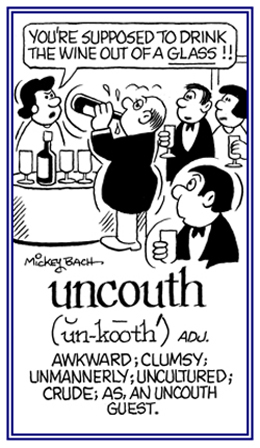 © ALL rights are reserved.
© ALL rights are reserved.
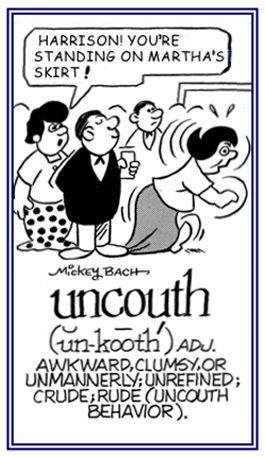 © ALL rights are reserved.
© ALL rights are reserved.
Go to this Word A Day Revisited Index
so you can see more of Mickey Bach's cartoons.
Descriptive of a person who is determined to accomplish his or her objective regardless of failures or difficulties. (1)
Characteristic of something that is more than is necessary or reasonable: Sometimes there is more
undue work that needs to be done on the project than is possible in the time that is allowed.
The news on TV has been showing some undue force being used by police to disperse demonstrators in some cities; however, it is more often a result of more undue violence and destruction of businesses, etc. or of some rebellious members who are out of control.
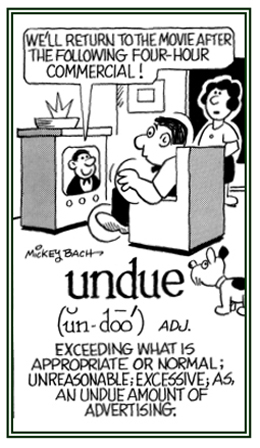 © ALL rights are reserved.
© ALL rights are reserved.
Go to this Word A Day Revisited Index
so you can see more of Mickey Bach's cartoons.
unfettered
(adjective), more unfettered, most unfettered
1. Uncontrolled or unrestricted: The lawyer requested unfettered access to the accountant’s records.
2. Spontaneous and natural: As a comedian, Madeline had an unfettered laugh which delighted her audiences whenever she was performing.
unkempt
(adjective), more unkempt, most unkempt
1. Characteristic of someone or something with an untidy, messy, sloppy, or disordered appearance: Jane's mother reminded her to clean up her
unkempt room because the guests would be arriving that afternoon.
2. Disordered and uncombed hair: Susan's tresses were very
unkempt and in disarray because she hadn't brushed it after coming back from her windy walk.
3. Etymology: from
un-, "not: +
kempt, "well combed, neat."
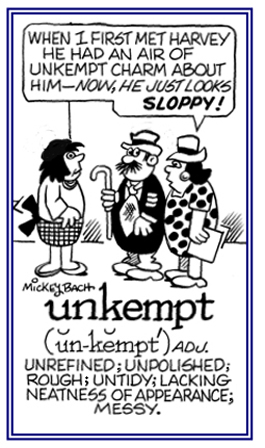 © ALL rights are reserved.
© ALL rights are reserved.
Go to this Word A Day Revisited Index
so you can see more of Mickey Bach's cartoons.
unneighborly
(adjective), more unneighborly, most unneighborly
Being unfriendly or not showing the attitudes that are expected of those who live close to each other: Estella thought it was very unneighborly of the man who lived next door to drive his truck over her new lawn and flower bed.
untoward
(adjective), more untoward, most untoward
1. Relating to the cause of misfortunes or disadvantages: Several
untoward earthquakes have caused severe disasters for the country of Nepal.
2. Conveying inappropriate or bad behavior: Jake's
untoward rudeness with the clerk at the store resulted in his being escorted out.
3. A reference to that which is beyond the expected or what is considered to be out of the ordinary: Jeremy had an
untoward piece of luck when he was able to buy gas for his car at a low price just before it was increased to a higher rate.
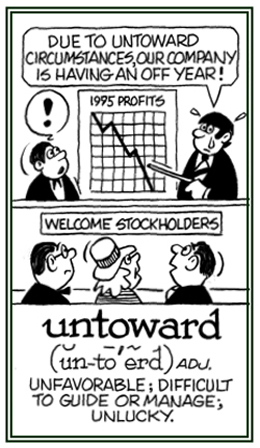 © ALL rights are reserved.
© ALL rights are reserved.
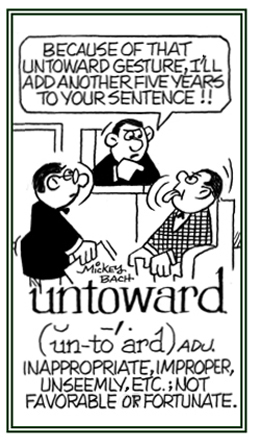 © ALL rights are reserved.
© ALL rights are reserved.
Go to this Word A Day Revisited Index
so you can see more of Mickey Bach's cartoons.
untrammeled
(adjective), more untrammeled, most untrammeled
1. A reference to something which is not limited or restricted but which is unrestrained, unhampered and refers to freedom in actions or expressions: Wild animals in zoos are not able to live an
untrammeled way of life because they exist in closed areas and are not at liberty to roam without hindrances.
2. Etymology: from Latin
un-, "not" +
tri-, "three" +
macula, "a mesh."
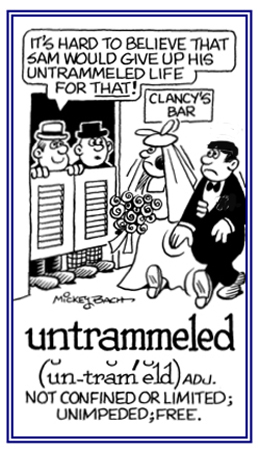 © ALL rights are reserved.
© ALL rights are reserved.
Go to this Word A Day Revisited Index
so you can see more of Mickey Bach's cartoons.
unwitting
(adjective), more unwitting, most unwitting
1. Conveying a lack of knowledge or unawareness of what is happening in a particular situation: Ken was an
unwitting person who unintentionally took the reserved parking space of a fellow employee of his company.
2. Etymology: from Old English
unwitende, "to become aware of, to learn".
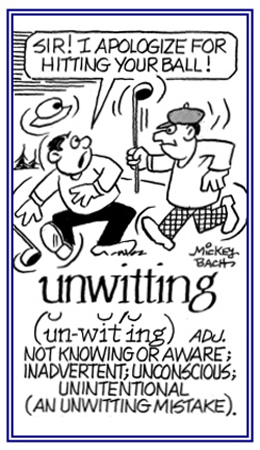 © ALL rights are reserved.
© ALL rights are reserved.
Go to this Word A Day Revisited Index
so you can see more of Mickey Bach's cartoons.
unwonted
(adjective), more unwonted, most unwonted
Used to indicate that something or someone is not normally expected to do something: No one ever thought Norton would be such an
unwonted contributor of so much money for the homeless people in his community.
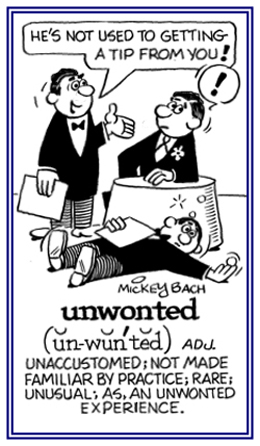 © ALL rights are reserved.
© ALL rights are reserved.
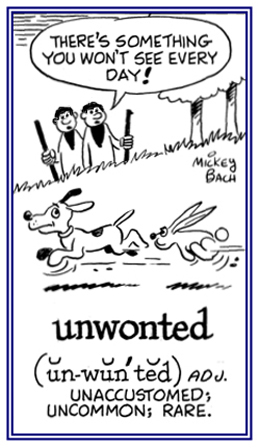 © ALL rights are reserved.
© ALL rights are reserved.
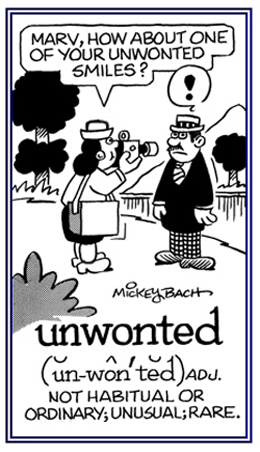 © ALL rights are reserved.
© ALL rights are reserved.
Go to this Word A Day Revisited Index
so you can see more of Mickey Bach's cartoons.
Resembling a bearlike physical form. (1)
Pertaining to bearlike behavior or attitude. (2)
Pertaining to charging illegal or exorbitant rates of interest for money which has been loaned to someone. (2)
Descriptive of a husband who is excessively devoted to his wife and who is obedient to all of her desires or wishes. (3)
Pertaining to being unable to make up one's mind or relating to a failure in deciding what should be done. (2)
Relating to going or wandering from place to place; mentally thinking about this and that with no fixed purpose or objective. (1)
A reference to a person who shows an excessive amount of pride in his or her abilities or achievements. (1)
A reference to something that is based on fact or truth and can be reasonably justified or defended. (1)
Pertaining to showing courage, fearlessness, bravery, and boldness during times of danger or risky situations. (1)
Not lively or interesting; but being dull, and boring. (2)
Referring to someone or something which is lacking excitement, is lifeless, pointless, and wearisome. (1)
Referring to something that is without a material existence or permanence; relating to a fanciful, a ridiculous, or an implausible or unrealistic situation. (1)
Relating to something that changes suddenly and unpredictably without warning. (1)
Describing a negative reaction to something which uses great force and anger or is strongly emotional, intense, and passionate. (3)
A reference to, employed in, or used for hunting to achieve one's desire. (2)
Descriptive of being competent in doing a variety of things. (2)
Descriptive of something that causes or is likely to cause dizziness and disorientation; especially, because of great heights. (3)
Referring to an investigation that has been completed: Only vetted nominees are allowed into government committee hearings.
vetting
(adjective), more vetting, most vetting
A descriptive term for examining or analyzing someone's status: The government has a
vetting policy to determine if foreigners are qualified to enter the U.S.
President Donald Trump signed an executive order that establishes "new vetting measures to keep radical Islamic terrorists out of the United States of America," the President said.
Jim's club only accepts members after a vetting process has been completed; including a background investigation and a criminal history check.
Descriptive of someone who is being annoying, troublesome, or harassing another person. (2)
Throbbing with energy and vigor; a lively condition. (1)
A reference to being very wary and watchful in order to guard against danger, difficulties, or mistakes. (1)
Referring to the desire for revenge or wanting to hurt someone. (4)
Referring to something or someone who turns green or greenish in color because of illness; such as, sea sickness. (1)
Pertaining to faultfinding and severe criticism; including, the use of insulting and offensive language. (1)
Descriptive of uproarious and rowdy yelling and disagreement as to what is going on. (3)
Descriptive of words or phrases that are popular for a period of time: There are many vogue words that are being created in our times; especially, in technology and in e-mail messages.
Descriptive of eating or consuming great amounts of food. (3)
Relating to being accessible to physical or emotional harm; or to criticism and judgement by other people. (2)
waggish
(adjective), more waggish, most waggish
Relating to being humorous in a playful, mischievous, or facetious way: Monroe gave a
waggish response when he was told to get ready to go shopping for some meat by asking: "Who are we going to
meet at the market?"
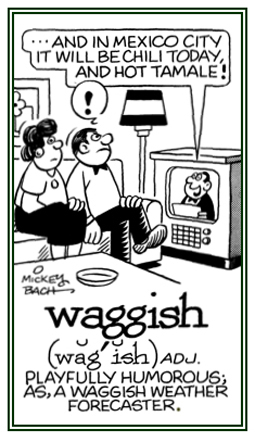 © ALL rights are reserved.
© ALL rights are reserved.
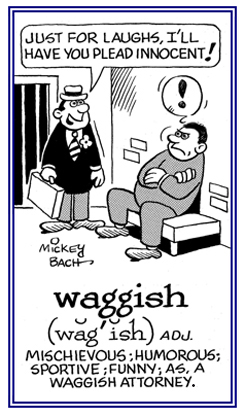 © ALL rights are reserved.
© ALL rights are reserved.
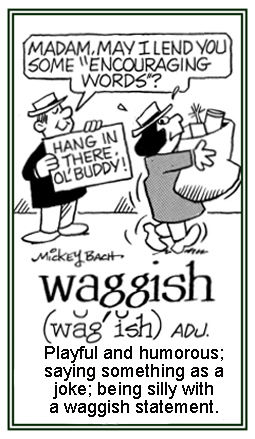 © ALL rights are reserved.
© ALL rights are reserved.
Go to this Word A Day Revisited Index
so you can see more of Mickey Bach's cartoons.
Being humorous in a playful, mischievous, humorous, or facetious way. (3)
1. That which is made of or covered with a hard petroleum-based substance: As an artist, Rosetta specialized in making waxen figurines.
2. Referring to a pale or smooth surface: Harriet's waxen face contrasted with her dark eyes and eyebrows.
3. Weak, pliable, or impressionable: The politician had the feeling that he was speaking to a crowd of waxen minds.
weathered
(adjective), more weathered, most weathered
Descriptive of a person or things that are stained or which are worn out by exposure to weather: The farmer had a tanned and a weathered face as a result of working so often out in the sun.
whimsical
(adjective), more whimsical, most whimsical
1. Relating to something that is full of odd notions or fancies that are humorous and laughable: Janet wrote a
whimsical article in her newspaper about how some students expected to be millionaires when they graduated from college and had jobs.
2. Descriptive of a person who has peculiar or strange ideas that are not serious: James is a
whimsical character who is not considered to be very successful in business.
3. Etymology: possibly based on whim-wham, "a trifle".
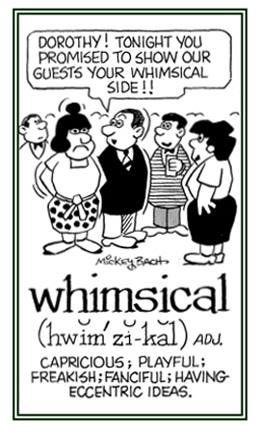 © ALL rights are reserved.
© ALL rights are reserved.
Go to this Word A Day Revisited Index
so you can see more of Mickey Bach's cartoons.
willy-nilly
(adverb), more willy-nilly, most willy-nilly
1. Characteristic of something that takes place whether a person likes it or not: Citizens are being forced to accept
willy-nilly increases in taxes by the lawmakers.
2. Referring to being done haphazardly, without planning or direction: Too many politicians are expanding their
willy-nilly spending programs.
A willy-nilly unplanned decision was made to change the financial rules for paying bonuses.
3. Etymology: a modified form of an older phrase that is variously expressed as
will I, nill I or
will ye, nill ye.
Will is used in its sense of "wanting to do something, to wish or to desire that something should happen"; while
nill is an old and outdated term for "to want not to do something, to refuse or reject some course of action" or they are combined to mean, "I am willing, I am unwilling".
The most recent meaning is "starting a project without a reason or planning" or something that is done in a "disorganized way".
A Latin equivalent is nolens volens, “unwilling, willing”.
willy-nilly
(adjective), more willy-nilly, most willy-nilly
1. Referring to something that is taking place whether it is desired or wanted or not: Mark had a
willy-nilly attitude regarding the new assignment.
The willy-nilly speech by the politician resulted in a loss of support by many voters.
2. A haphazard or disorganized description of a situation: The city officials passed another
willy-nilly law that would increase local taxes.
The two students were told by the housing manager to clean up the willy-nilly condition of their dorm room of scattered books, unmade beds, piles of clothing, etc. or they would have to find another place to live.
wily
(adjective); wilier, more wily; wiliest, most wily
1. A reference to a person who uses subtle tricks to deceive others by being crafty, cunning, or sly: When George was on vacation, his house was broken into by a
wily thief.
2. Descriptive of someone who is skilled at gaining an advantage over others; especially, in a deceitful way: Shirley was told that the jewelry salesman was a
wily person and not to be trusted; which was a good thing that she was warned because he was planning to sell her a fake diamond necklace.
3. Etymology: from Old English,
wil, "stratagem, trick, sly action."
 © ALL rights are reserved.
© ALL rights are reserved.
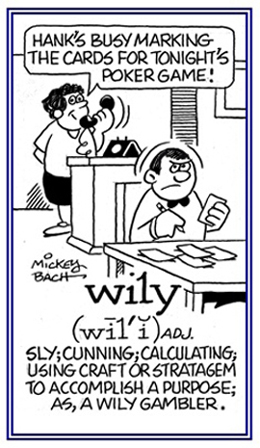 © ALL rights are reserved.
© ALL rights are reserved.
Go to this Word A Day Revisited Index
so you can see more of Mickey Bach's cartoons.
winsome
(adjective), more winsome, most winsome
1. Charming, especially because of a naive, innocent quality: The pale blue dress that Lorna's friend wore was appropriate for her winsome personality.
2. Charming, often in a childlike or naive way; that is, having or showing an excessively simple and trusting view of the world and human nature, often as a result of being very young and inexperienced: The students joined in a winsome pose for the photographer at their summer picnic.
3. Etymology: winsome people easily "win" friends, so it should not be surprising that "winsome" and "win" have a common root.
winsomely
(adverb), more winsomely, most winsomely
Cheerful, pleasant, and appealing: Mollie was reading a winsomely written story.
wistful
(adjective), more wistful, most wistful
1. Deep in sad thoughts; especially, thoughts of something yearned for or lost, or expressing this sad yearning: Shirley had
wistful memories when she thought about the times when she was growing up on her father's farm.
2. Full of wishful yearning; pensively sad; melancholy: The
wistful music filled Mike with sadness.
3. Etymology: the meaning of "longing, yearning" existed in 1613-1616; formed from obsolete English
wist(ly), "intently"; which was of uncertain origin before 1500.
The meaning of "expectantly" or "yearningly eager, longing" was first recorded in 1714.
wistfully
(adverb), more wistfully, most wistfully
Having or showing thoughts and feelings of yearning for something that a person wants to have or to do: Ina wistfully looked at the house where she once lived with her beloved family.
witless
(adjective), more witless, most witless
A reference to a foolish or an inappropriate remark: When Pete was asked what he thought about the political candidates, he responded with a witless comment.
witlessly
(adverb), more witlessly, most witlessly
A reference to a lack of intelligence or common sense: Hank stood there witlessly gaping with his mouth wide open like a fool when the clerk told him that he couldn't be served because it was time for the store to close.
worrisome
(WUHR ee suhm) (adjective), more worrisome, most worrisome
1. Descriptive of someone or something that causes distress; or which is aggravating or worrying: According to Jean, her boy is so worrisome that he'll be the death of her if she is not careful.
2. Lacking in assurance or confidence; showing anxiety: Uncle Al is so worrisome that he never seems to be calm or without stress about most things.
wrought
(adjective), more wrought, most wrought
1. A reference to that which has been crafted, formed, or worked into shape: The author was credited with having published carefully
wrought essays.
2. Relating to efforts to accomplish an objective with serious planning or procedures: Despite all of the arrangements for traveling to Canada during the summer, Jason's carefully
wrought plans had to be cancelled because he lost his job and could no longer afford the costs of the trip.
3. Descriptive of something that has been shaped by hammering with tools; primarily, metals or metal work: While Mona was traveling in Europe, she purchased a delicately hand-made
wrought silver tray.
Ted was a craftsman who made some finely wrought woodwork for an art exhibition.
4. Etymology: from Middle English,
werken, "work"; an archaic past tense and past participle of the verb "to work"; thus,
wrought iron is iron that has been
worked, forged, or welded into various shapes or forms.
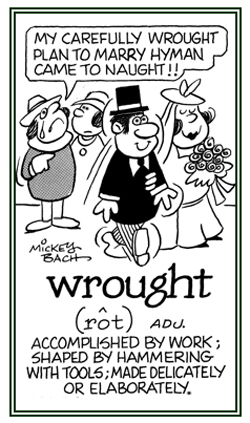 © ALL rights are reserved.
© ALL rights are reserved.
Go to this Word A Day Revisited Index
so you can see more of Mickey Bach's cartoons.
A reference to that which has been crafted, formed, or worked into shape; pertaining to the accomplishment of an objective with careful planning or procedures. (1)
wry
(adjective), wrier or wryer, more wry; wriest or wryest, most wry
1. Referring to a twisted expression of disgust, disappointment, or annoyance:
Wry humor and wit both describe a sense of humor that is a little twisted from what is normal.
A wry expression or wry humor shows that someone feels a situation is bad, but that he or she may also think it is slightly amusing.
2. Etymology: from Old English
wrigian, "to go, to turn, to twist, to bend."
 © ALL rights are reserved.
© ALL rights are reserved.
Go to this Word A Day Revisited Index
so you can see more of Mickey Bach's cartoons.
Descriptive of destruction that is caused by electronic sources, both natural and man-made: The thunderstorm resulted in several cases of zapped trees and zapped electrical power lines.
Characteristic of having a situation in which there is veering back and forth to the right and to the left: When some animals are being chased by a predator, they often take a zigzag procedure in an effort to escape being caught.
zigzag
(adverb), more zigzag, most zigzag
A reference to moving back and forth from left to right: The taxi driver must often drive zigzag across the city to deliver his customers.
Descriptive of the form of winding, deviating, or twisting and turning: Judy used the narrow
zigzag stitch on her sewing machine when finishing the hem.
In order to avoid being caught by the fox, the rabbit ran in a zigzag course across the field.
zigzag
(adverb); more zigzag, most zigzag
Referring to how something or someone moves or switches to the left and to the right in an alternate manner: She drove her new car zigzag through the city, turning here and there and enjoying the sights of all the villas and new houses.
zombiesque
(adjective), more zombiesque, most zombiesque
1. Like or resembling a soulless corpse said to have been revived by witchcraft; formerly, the name of a snake-deity in voodoo cults of or deriving from West Africa and Haiti: Zombiesque humanoids are considered to be reanimated dead bodies and so they are then thought to belong to the living dead.
2. Characterized by being dull, apathetic, or a slow-witted person: Some people are labeled as being zombiesque because they are so lifeless and unfeeling.
